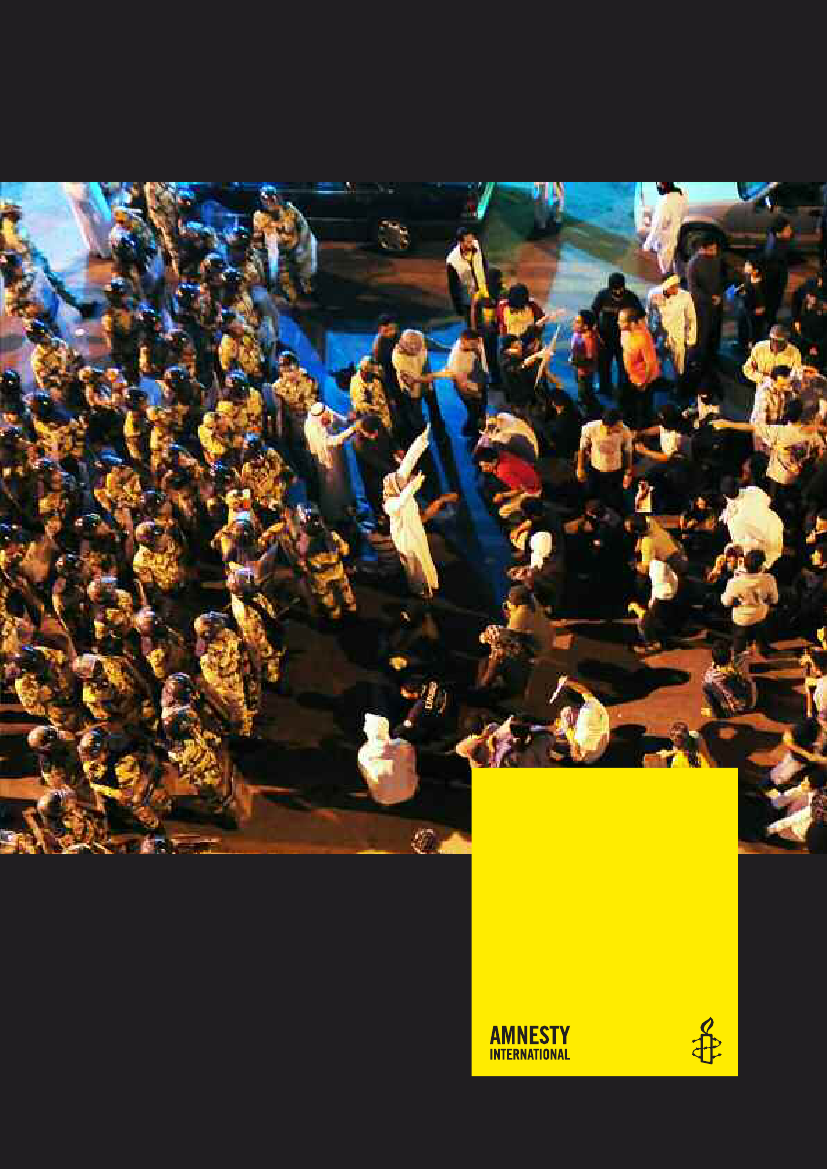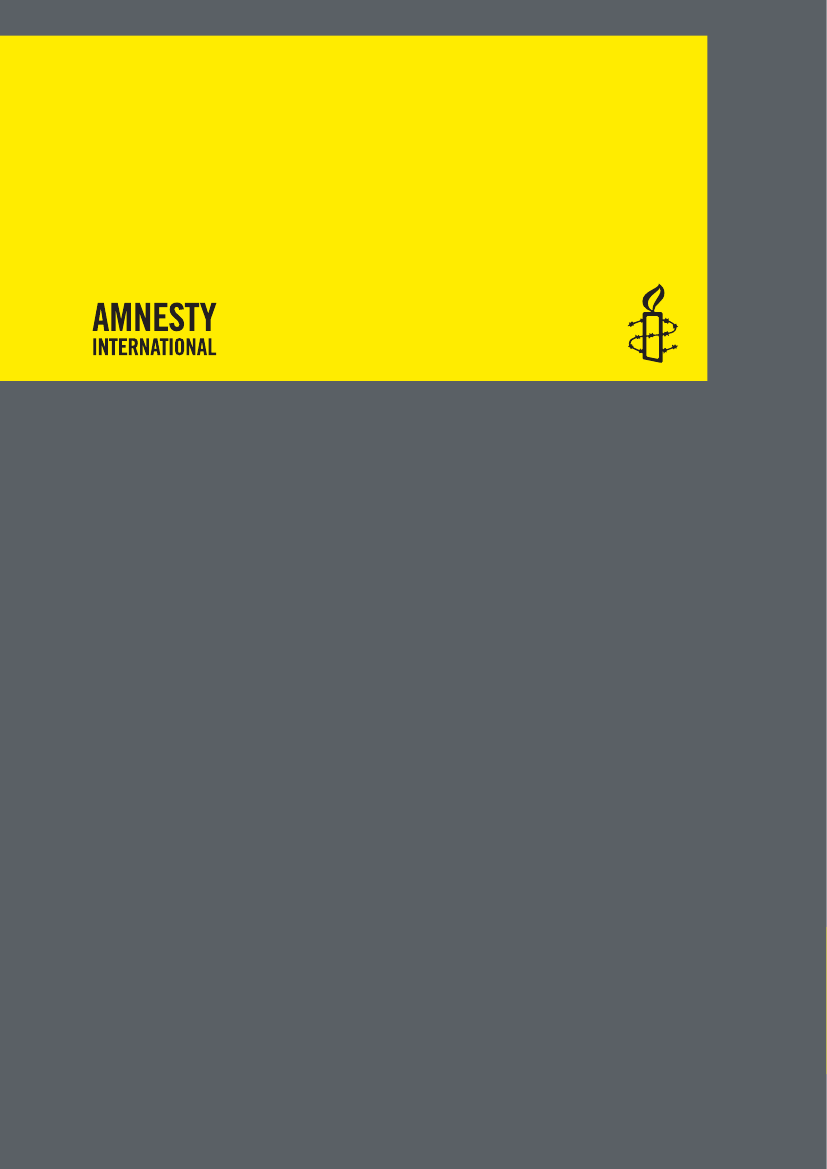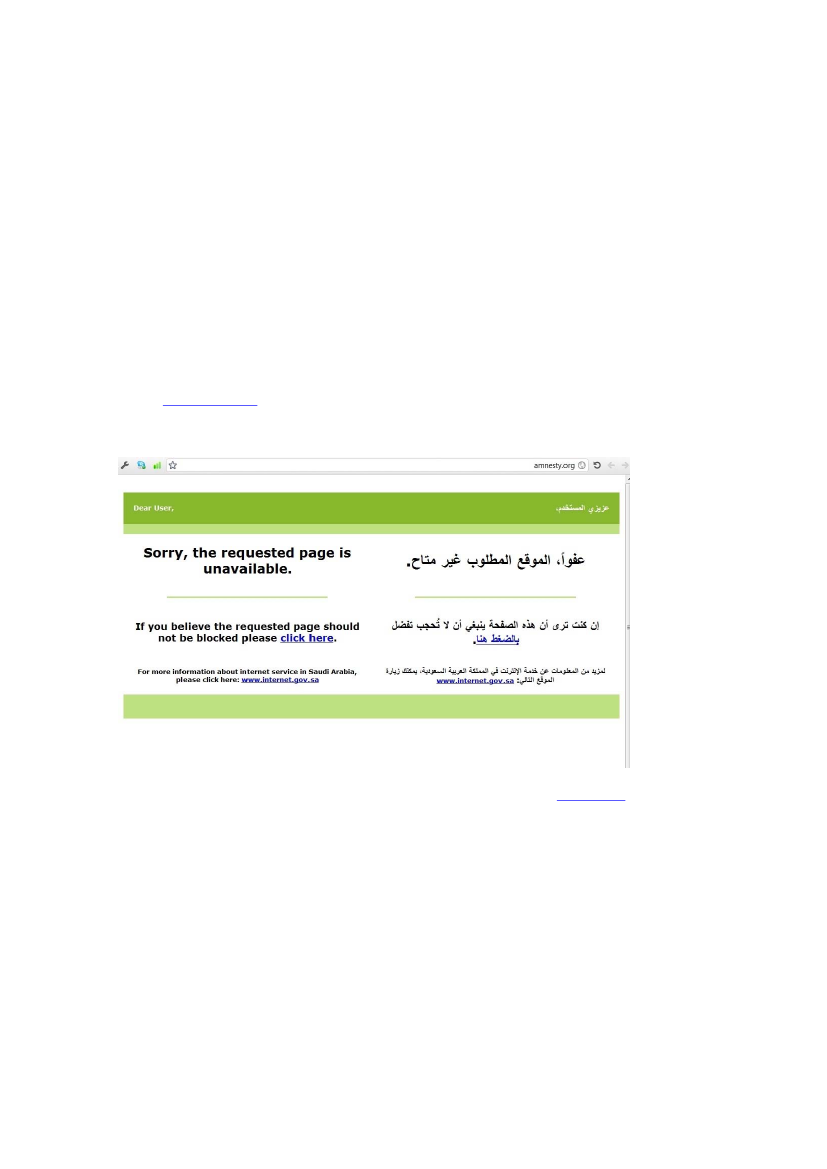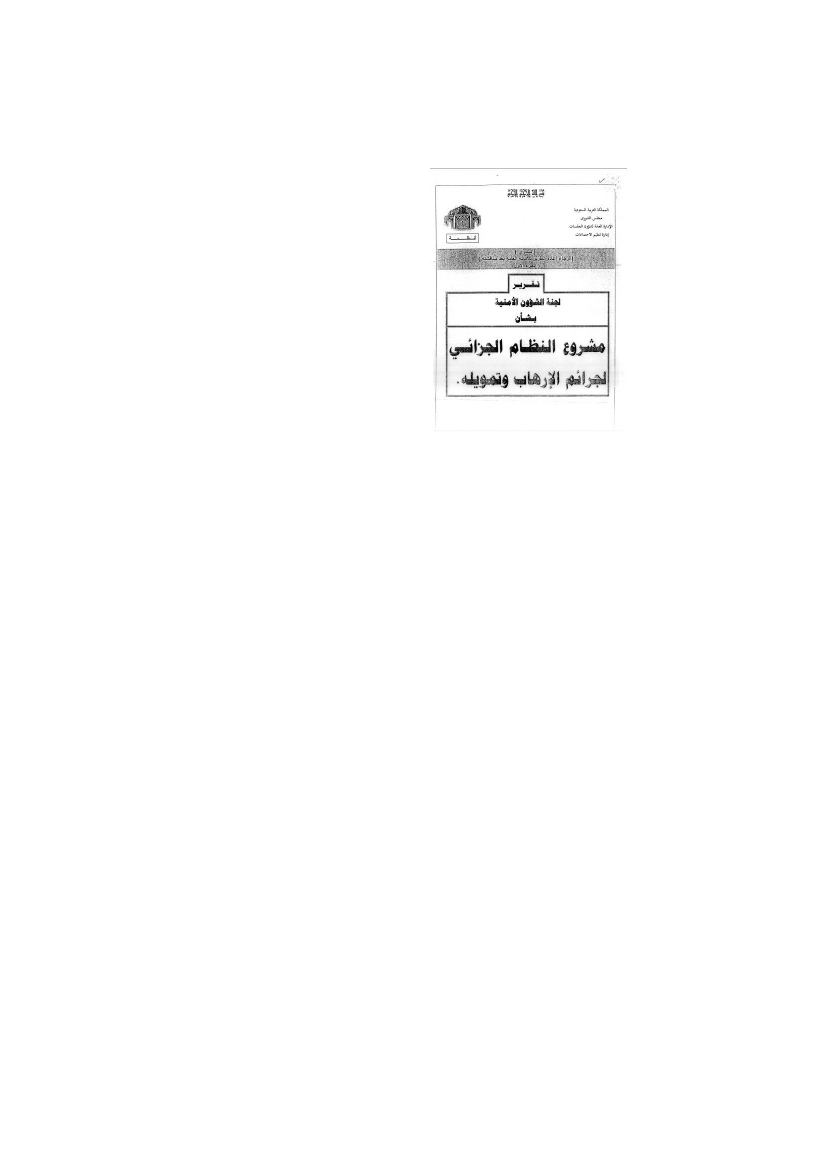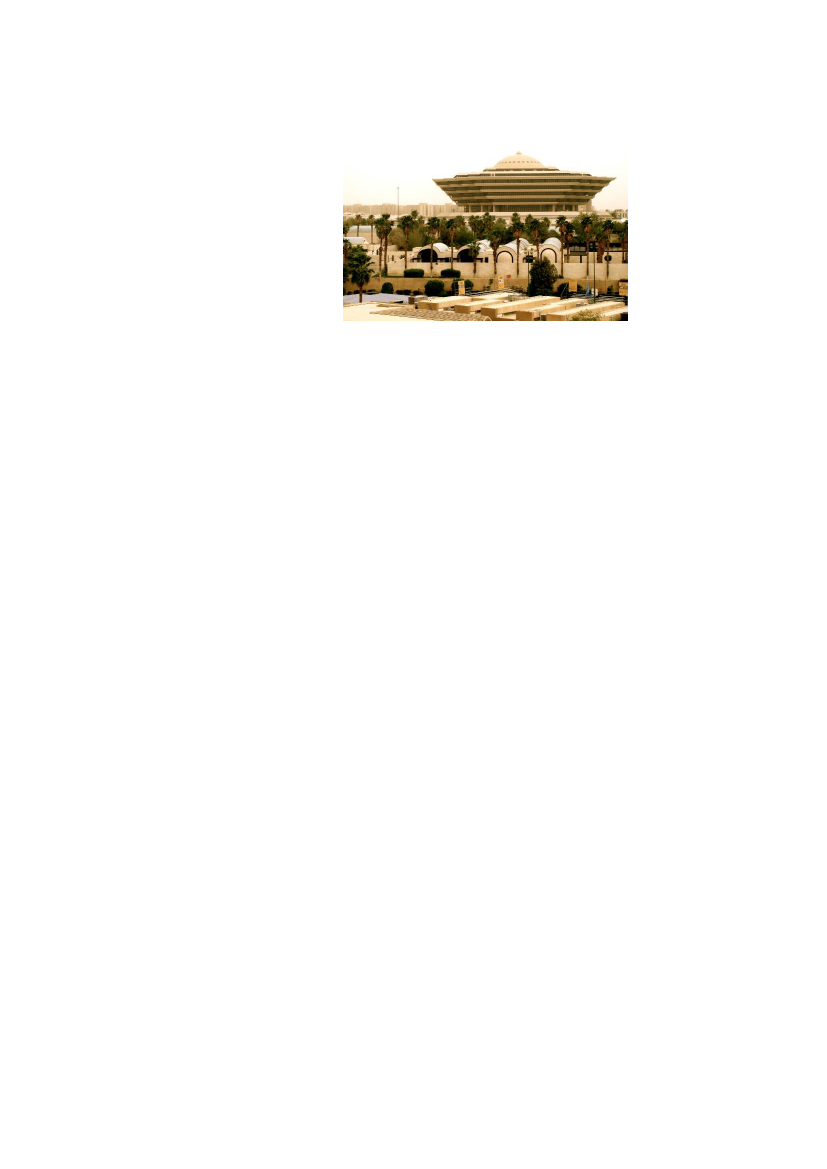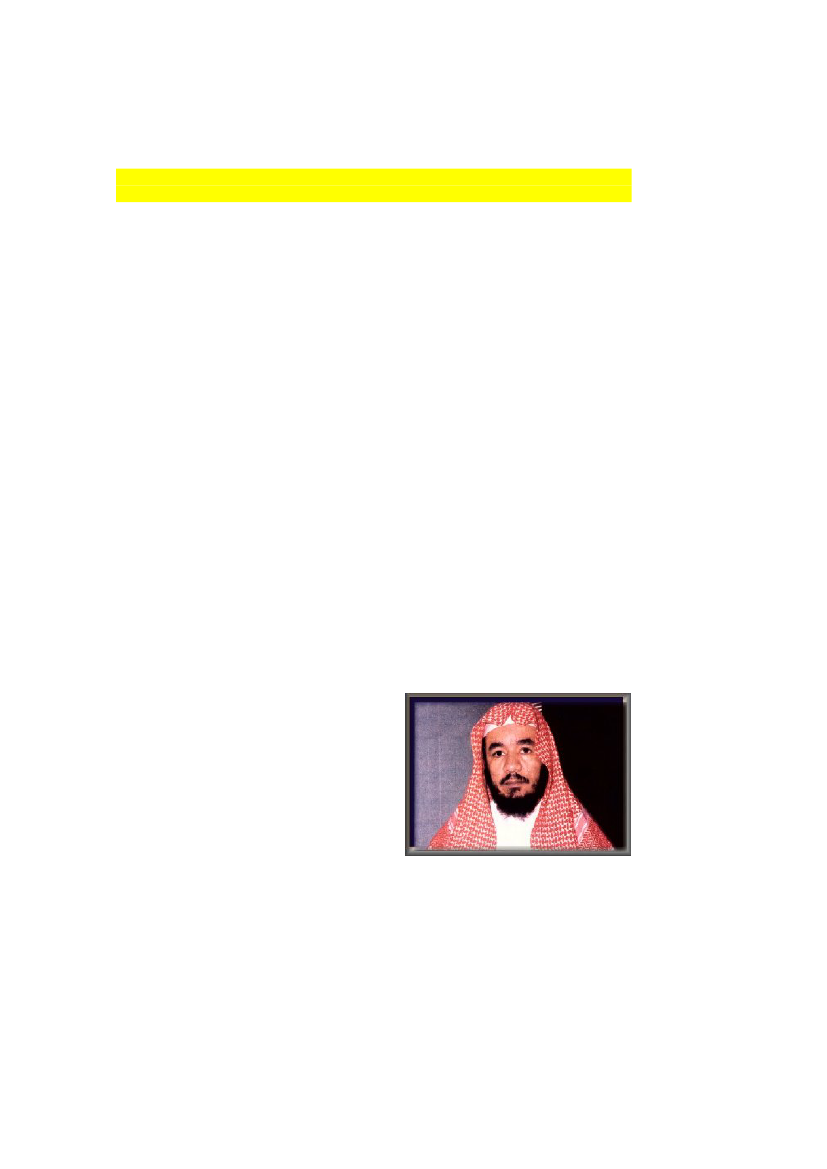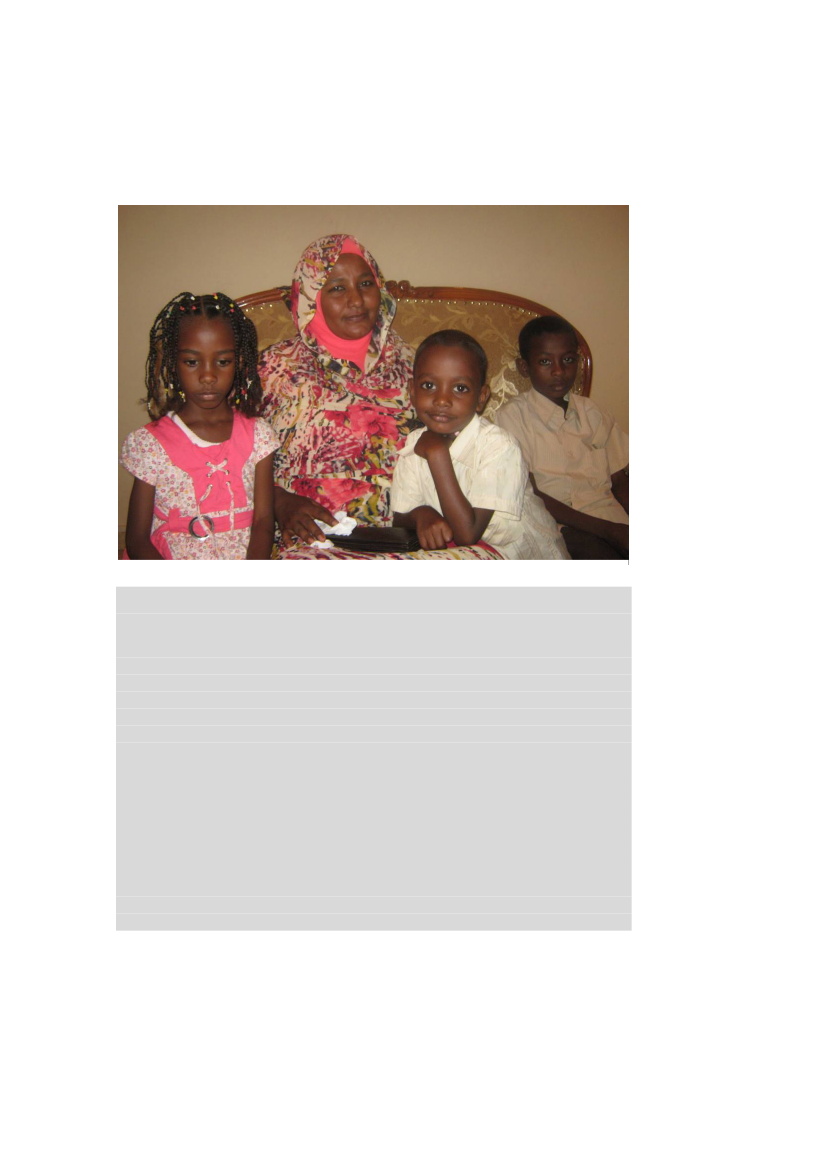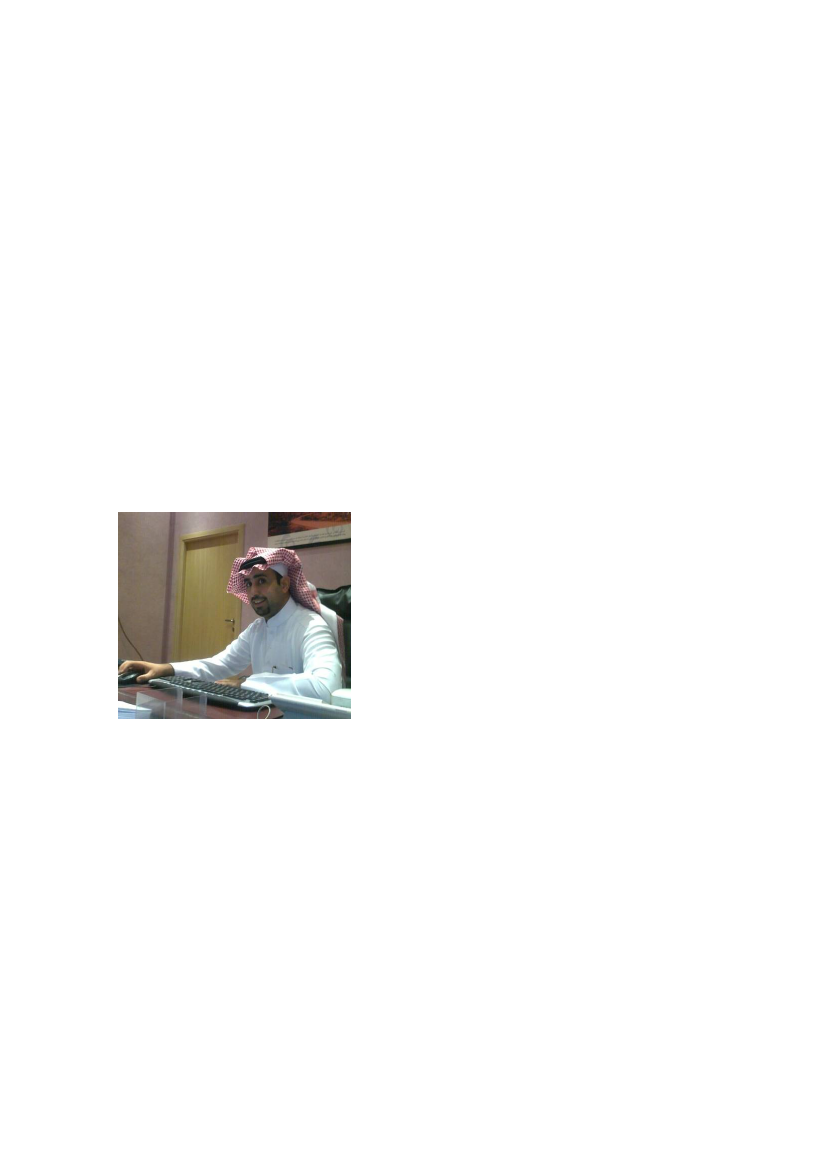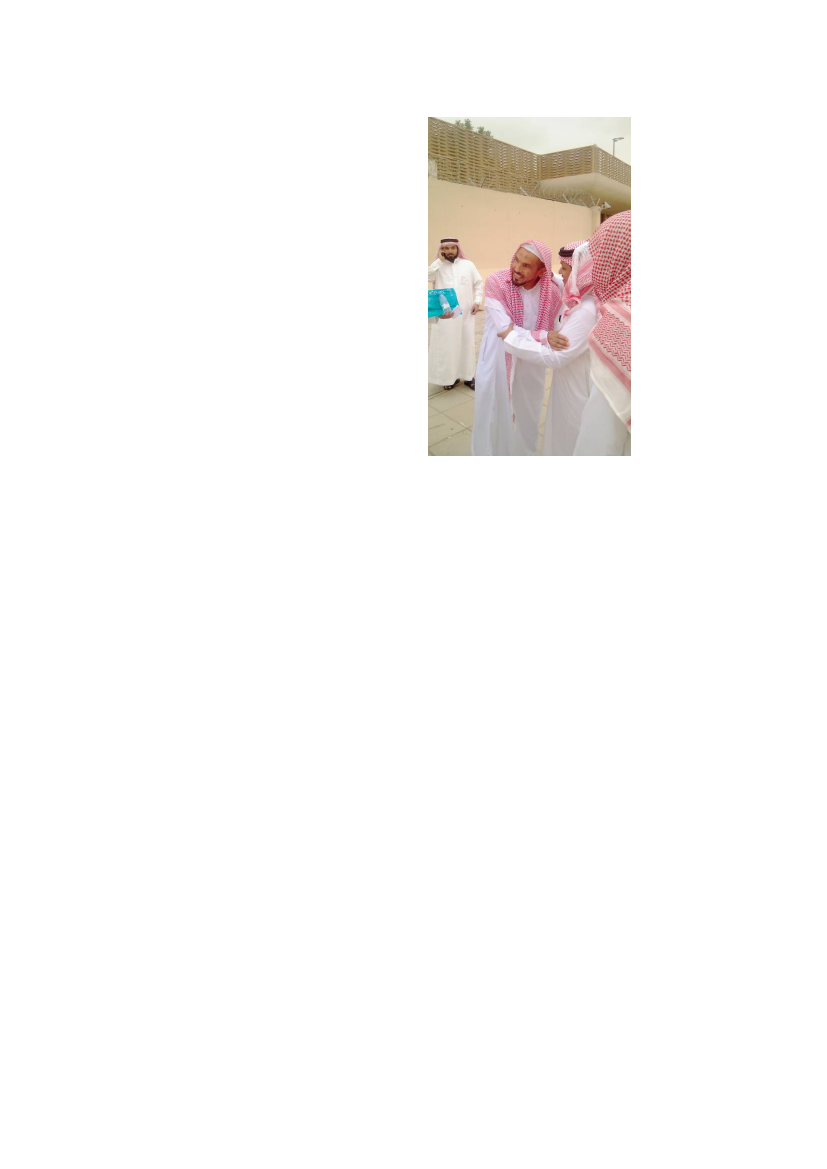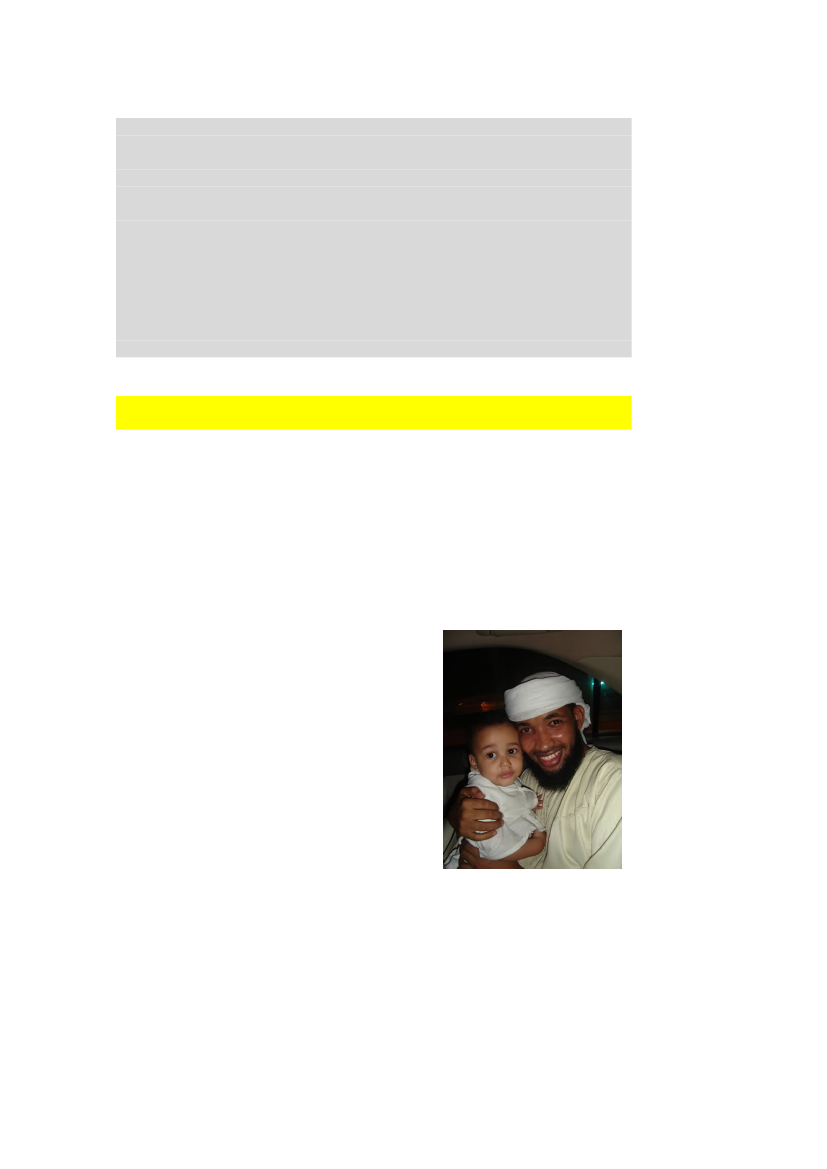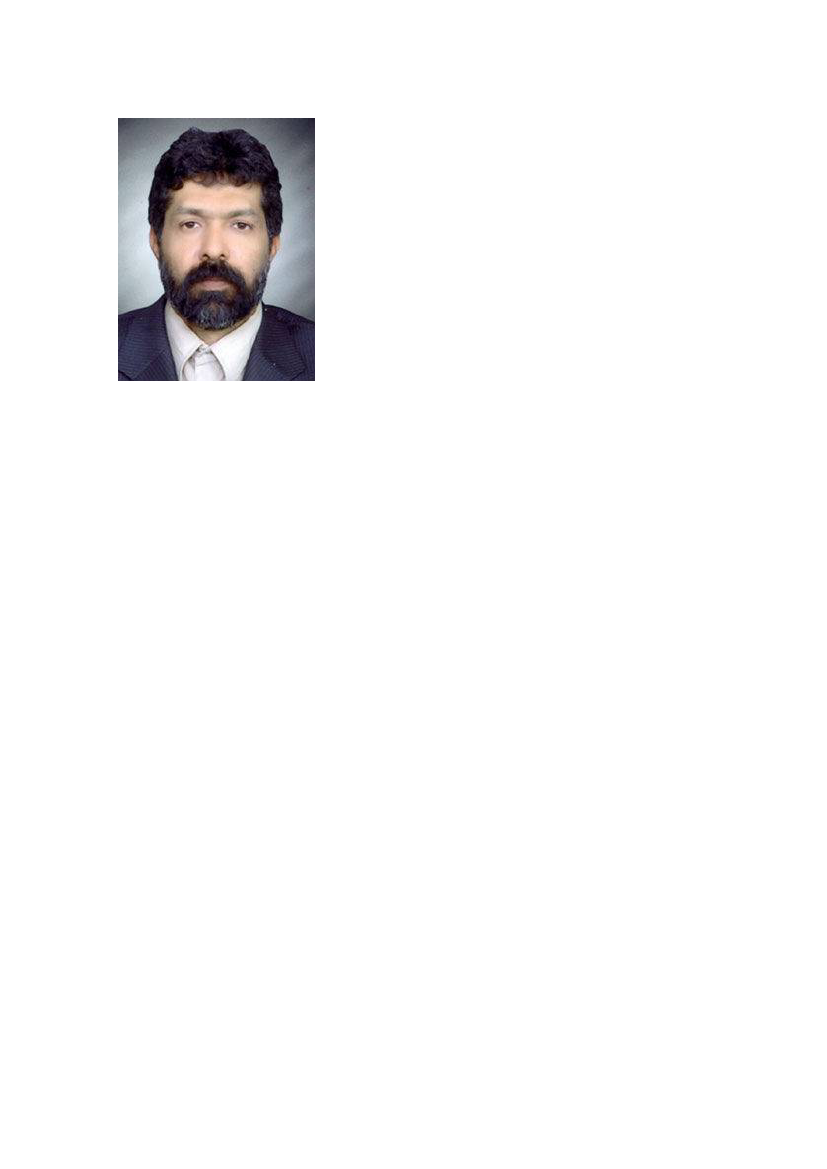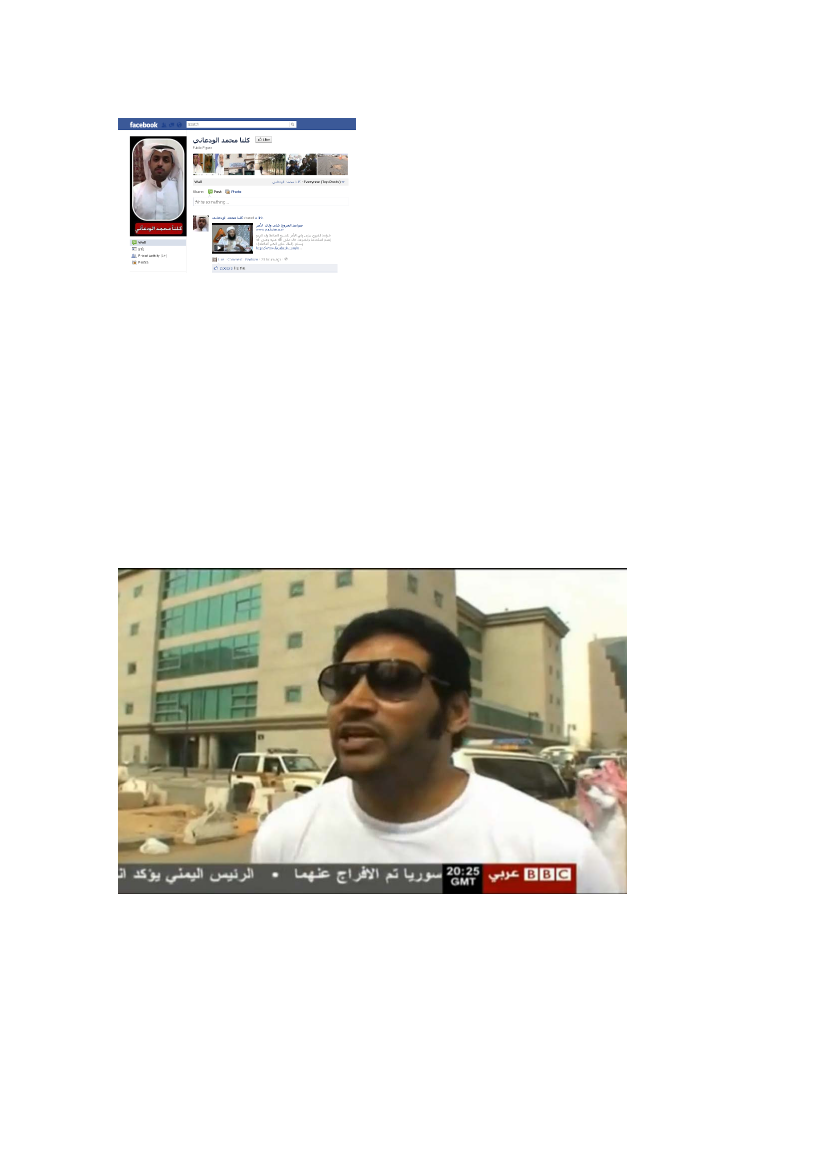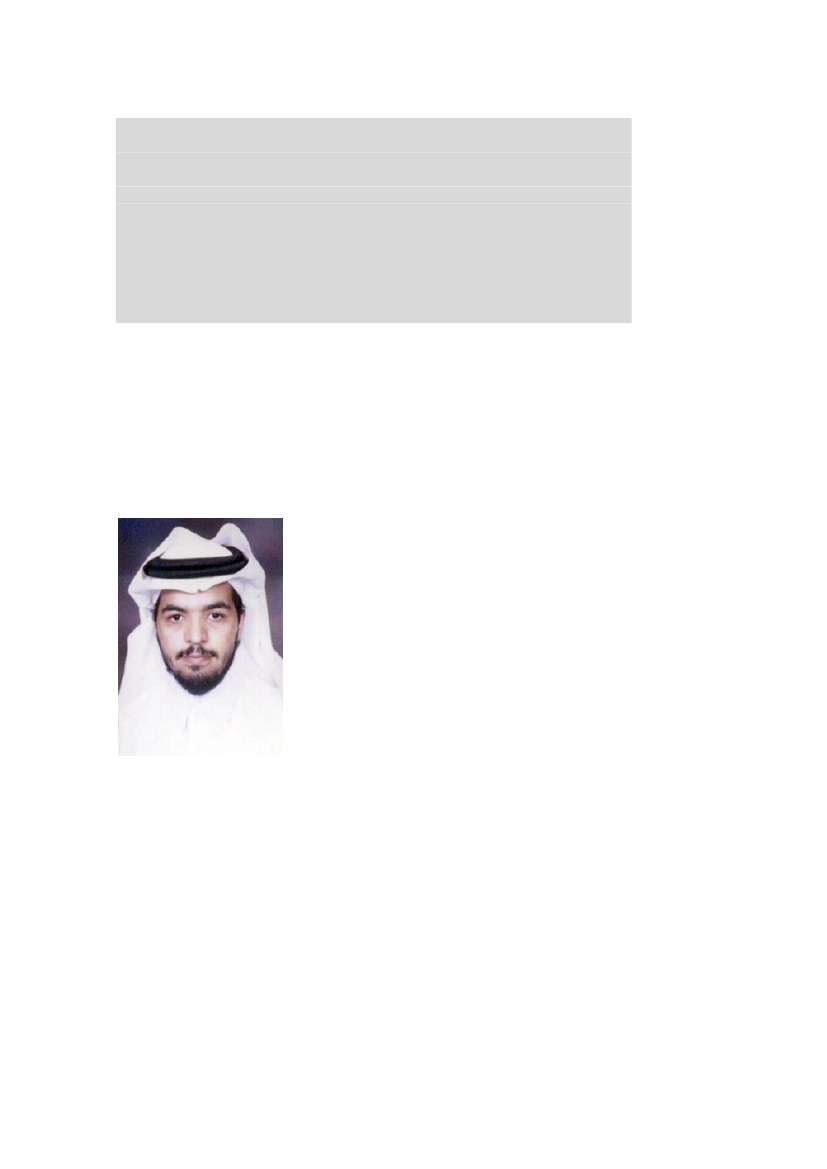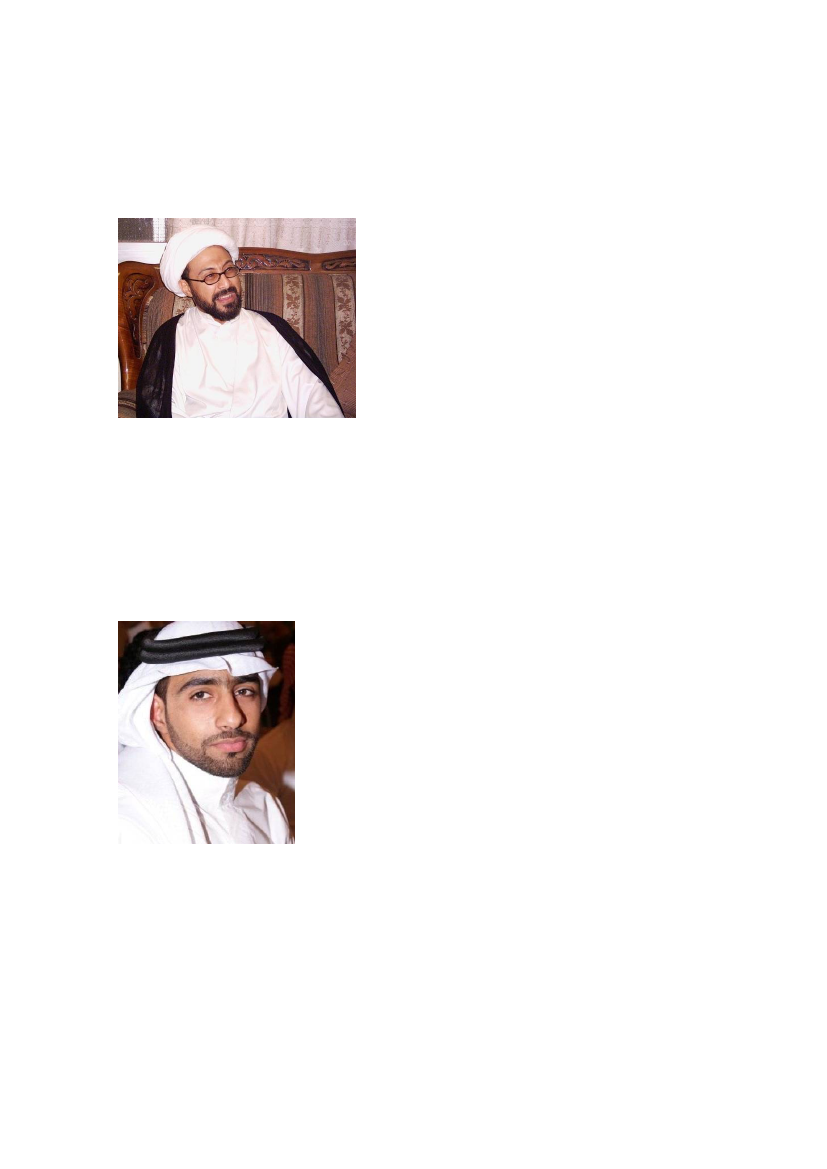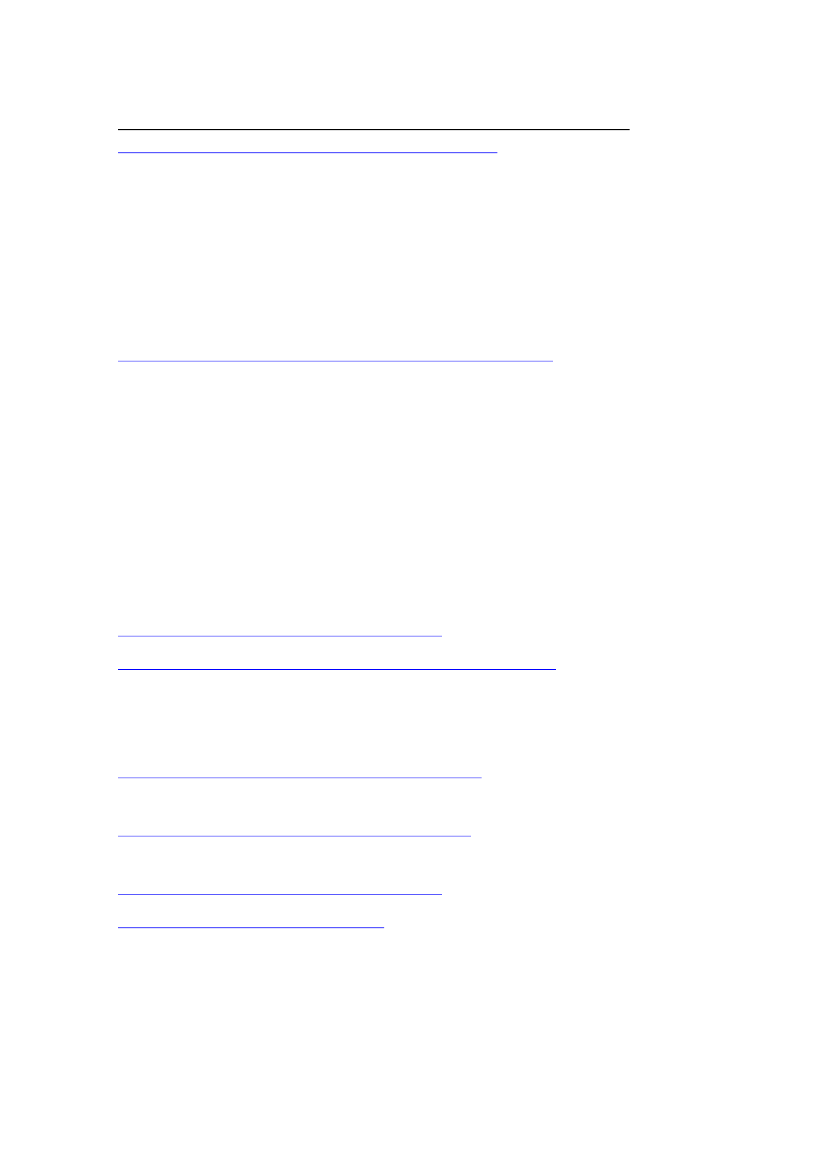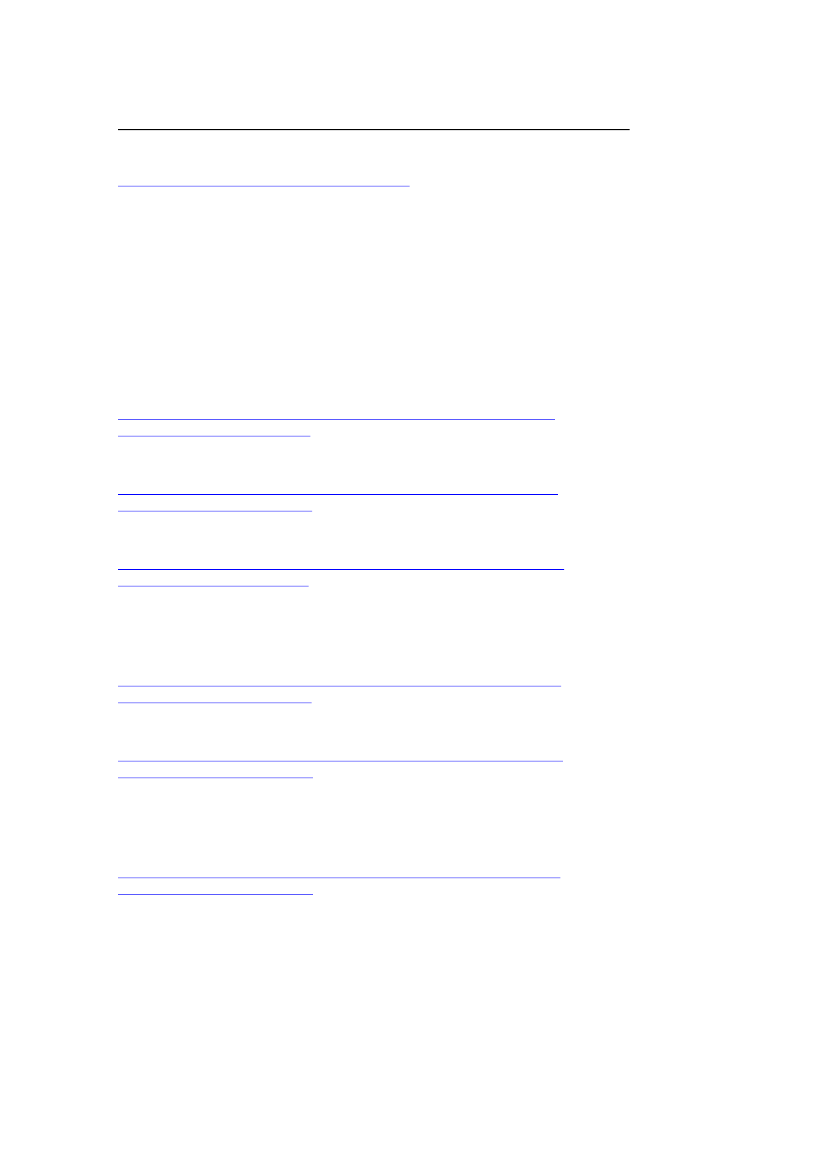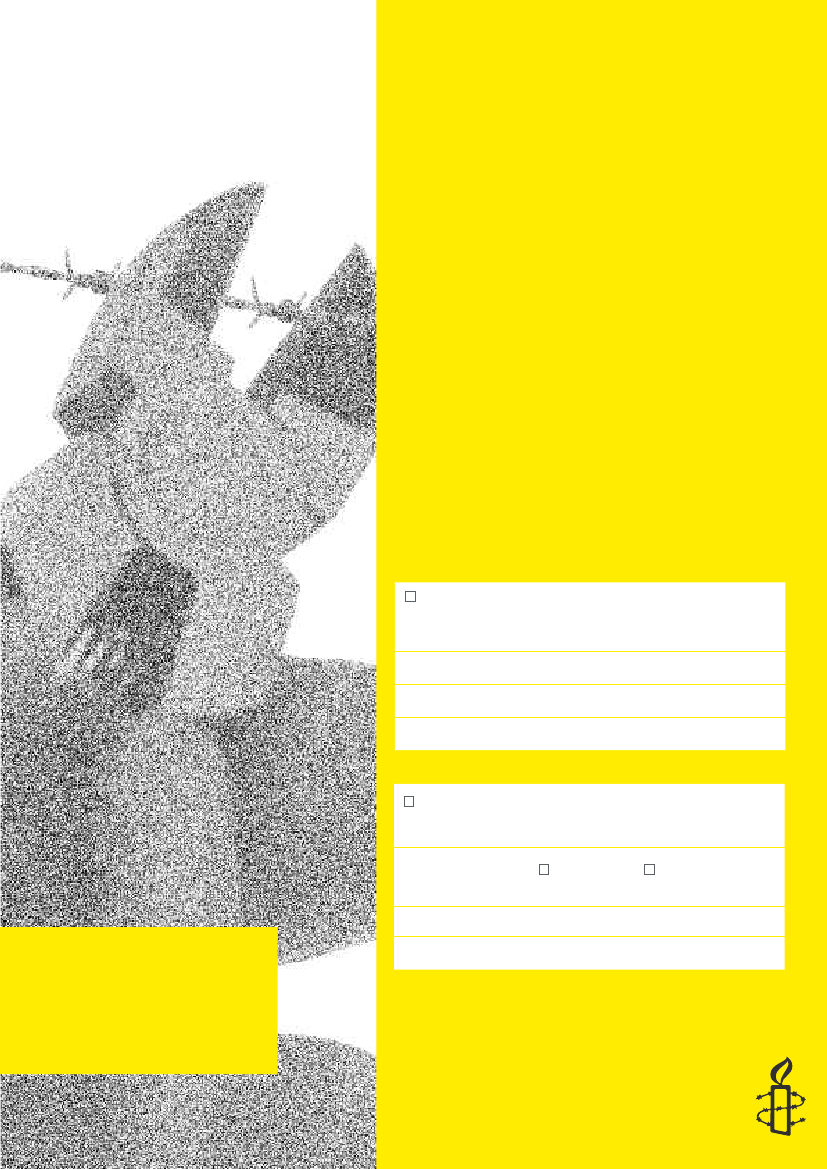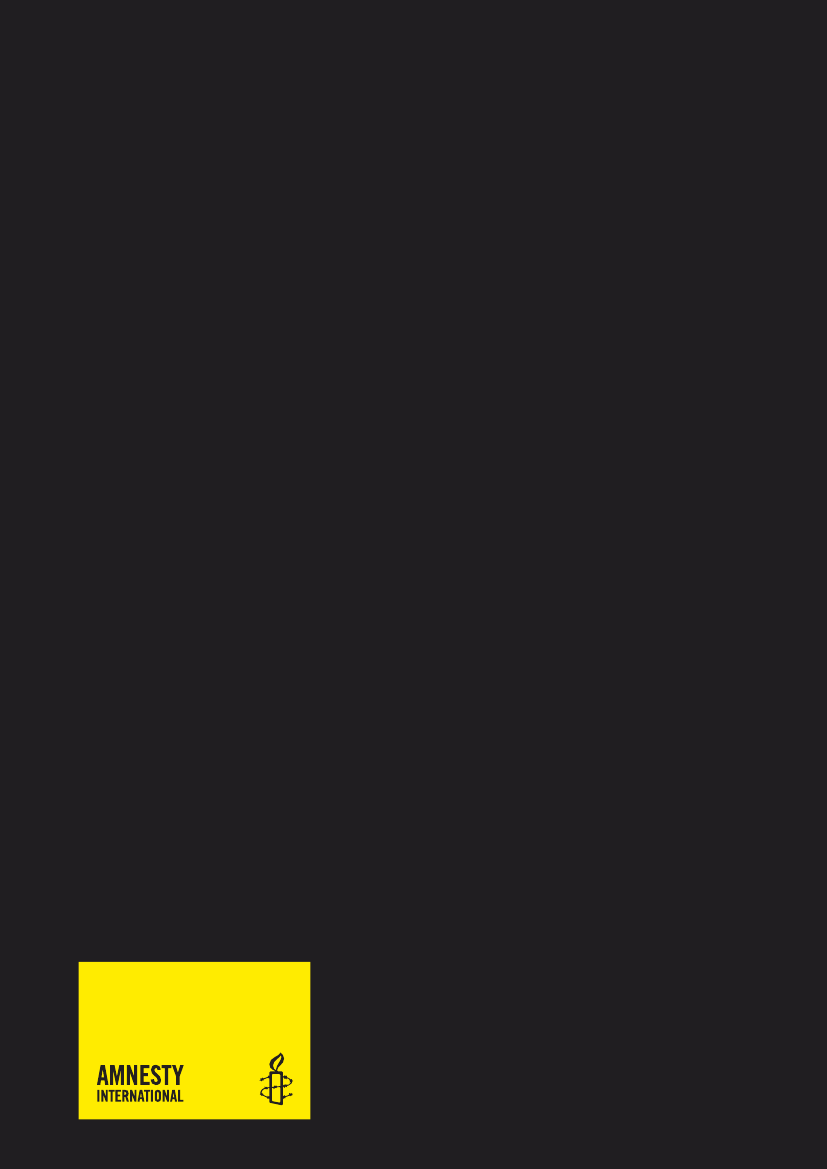Udenrigsudvalget 2011-12
URU Alm.del Bilag 65
Offentligt
sECuriTY WiTHHuMaN riGHTs
sauDI arabIa
rEPrEssiONiN THE NaMEOF sECuriTY
amnesty international is a global movement of more than 3 million supporters,members and activists in more than 150 countries and territories who campaignto end grave abuses of human rights.Our vision is for every person to enjoy all the rights enshrined in the universaldeclaration of Human rights and other international human rights standards.We are independent of any government, political ideology, economic interest orreligion and are funded mainly by our membership and public donations.
First published in 2011 byamnesty international LtdPeter benenson House1 Easton streetLondon WC1X 0dWunited Kingdom� amnesty international 2011index: MdE 23/016/2011 EnglishOriginal language: EnglishPrinted by amnesty international,international secretariat, united Kingdomall rights reserved. This publication is copyright, but maybe reproduced by any method without fee for advocacy,campaigning and teaching purposes, but not for resale.The copyright holders request that all such use be registeredwith them for impact assessment purposes. For copying inany other circumstances, or for reuse in other publications,or for translation or adaptation, prior written permission mustbe obtained from the publishers, and a fee may be payable.To request permission, or for any other inquiries, pleasecontact [email protected]Cover photo:anti-riot police in a stand-off with protestersin awwamiya, a town in the Eastern Province of saudi arabia,March 2011. The protesters were demanding the release ofshi'a prisoners being held without charge or trial since the1990s. � rEuTErs/Zaki Ghawas
amnesty.org
CONTENTS1. Introduction.............................................................................................................3Amnesty International’s work ......................................................................................52. Draft anti-terror law...................................................................................................7Law in preparation .....................................................................................................7Threat to human rights ...............................................................................................9a) Vague and broad definition of terrorism offences....................................................9b) Unlawful restrictions on freedom of expression ....................................................10c) Lack of definitions for key terms.........................................................................12d) Violations of rights of detainees..........................................................................12e) Broad Interior Ministry powers without judicial supervision....................................15f) Wide scope for the death penalty ........................................................................16Conclusion..............................................................................................................163. Detentions and trials in the name of counter-terrorism................................................18Offical figures .........................................................................................................18Prolonged detention without charge or trial.................................................................20Unfair trials ............................................................................................................26Case study I: Reformists...........................................................................................29Case study II: Abdullah Abu Bakir Hassan and Abdel Hakim Gellani .............................35“Counselling” programme.........................................................................................384. Crackdown on freedom of expression.........................................................................40Repression of protests ..............................................................................................41
a) Protests by members of the Shi’a minority...........................................................41b) Other protests ..................................................................................................43Arrests of advocates of reform ...................................................................................475. Recommendations..................................................................................................51To the Saudi Arabian government ..............................................................................51To the UN and international community.....................................................................52Endnotes ...................................................................................................................53
Saudi Arabia:Repression in the name of security
3
1. INTRODUCTION“I am here to say we need democracy. We needfreedom. We need to speak freely. We need noone to stop us from expressing our opinions.”Khaled al-Johani speaking to reporters at a protest where no one but he turned up on 11 March 2011 and was arrested shortly after.
Since March 2011 the Saudi Arabian authorities have launched a new wave of repression inthe name of security. They have cracked down on demonstrators protesting over human rightsviolations in the context of calls for reform at home and the uprisings and mass protests inthe region. At the same time, they are in the process of creating a new anti-terror law whichthreatens to exacerbate an already dire situation for freedom of expression, in which any realor perceived dissent is almost instantly suppressed. It would also legalize a number ofabusive practices including arbitrary detention, thus consolidating draconian and abusivecounter-terrorism measures imposed since 2001 against the backdrop of an extremely weakinstitutional framework for the protection of human rights.State power in Saudi Arabia rests almost entirely with the King and the ruling Al Saud family.The Constitution1gives the King absolute power over government institutions and the affairsof the state,2and severely curtails political dissent and freedom of expression.3The country’s27 million4residents have no political institutions independent of government, and politicalparties and trade unions are not tolerated. The media is severely constrained and those whoexpress dissent face arrest and imprisonment, whether political critics, bloggers oracademics. King Abdullah announced on 25 September 2011 that women will have the rightto vote and run in municipal elections, the kingdom’s only public poll, from 2015 and beappointed to the Shura Council, a body that advises the monarchy. However, women remainsubject to severe discrimination in both law and practice. Women are unable to travel, engagein paid work or higher education, or marry without the permission of a male guardian.5It is against this background that some Saudi Arabians have been insisting publicly that it istime for change and for their human rights to be respected. Many have tried to assert theirright to peaceful protest on the streets. Some have demanded political and social reforms;others have called for the release of relatives detained without charge or trial on terrorism-related grounds. In response, the security forces have arrested hundreds of people forprotesting or voicing their opposition to government policies this year. Most have beenreleased without charge; others remain in detention without charge or trial; and others stillhave been charged with vague security-related and other offences. Amnesty Internationalconsiders many of those detained to be prisoners of conscience, held solely for peacefullyexpressing their rights to freedom of expression and assembly.
Index: MDE 23/016/2011
Amnesty International December 2011
4
Saudi Arabia:Repression in the name of security
The formulation of a new anti-terror law is another apparent sign of the authorities’ to use thelaw to silence discontent in the Kingdom. A copy of the draft law was leaked to AmnestyInternational in late June 2011. Among other things, it would provide for the prosecution ofacts of peaceful dissent as a “terrorist crime” such as “harming the reputation of the state orits position”. Questioning the integrity of the King or the Crown Prince would be punishableby a minimum of 10 years in prison. The law would also give the authorities carte blanche todetain security suspects indefinitely without charge or trial. The draft law has been criticizedby members of civil society in Saudi Arabia who see it as an attempt to justify the arrest,detention and punishment of pro-reform activists. Adapting the mantra repeated throughoutthe region during mass protests this year - “the people want to overthrow the regime” - oneactivist in Saudi Arabia said in reference to the draft law that “the regime wants to arrest thepeople”.Thousands of people have been detained in the past decade on security grounds, many ofwhom remain behind bars. Among them are clerics and people suspected of belonging to orsupporting armed Islamist groups such as al-Qa’ida or other groups opposed to the SaudiArabian government or its links with the West. Typically, they have been detained for monthsin conditions of virtual secrecy, held without charge or trial for years and without any meansof challenging their detention. Most have been held initially in prolonged incommunicadodetention for interrogation for varying periods and have subsequently at times been deniedaccess to lawyers, medical assistance and family visits. Some, it appears, have been tried insecret and sentenced to prison terms. Some have been held for “re-education”.Torture and other ill-treatment facilitated by incommunicado detention remain rife becauseinterrogators know that they can commit their crimes without fear of punishment. The abuseis also encouraged by the ready acceptance by courts of “confessions” forced out ofdetainees using beatings, electric shocks and other forms of torture and other ill-treatment.Those who have been charged with security-related offences and brought to trial have facedgrossly unfair and in many instances secret proceedings. Since its establishment in October2008 such trials have generally been heard by the Specialized Criminal Court.Caught up in the sweeping repression are an unknown number of human rights defenders,peaceful advocates of political reform, members of religious minorities and many others whohave committed no internationally recognized offence. At least some of them are prisoners ofconscience.Saudi Arabia has witnessed sporadic incidents of political violence over the years, with stateinstitutions, oil installations and Western nationals the most common targets. AmnestyInternational has repeatedly and unreservedly condemned killings and other abuses by armedgroups and individuals in Saudi Arabia, and called for the perpetrators to be brought tojustice in accordance with international standards and without recourse to the death penalty.It has also appealed to armed groups to respect the humanity of all individuals, and urgedthem to respect international law and standards that prohibit abuses such as the targeting ofcivilians and hostage-taking.Amnesty International fully recognizes the duty and responsibility of the Saudi Arabianauthorities to protect the public from violent attacks, including by bringing to justice people
Amnesty International December 2011
Index: MDE 23/016/2011
Saudi Arabia:Repression in the name of security
5
involved in such attacks. However, the Saudi Arabian authorities must at all times complywith their obligations under international human rights law and never violate the rights ofsuspects. Combating terrorism and other threats against public safety must not be used as apretext or justification for violations of human rights or for allowing officials to commit suchviolations with impunity.
AMNESTY INTERNATIONAL’S WORKResearching human rights in Saudi Arabia is extremely difficult. The government does notallow Amnesty International to visit the country to research human rights issues; many otherinternational observers have similar access problems. The state and its justice system operatelargely in secret, and the media is severely censored and otherwise constrained. Independenthuman rights organizations and other NGOs are not permitted to operate freely,6and civilsociety remains weak because of government repression. As a result, little information isrecorded or published about human rights. Websites of organizations critical of the SaudiArabian authorities have been blocked at times inside the country. After AmnestyInternational published a copy of the draft anti-terror law along with its concerns about it, itswebsitewww.amnesty.orgwas reportedly blocked within Saudi Arabia for around a week.7The block appeared to be lifted after the blocking was widely reported in the internationalmedia and social media sites.
Screenshot of web page that appeared when internet users attempted to access Amnesty International’s websitewww.amnesty.orginside Saudi Arabia after the organization published the draft anti-terror law on it � Private
This report is based on information divulged to Amnesty International by people in SaudiArabia and Saudi Arabians or foreign nationals, including former prisoners, who have left thecountry. It is also based on government statements, where they exist, local and internationalmedia reports and other research carried out despite the obstacles.
Index: MDE 23/016/2011
Amnesty International December 2011
6
Saudi Arabia:Repression in the name of security
The report follows up on issues covered in Amnesty International’s 2009 publication,SaudiArabia: Assaulting human rights in the name of counter-terrorism.8It updates cases andtrials covered in that report, and includes information on new cases that have emerged since2009 and others from previous years that have been brought to the organization’s attentionsince 2009. It also covers the crackdown on protests since early 2011.Amnesty International regularly writes to the Saudi Arabian authorities about its concerns andto seek permission to visit the country, including to observe trials of security detainees, butgenerally does not receive substantive responses. On 26 August 2011 Amnesty Internationalsubmitted a memorandum to the Saudi Arabian government to seek clarifications on theconcerns and cases raised in this report. The government replied with a letter dated 20September 2011 focusing on its concerns about Amnesty International’s publication of aleaked copy of the draft anti-terror law and clarifying some aspects of the legislative processwith respect to the law (see Chapter 2: Draft anti-terror law for further details oncommunication between Amnesty International and the Saudi Arabian government on thisissue). The letter did not, however, provide any response to the memorandum’s request forinformation and comments on the issues and cases in this report. Amnesty International sentanother letter to the Saudi Arabian government on 20 November, reminding it of theoutstanding request and providing additional time for a response, but had not received anyfurther reply as of writing.Amnesty International is publishing the information in this report to puncture the wall ofsecrecy around the gross and widespread human rights violations being committed in SaudiArabia, and to help stop these violations. To this end, Amnesty International is calling on theSaudi Arabian authorities to take urgent action, including to:
immediately release all prisoners of conscience, such as those held solely for thepeaceful exercise of their rights to freedom of opinion, expression, assembly or association;end all arbitrary arrests and detentions;
provide prompt and public trials meeting international standards of fairness withoutrecourse to the death penalty to all detainees charged or held, including on suspicion ofterrorism-related offences, or else release them;investigate thoroughly and independently all allegations of torture and other ill-treatmentand bring those found responsible to justice;
considerably amend the draft Penal Law for Terrorism Crimes and Financing of Terrorismand bring all of Saudi Arabia’s terrorism-related laws and practices into line withinternational human rights law and standards.
Amnesty International December 2011
Index: MDE 23/016/2011
Saudi Arabia:Repression in the name of security
7
2. DRAFT ANTI-TERROR LAWLAW IN PREPARATIONThe draft Penal Law for Terrorism Crimes andFinancing of Terrorism, as the new draft anti-terror lawis formally known, was prepared initially by theMinistry of Interior and then reviewed by the ShuraCouncil, which can recommend amendments to draftlaws but has no binding legislative powers. Althoughthe text of the law has been kept confidential, asusually happens with draft legislation in Saudi Arabia,in late June 2011 sources within Saudi Arabia leakeda copy of what was believed to be the then latestversion of the draft to Amnesty International. Theyalso leaked a report on the draft law prepared by theCommittee on Security Affairs of the Shura Council.9The preparation of the draft law comes against thebackdrop of a number of other security-related lawsFirst page of draft anti-terror lawissued by royal decree in recent years. They include� Amnesty International10laws governing offences related to explosives, andarms and ammunitions,11as well as two on money laundering and IT offences in which“terrorism” is mentioned but not defined.12Saudi Arabia’s legal system contains no writtencriminal code, but is rather largely based on an uncodified form of Shari’a, as interpreted bythe country’s judges.The sources who leaked the draft law said they did so because, despite the risks tothemselves of taking such action, they believed that the law went far beyond the frameworkof legitimate measures to combat terrorism and so needed to be exposed to public debate.Amnesty International analysed the draft in detail and came to the conclusion that the lawrisked entrenching existing patterns of human rights violations in the context of counteringterrorism and providing a further tool to suppress peaceful political dissent at a time whenpeople were taking to the streets across the Middle East and North Africa to demand greaterfreedoms.Amnesty International was also concerned that the virtual secrecy surrounding thepreparation of the law was denying people in Saudi Arabia the opportunity to debate animportant development that was a matter of genuine and wide public interest. In thisconnection, it is relevant to note the view of the Special Rapporteur on the promotion andprotection of human rights and fundamental freedoms while countering terrorism, MartinScheinin, who wrote in 2010 that the implications of counter-terrorism legislation were so“potentially profound” that governments should “seek to ensure the broadest possiblepolitical and popular support for counter-terrorism laws through an open and transparentprocess.”13
Index: MDE 23/016/2011
Amnesty International December 2011
8
Saudi Arabia:Repression in the name of security
Amnesty International published the draft law, along with a summary of its concerns(detailed later in this chapter) and the report of the Shura Council’s Committee on SecurityAffairs, on 22 July 2011, writing to the Saudi Arabian government the day before to requestinformation on the status of the law.14Its aim was to try and ensure that these concerns weremade known and considered in the context of a public debate in Saudi Arabia. The report ofthe Shura Council’s Committee on Security Affairs reveals that some Saudi Arabianauthorities, including the Ministry of Justice, the Human Rights Commission and the PublicProsecution, had raised concerns themselves about, for instance, the detention proceduresprovided for in the draft.The authorities replied in a letter dated 24 July in which they described the concerns as“baseless, mere supposition and without foundation”, but neither addressed the substance ofthe concerns nor provided further details on the process or timeline which would lead to thelaw being brought into force.15Similar messages were given at a meeting between AmnestyInternational and the Saudi Arabian embassy in London on 29 July. Amnesty Internationalpublished the letter of 24 July at the authorities’ request, along with its response to it.16On 26 August Amnesty International submitted a memorandum to the government in which,as well as raising other human rights issues, it asked again for clarification on the status ofthe law and whether concerns raised about the draft were being taken into consideration. Thegovernment sent a response dated 20 September 2011 in which it provided a number ofdetails related to the progress of the draft law:1. The draft law was submitted to the Shura Council in 72 articles and referred tothe Committee on Security Affairs for review. The committee held a series ofmeetings to discuss the draft, interviewed government agencies, experts and subjectspecialists, and submitted a detailed report to the Council.2. During a further series of discussions, 85 interventions to the law was raised.3. Among the changes made were the deletion of 15 draft articles relating to penallaw for crimes of terrorism and terrorist financing. Amendments were also made to31 articles, including those relating to investigations, the issue of contact with thefamily of accused persons, and a reduction in the duration of initial detention.4. The Council highlighted in its amendments the difference between crimes ofterrorism, state crimes, and other crimes.5. The final draft approved by the Board comprises 58 articles. The Kingdom wouldlike to point out that the threat of terrorism is a global issue and remains a seriouschallenge for all governments. We will continue to tackle this threat to the securityof our country in every way necessary.17The letter repeated its view that Amnesty International had behaved improperly, saying that ithad “published an unfair analysis” of the draft law which had generated “inflammatory,baseless remarks about the content of the document”. The letter did not, however, providethe latest draft text of the law, making it impossible to assess the amendments that had beenmade. Neither did it clarify whether the law had been finalized or remained in draft form and,
Amnesty International December 2011
Index: MDE 23/016/2011
Saudi Arabia:Repression in the name of security
9
if so, what the process still to be followed was. Amnesty International’s understanding is that,once a final draft is completed, it would have to be approved by the King as the head of theCouncil of Ministers and head of state before the law comes into effect. This could happenimminently.
THREAT TO HUMAN RIGHTSThe Saudi Arabian government has told Amnesty International that the “fight againstterrorism requires appropriate legislation” and has justified the draft law and its provisions byreferring to the need to ensure security and pointing to the challenges faced by Saudi Arabiain relation to terrorism.18Amnesty International fully recognizes that Saudi Arabia has suffered serious attacks byarmed groups in recent years and continues to face security concerns and that thegovernment has a responsibility to ensure public safety in the face of threats of such actsoccurring in the future. It condemns all violent attacks targeting civilians unreservedly andcalls for those responsible to be brought to justice. Amnesty International acknowledges thatthe authorities can and should take measures to counter such attacks, but contends thatwhen doing so they must adhere to their obligations under international law, including theinternational human rights treaties to which Saudi Arabia is party, such as the UNConvention against Torture and Other Cruel, Inhuman or Degrading Treatment orPunishment.In setting out its counter-terrorism strategy, the UN General Assembly has adopted a similarapproach:The promotion and protection of human rights for all and the rule of law is essentialto all components of the Strategy, recognizing that effective counter-terrorismmeasures and the protection of human rights are not conflicting goals, butcomplementary and mutually reinforcing…19Amnesty International considers that the version of the draft law that it has seen is seriouslydeficient in a number of respects. Below are some of the key concerns that the organizationhas identified about the text of this version.
A) VAGUE AND BROAD DEFINITION OF TERRORISM OFFENCESThe definition of terrorism offences in the draft law is so vague and broad that it lends itselfto abuse. Article 1 defines “the crime of terrorism”:a) The crime of terrorism:All crimes referred to in this law and all actions taken by the accused through wordsor action in the pursuance of a personal or collective enterprise aimed atundermining the public policy of the state; destabilizing society or the security ofthe state; endangering its national unity; revoking the Basic Law of Governance orsome of its articles; harming the reputation of the state or its standing; damaging itsinfrastructure or natural resources; or threatening to carry out actions that lead tothe above mentioned aims.
Index: MDE 23/016/2011
Amnesty International December 2011
10
Saudi Arabia:Repression in the name of security
The crime of terrorism includestakfeerof the state [deeming the state an infidelstate] and adopting the approach oftakfeer[deeming others as infidels] that leadsto committing a terrorist crime or inciting it, as well as anything that is likely toproduce intellectual or doctrinal bases to justify these crimes or to promote theseideas or to incite them or to publish material or information that incites or leads tothe implementation of a terrorist activity.20Under international law, the definition of crimes has to be clear and narrowly defined. In thecontext of national security laws, the UN Special Rapporteur on the promotion and protectionof human rights and fundamental freedoms while countering terrorism has explained that theprinciple of legality (the requirement that crimes must be enshrined in laws that are clear,ascertainable and predictable21) means that legal provisions “must be framed in such a waythat: the law is adequately accessible so that the individual has a proper indication of howthe law limits his or her conduct; and the law is formulated with sufficient precision so thatthe individual can regulate his or her conduct.”22Analogously, the UN Working Group on Arbitrary Detention has expressed particular concernabout “extremely vague and broad definitions of terrorism in national legislation”, stating,“[i]n the absence of a definition of the offence or when the description of the acts oromissions with which someone is charged is inadequate… the requirement of a precisedefinition of the crimes - the key to the whole modern penal system – is not fulfilled and thatthe principle of lawfulness is thus violated, with the attendant risk to the legitimate exerciseof fundamental freedoms.”23In contrast, the draft law, while it criminalizes some well-defined acts such as hostagetaking,24provides a general definition of terrorist crimes which is extremely vague and broadand not restricted for example to acts of violence against members of the general public. Thevague acts criminalized by the definition in Article 1 include “destabilizing society”,“endangering… national unity”, “revoking the Basic Law of Governance” and “harming thereputation of the state”.
B) UNLAWFUL RESTRICTIONS ON FREEDOM OF EXPRESSIONThe draft law contains numerous provisions that either restrict the legitimate exercise offreedom of expression or may be used as a convenient vehicle to criminalize dissent orcriticism of the authorities or even calls for reform, and could be used to punish the peacefulexpression of opinions under the pretext of protecting security.For example, under Article 1 an action which is deemed by the authorities as “harming thereputation of the state” may be considered as “terrorism”. Since under the same article it isalso considered “terrorism” to “publish material or information that incites or leads to theimplementation of a terrorist activity”, it appears to follow that publication of criticism of theauthorities may be deemed to be an act of “terrorism”.Under Article 29 “anyone who describes the King – or the Crown Prince – as an infidel,questions his integrity or defames his trustworthiness, or revokes his allegiance [to the King]or incites this” shall be “punished with a prison term of no less than 10 years”.
Amnesty International December 2011
Index: MDE 23/016/2011
Saudi Arabia:Repression in the name of security
11
Under Article 45 “anyone who intentionally broadcasts – for the purpose of committing aterrorist crime by any means – a news item, a statement or a false or tendentious rumourlikely to stir up people or spread panic among them or shake the confidence of citizens in thestate or the King or the Crown Prince” shall be “punished with a prison term of no less thanthree years”.Under Article 51 “anyone who publicly transgresses on any of the established principles ofShari’a or the established principles of the legitimacy of the state, if this was likely to upsetstability or lead to a terrorist crime” shall be “punished with a prison term of no less than 10years”.These articles explicitly provide for restrictions on peaceful dissent and other limitations onfreedom of speech which are not allowed under international human rights law andstandards. Those provide only for narrowly defined restrictions for considerations of respect ofthe rights or reputations of others, the protection of national security, public order, publichealth or morals and the prevention of incitement to discrimination, hostility, violence andwar propaganda.25Other articles of the draft law refer to terrorist offences which by their nature are too broadand vague and as such may also have the impact of restricting freedom of expression. Forexample, under Article 44 “anyone who openly praises a terrorist crime” shall be “punishedwith a prison term of no less than two years”. Likewise, “anyone who promotes – orally or inwriting by any means – a terrorist crime or any matter contrary to the Kingdom’s politicalapproaches or any idea that affects national unity or calls for sedition or shakes nationalunity” shall be “punished with a prison term of no less than five years”. Article 52criminalizes the holding of meetings “to plan a terrorist act”. Since “the crime of terrorism”under the draft law includes peaceful expressions of dissent, holding peaceful politicalmeetings could be deemed to come within the definition of a “terrorist crime”.One of the articles that the Committee for Security Affairs of the Shura Council proposedremoving when it reviewed the draft law is Article 47, under which “anyone who organizes ademonstration, participates in its organization, assists it, calls for it, or incites it” shall be“punished with a prison term of no less than three years” and “anyone who raises a slogan orimage likely to infringe upon the country’s unity or its safety or to call for sedition anddivision and disunity among individuals in society, or incites such acts” shall be “punishedwith a prison term of no less than seven years”. It is not clear, however, if the proposedremoval of the article has been or will be accepted or rejected.The proposed restrictions in the draft law come in a context of increasing constraints onfreedom of expression in Saudi Arabia. On 29 April 2011, the authorities amended thePrinting and Publications Law of 2000.26The amendments include new restrictionsprohibiting the publication of anything that “contradicts rulings of the Shari’a or regulationsin force”, “calls for disturbing the country’s security, or its public order, or serves foreigninterests that contradict national interests”, “causes sectarianism or that spreads divisionsbetween citizens” or “damages public affairs in the country”. They also include a prohibitionon violating the “reputation or dignity” of the Grand Mufti, members of the Council of SeniorUlema (Religious Scholars), or any other government official or government institution, aswell as on slandering or libelling them, and on publishing without official consent
Index: MDE 23/016/2011
Amnesty International December 2011
12
Saudi Arabia:Repression in the name of security
proceedings from any investigations or court trials.27A decree issued three months earlierhad already extended provisions of the Printing and Publications Law to onlinecommunications.28
C) LACK OF DEFINITIONS FOR KEY TERMSWhile instances of “the crime of terrorism” are defined, albeit in broad and excessive terms,as described above, the draft law contains key terms that have not been defined at all,leaving room for abusive application, in particular against groups engaged in peacefuldissent.For example, the draft law fails to define what constitutes a “terrorist group”, “a terroristorganization”, “a terrorist gang” and “a terrorist entity” despite the fact that it containsseveral provisions to which these terms are central. Article 43 criminalizes the setting up ofwebsites to “facilitate communication with the leaderships of terrorist organizations or any oftheir members or to promote their ideas”. The offence carries a prison term of at least 15years. Under Article 44, anyone who praises or promotes a terrorist crime “or any mattercontrary to the Kingdom’s political approaches” is to be sentenced to no less than 10 years’imprisonment “if he is connected to a terrorist group or organization” – otherwise thepunishment is five years. Article 52 similarly criminalizes holding “a meeting with membersof any terrorist organization, group or gang or any other terrorist entity – of whatever kind… topursue a terrorist purpose, to harm the country and its security, to shake its stability orreligious standing, or to damage its international relations”.This opaqueness could be exploited to charge peaceful meetings of a group of people whomake political demands or even engage in academic discussions with a “terrorist crime”under this draft law.Another term for which no definition is provided for in the draft law istakfeer(deemingothers as infidels). While it is true that stating that someone is an infidel can have seriousrepercussions for the person regarded as an infidel, the draft law does not define what wouldamount totakfeer.
D) VIOLATIONS OF RIGHTS OF DETAINEESThe draft anti-terror law provides for measures constituting serious violations of the rights ofdetainees.The draft law explicitly provides for prolonged, indeed indefinite, incommunicado detention.Under Article 9 the “investigating authority” may “prohibit contact with the suspect for aperiod not exceeding 120 days if the interest of the investigation requires it”. The mattermust be raised with the Specialized Criminal Court if the investigating authority requests “alonger period”, at which point the Court “decides as it deems appropriate”. No restrictions onthe length of such an extension is provided for.The Saudi Arabian government has explained to Amnesty International why the draft law“gives judges discretion over the reporting of the detention of a suspected terrorist and thecircumstances in which such a suspect can be held in prison prior to trial”:For those who work in counter-terrorism, the reasons for this are clear. There are
Amnesty International December 2011
Index: MDE 23/016/2011
Saudi Arabia:Repression in the name of security
13
cases in which revealing that a suspect has been apprehended could undermine anongoing operation against a larger terrorist cell and thus seriously damage counter-terrorism efforts.29There can, however, be no justification for provisions which would allow for incommunicadodetention for periods up to 120 days, let alone for an indefinite period. The UN GeneralAssembly has stated that “prolonged incommunicado detention or detention in secret placescan facilitate the perpetration of torture and other cruel, inhuman or degrading treatment orpunishment and can in itself constitute a form of such treatment,”30the UN Human RightsCommittee has stated that provisions should be made against the use of incommunicadodetention,31and the UN Committee against Torture has consistently called for itselimination.32The UN Special Rapporteur on torture and other cruel, inhuman or degradingtreatment or punishment, recognizing that “torture is most frequently practised duringincommunicado detention”, has also called for such detention to be made illegal.33In the words of the Inter-American Court of Human Rights:The mere subjection of an individual to prolonged isolation and deprivation ofcommunication is in itself cruel and inhuman treatment which harms thepsychological and moral integrity of the person, and violates the right of everydetainee under Article 5(1) and 5(2) to treatment respectful of his dignity.34In 2001, referring to allegations of torture by Israeli security forces, the Special Rapporteuron torture and other cruel, inhuman or degrading treatment or punishment stated thefollowing:The Special Rapporteur accepts that not all allegations [of torture] will be wellfounded. Nevertheless, as long as the Government continues to detain personsincommunicado for exorbitant periods, itself a practice constituting cruel, inhumanor degrading treatment (as repeatedly confirmed by the [UN Human Rights]Commission), the burden will be on the Government to prove that the allegations areuntrue. This is a burden that it will not generally be able to dischargeconvincingly.35[emphasis added]Saudi Arabia’s Law on Criminal Procedures of 2001 introduced safeguards prohibiting tortureor degrading treatment and “bodily or moral harm” of those arrested or detained (Articles 2and 35) and requiring interrogators “not to affect the will of the accused” in making astatement (Article 102).36However, these safeguards do not appear to be enforced inpractice and have not curbed the use of torture or other ill-treatment against detainees.37Also, even though Saudi Arabia is a state party to the Convention against Torture and OtherCruel, Inhuman or Degrading Treatment or Punishment, which places an obligation on statesto take effective legislative, administrative, judicial or other measures to prevent torture asdefined in Article 1 of that treaty, including by making it a criminal offence punishable bypenalties which take into account their grave nature, the Law on Criminal Procedures doesnot define torture in terms consistent with the definition in the treaty, nor does it make it acriminal offence.38The UN Committee against Torture in its report on Saudi Arabia in 2002 stated that Saudi
Index: MDE 23/016/2011
Amnesty International December 2011
14
Saudi Arabia:Repression in the name of security
Arabia’s domestic law did not expressly reflect the prohibition on torture as laid out in theConvention against Torture and Other Cruel, Inhuman or Degrading Treatment or Punishmentand nor did it impose criminal sanctions.39The draft law also permits prolonged detention without charge or trial, effectively legalizingarbitrary detention. Under Article 8, the “investigating authority” may detain a suspect for aperiod of up to six months without charge or trial and may extend the detention for anothersix months “if the investigation procedures require that”. It may apply for a “longer period”of detention with the Specialized Criminal Court, which “decides as it deems appropriate”.Here too, no restrictions are imposed on the maximum period, raising concerns that sucharbitrary detention may be imposed indefinitely. This extends beyond the current limit ondetention without trial under the Law on Criminal Procedures, which has a maximum limit ofsix months.40The draft law’s provisions restrict detainees’ right to access legal counsel during the period ofinvestigation. Under Article 13, a suspect may appoint a lawyer to defend himself within“adequate time” prior to the case being transferred to the court. The investigating authoritydetermines what amounts to “adequate time”.Article 15 sanctions secret evidence; under this article the testimony of “experts” and“witnesses” may be heard “without the presence of the suspect and his lawyer”. The accusedis to be “informed of the content of the expert report without the identity of the expert beingrevealed”. The provision does not extend to entitling an accused person or their lawyer tocross-examine such an expert or witness, leaving the accused without access to the details ofevidence against them.Article 11(1) of the Universal Declaration of Human Rights states:Everyone charged with a penal offence has the right to be presumed innocent untilproved guilty according to law in a public trial at which he has had all theguarantees necessary for his defence.Article 14 of the International Covenant on Civil and Political Rights (ICCPR), which lists thecomponents of the right to a fair trial, stipulates, among other things:In the determination of any criminal charge against him, everyone shall be entitledto the following minimum guarantees, in full equality… to examine, or haveexamined, the witnesses against him and to obtain the attendance and examinationof witnesses on his behalf under the same conditions as witnesses against him.41Saudi Arabia is not a state party to the ICCPR. However, the principle known as “equality ofarms”, that is, the right of both sides in a court case to be treated without discrimination,including having equal access to documents and equal ability to question witnesses, hasbeen recognized as a general principle of law, that is, a procedural principle so widelyaccepted and deeply ingrained in judicial tradition and practice that it is binding on allstates, irrespective of whether or not they are parties to a treaty that provides for thisprinciple.42This principle is clearly breached by these provisions in the draft law.
Amnesty International December 2011
Index: MDE 23/016/2011
Saudi Arabia:Repression in the name of security
15
E) BROAD INTERIOR MINISTRY POWERSWITHOUT JUDICIAL SUPERVISIONThe Ministry of Interior, the instigatorof this draft law, is set to enjoy verywide powers, some of them usuallyreserved for the judiciary or the publicprosecution, if the law is passed.These wide powers range fromauthorizing the Minister of Interior “totake the necessary measures toprotect internal security from anyterrorist threat”, under Article 4, tohaving the sole say in determining if aSaudi Arabian Ministry of Interior building in Riyadh � Jon Rawlinsonsuspect may be released temporarily,that is on bail, under Article 10. Moreover, there are no provisions in the draft law subjectingthese powers to judicial supervision or oversight.Articles 5 and 6 further undermine the role of the judiciary. For example, under Article 5 theMinistry of Interior is entrusted with investigating “terrorist crimes and their financing”, andthe Minister of Interior has the role of issuing “a decision to co-ordinate and organize thework between the investigating authority and the public prosecution”. Article 6 provides forthe creation of a Security Cases Division within the Bureau of Investigation and PublicProsecution. Its members are to be appointed by the Minister of Interior, to bring casesbefore the Specialized Criminal Court and “to monitor and inspect prisons and places ofdetention dedicated to the detention of those convicted of and those suspected of crimes ofterrorism or its financing, and to oversee the implementation of the punishments in this law”.The draft law gives the Minister of Interior the right to issue orders for the arrest of a“terrorism” suspect or for entering a building to search it, including without a warrant(Articles 7 and 22). The Minister of Interior may delegate these powers to anyone he sees fit.The Minister may order the monitoring of communications (Article 23). These provisions donot state that the order should provide an opportunity to challenge it. Such provisions gobeyond what is provided for in the Law on Criminal Procedures.43Under Article 17, a decision to drop charges is not valid unless approved by the Minister ofInterior or anyone he delegates.One of the most far-reaching powers which might be conferred on the Ministry of Interior iscontained in an article that the Shura Council’s Committee for Security Affairs opposed,arguing that it undermined the independence of the judiciary. Article 65 stipulates that acommittee headed by a judge and comprising two other members, one of them a “religiousadvisor”, will be set up in the Ministry of Interior to look into the case of prisoners whoseforthcoming release is “considered dangerous to the security and safety of the state”. Thecommittee could decide to take “any appropriate procedures and measures to avert the threatfrom him”, including to prolong his detention. An affected prisoner would have the right toappeal the committee’s decision before the Specialized Criminal Court.
Index: MDE 23/016/2011
Amnesty International December 2011
16
Saudi Arabia:Repression in the name of security
An accused person or a sentenced prisoner who has suffered harm as a result of theirdetention or imprisonment being unduly prolonged has no recourse to the judiciary to bring acriminal or civil case but may apply to a committee to be set up by the Ministry of Interior forcompensation (Article 61). This effectively means that the Ministry could act with impunity.The Minister of Interior also has the authority to release detainees or anyone sentenced forterrorist crimes while they are serving their sentences (Article 59).Articles 62 and 63 stipulate that special centres will be set up to “educate detainees andthose convicted of terrorist crimes” in order to “rectify their ideas and deepen their sense ofnational belonging”. The draft law does not, however, provide clarity as to whether adetainee’s attendance of these centres is voluntary or not or whether refusal to attend suchcentres invites any sanction or punishment. As an exception to the rules on banking secrecy,under Article 18, the Minister of the Interior – “in exceptional cases which he determines” –may allow the investigating authority, through the Saudi Arabian Monetary Agency, to accessor obtain information relating to funds held in financial institutions. It is of concern that nojudicial oversight is provided for.
F) WIDE SCOPE FOR THE DEATH PENALTYThe draft anti-terror law contains 27 instances where the death penalty can be applied.Amnesty International opposes the death penalty in all circumstances and so is concerned atthe wide scope which the draft law gives to capital punishment. In addition, it notes that thedraft law would lead to several specific violations of international standards:i) Under international human rights law, people charged with crimes punishable by death areentitled to the strictest observance of all fair trial guarantees and to certain additionalsafeguards. Such guarantees and safeguards are absent.ii) Under international human rights law, death sentences may be imposed only for the mostserious crimes. According to the UN Special Rapporteur on extrajudicial, summary orarbitrary executions “the death penalty can only be imposed in such a way that it complieswith the stricture that it must be limited to the most serious crimes, in cases where it can beshown that there was an intention to kill which resulted in the loss of life.”44Given the vaguedefinitions in the draft law, discussed above, the death penalty could be imposed in relationto offences which do not fall in the “most serious crimes” category, contrary to internationallaw.iii) The draft law does not prohibit the imposition of the death penalty on juvenile offenders(those aged under 18 at the time of the alleged crime), as provided in the UN Convention onthe Rights of the Child, to which Saudi Arabia is a state party,45or on the mentally ill.46These concerns are exacerbated when the shortcomings in Saudi Arabia’s justice system areconsidered. Amnesty International has documented the use of the death penalty and the fairtrial concerns surrounding it.47
CONCLUSIONThe draft law currently available to the organization contains serious flaws as set out abovethat contravene Saudi Arabia’s international obligations to ensure that security legislationdoes not come at the expense of human rights. Instead it authorizes the violation of the rights
Amnesty International December 2011
Index: MDE 23/016/2011
Saudi Arabia:Repression in the name of security
17
of detainees, threatens the legitimate exercise of freedom of expression, including peacefulpolitical dissent, undermines the independence of the judiciary, and gives the Ministry ofInterior wide-ranging powers without judicial oversight.If passed, the draft law would consolidate anti-terrorism measures that breach internationalhuman rights standards by sanctioning them in law. Such measures have been and continueto be documented by Amnesty International and include arbitrary detention, incommunicadodetention, detention without charge or trial, and unfair trials (see Chapter 3: Detentions andtrials in the name of counter-terrorism).
Index: MDE 23/016/2011
Amnesty International December 2011
18
Saudi Arabia:Repression in the name of security
3. DETENTIONS AND TRIALS IN THENAME OF COUNTER-TERRORISM“For about 7 months we did not know if he wasalive or dead.”Wife of detainee Hamad al-Neyl Abu Kassawy speaking to Amnesty International.
OFFICAL FIGURESDespite maintaining secrecy about many aspects of their workings, the Saudi Arabianauthorities have, through statements issued in recent years, given some sense of the numberof detainees they have arrested, detained and put on trial for what they consider security-related reasons.In July 2007 the Minister of Interior announced that 9,000 people had been arrested duringcounter-terrorism operations between 2003 and 2007 and that 3,106 of them remainedheld.48In October 2008 the Interior Ministry announced that it would refer to court thecases of 991 people accused of being part of the “deviant organization… named al-Qa’ida”.49In the same month a new special court called the Specialized Criminal Court wasestablished to try detainees held on terrorism-related charges.50In mid-March 2009, theMinister of Interior was reported to have stated that the trials had started and that the fullresponsibility for them had been passed on to the Ministry of Justice.51In early July 2009 the government announced that the trials of 330 people charged with“terrorism offences” that had begun in March that year had concluded.52Virtually all of thedefendants were convicted before the Specialized Criminal Court in trials closed to observersand members of the public, with sentences ranging from fines to the death penalty. Theauthorities did not disclose their names or details of the charges. However, it was reportedthat one defendant had been sentenced to death and 323 others had received prison termsranging from a few months to 30 years. Some of the 323 received additional punishments offines or forced residence; others were told they would be released only after “repenting”. Ofthe remaining six defendants, three were sentenced to travel bans and three were acquitted.No further information was given.53On 24 March 2010, the Interior Ministry announced the detention of 113 suspectedmembers of al-Qa’ida in the previous five months – 58 Saudi Arabians, 52 Yemenis, oneSomali, one Bangladeshi and one Eritrean. Among them was a woman who has since beentried and sentenced (see below Unfair trials). The statement said the detainees weresuspected of planning to carry out attacks on oil installations and other targets in Saudi
Amnesty International December 2011
Index: MDE 23/016/2011
Saudi Arabia:Repression in the name of security
19
Arabia.54On 26 November 2010, the Interior Ministry announced the arrest of 149suspected members of al-Qa’ida in the previous eight months – 124 Saudi Arabians and 25foreign nationals who, it said, included Arabs, Africans and South Asians. The statementadded that a woman online activist who had been arrested was released after investigation.55In January 2011, the Justice Ministry announced that the Specialized Criminal Court inRiyadh had issued by early December 2010 preliminary verdicts in 442 cases involvingindividuals who were accused of belonging to al-Qa’ida or “plotting against nationalsecurity”. It said that the cases involved 765 detainees and that the detainees had lodgedappeals against verdicts in 325 cases.56The preliminary verdicts ranged from fines, travelbans and house arrest to terms of imprisonment and the death penalty. The Ministry said thatthe accused had been tried on charges that included “joining al-Qa’ida”, “embracing the al-Qa’ida methodology and supporting its crimes” and “financing and communicating with its[al-Qa’ida] leaders”.On 2 April 2011, the security spokesperson for the Ministry of Interior, General Mansour al-Turki, gave an update to the Ministry’s 2008 statement on the referral to court of 991accused relating to the crimes of al-Qa’ida. He stated that 5,831 detainees had beenreleased “in recent years”, including 184 earlier in 2011; that of 5,696 detainees, 5,080had been questioned and referred for trials; 616 detainees were still being questioned; andthat 1,931 others had been questioned with a view to referring them to the SpecializedCriminal Court. In addition, according to the statement, 486 convicted persons had beencompensated for periods of detention exceeding the term to which they had beensentenced.57An official from the Bureau of Investigation and Public Prosecution stated thesame day that 2,215 people had been referred to the Specialized Criminal Court in casesinvolving “terrorist offences” and that, of these, 612 detainees had received verdicts and603 were still undergoing trials.58In late April 2011,Arab News,a Saudi Arabian English-language daily newspaper, reportedthat an Interior Ministry spokesperson told them that 1,325 foreign nationals were beingtried for their direct or indirect involvement in “terror plots or for conspiracy to participate interror-group activities”.59He also said that 1,612 people had been convicted of “terrorismcharges” and that some women, albeit “very few” in number, were among those who havebeen detained.60While these government statements provide some indication of the scale of the detentionsand trials of people held for what the authorities consider security-related reasons, AmnestyInternational has been unable to obtain further information from the authorities on the detailsof the persons and cases concerned, such as their names, the reasons for their arrest, thelegal basis and conditions of their detention, including their access to family and lawyers, thedetails of their charges and conviction, where applicable, and the dates when they werearrested and, where relevant, charged, brought to trial and convicted. The informationappears not to be available on the Saudi Arabian government’s websites and when AmnestyInternational has written to the authorities to request further details, as it did following theannouncement of the trials of 330 people by the Ministry of Justice in July 2009, theannouncement of the arrests of 113 people by the Interior Ministry in March 2010 and theannouncement of the arrests of 149 people by the Interior Ministry in November 2010,61ithas received no response.62To obtain such details, the organization has therefore had to rely
Index: MDE 23/016/2011
Amnesty International December 2011
20
Saudi Arabia:Repression in the name of security
on the limited information available in the Saudi Arabian media about trials where thepresence of some state media has been authorized and on testimonies of former detainees,their families and lawyers, and human rights activists in the country.
PROLONGED DETENTION WITHOUT CHARGE OR TRIALAmnesty International fully recognizes that the Saudi Arabian authorities have a duty toensure public safety and, in particular, to bring to justice those responsible for carrying out orplanning violent attacks. However, it is seriously concerned about what appears to be apattern of people being detained for months or years on the stated grounds of securitywithout being convicted of any crime. In some cases, the authorities may have evidence ofthe detainees’ involvement in internationally recognized criminal activities, but are failing touse due legal process against them. In many others, the detainees appear to be held on avague suspicion that they pose a threat to Saudi Arabia’s security or because of their real orperceived opposition or criticism of the authorities. In all cases, their detention appears to bearbitrary.
PROHIBITION OF ARBITRARY DETENTIONInternational human rights law and standards clearly prohibit the arbitrary arrests and detentions seen inSaudi Arabia. Article 9 of the Universal Declaration of Human Rights provides that: “No one shall be subjectedto arbitrary arrest, detention or exile.” The UN Working Group on Arbitrary Detention considers that detentionbecomes arbitrary when it falls into one or more of the following categories:A) When it is clearly impossible to invoke any legal basis justifying the deprivation of liberty (aswhen a person is kept in detention after the completion of his sentence or despite an amnesty law applicableto him) (Category I);B) When the deprivation of liberty results from the exercise of the rights or freedoms guaranteed byarticles 7, 13, 14, 18, 19, 10 and 21 of the Universal Declaration of Human Rights and, insofar as Statesparties are concerned, by articles 12, 18, 19, 21, 22, 25, 26 and 27 of the International Covenant on Civil andPolitical Rights (Category II);C) When the total or partial non-observance of the international norms relating to the right to a fairtrial, spelled out in the Universal Declaration of Human Rights and relevant international instrumentsaccepted by the states concerned, is of such gravity as to give the deprivation of liberty an arbitrary character(Category III).63Many detainees held for stated security reasons have been held for prolonged periods withoutbeing brought to trial, or even charged, despite the six-month limit on detention without trialintroduced under the 2001 Law on Criminal Procedures.64They rarely have any idea of whatis going to happen to them. They are invariably held incommunicado following arrest andduring the period of interrogation, which can last for months, before they are allowed familyvisits. They are often detained for months or years without access to a lawyer, informationabout the progress of legal proceedings against them or any opportunity to challenge thelegality of their detention. Many remain held until the authorities decide they are not asecurity threat or, in some cases, until they promise not to engage in opposition activities.Some have been rearrested immediately or shortly after release. Others have been repeatedlyarrested without charge.
Amnesty International December 2011
Index: MDE 23/016/2011
Saudi Arabia:Repression in the name of security
21
In the instances when individuals are charged and brought to trial, the proceedings invariablyfail to meet the most elementary standards of fairness (see below Unfair trials).
“Please put him on trial and sentence him to a hundred years in prison even. At least we know ahundred years will end. But you can’t keep us like this.”Relative of a detainee held without charge or trial for years
The Interior Ministry’s General Directorate of Investigation (GDI)65is the main internalsecurity force responsible for arresting and detaining people in the name of security.66It hasused fear and repression to counter critics of the state and monitors without accountabilitythose it sees as political opponents and imprisons those it sees as a threat.67Amnesty International has received information that many of those detained have beentortured or otherwise ill-treated, particularly during incommunicado detention to extractconfessions or undertakings. Methods of torture and other ill-treatment reported include:beatings with sticks, punching, suspension from the ceiling or cell doors by the ankles orwrists, the application of electric shocks to the body, prolonged sleep deprivation and beingplaced in cold cells. Many are held in solitary confinement for long periods of time.Some of the cases cited below have come to Amnesty International’s attention since its lastreport of 2009; others include updates on cases that the organization included in thatreport.68Among the Saudi Arabian nationals who have been detained without charge or trial for yearsisMuhammad bin Abdul Rahman al-Sulaiman,a 34-year-old teacher in Islamic studies whohas two children. He has apparently been detained without charge or trial, or access to alawyer, since September 2004. He was arrested by members of the GDI at the school wherehe worked, apparently accused of being in contact with a “deviant group”. He was apparentlyheld for seven months in solitary confinement. He is said not to be in good health, havingsuffered from blood clotting and complications with his eyes, apparently exacerbated by theconstant lights in prison. He is said not to be allowed glasses for his eyes. The family are saidto have reported the case to the National Human Rights Commission but to have beeninformed that it could not do anything regarding the case.Former university professorDr Sa’id bin Zu’air,69a 62-year-old cleric and critic of the government,was arrested in Riyadh on 6 June 2007.70He washeld incommunicado at an unconfirmed locationand denied required medication at times. He wasarrested by the GDI at a police checkpoint on theroad into Riyadh on his way home from Meccawith his 30-year-old sonSa’ad bin Zu’air.Theauthorities reportedly said that Dr Sa’id bin Zu’airwas arrested for collecting money to “helpterrorism”. Other sources believe that he wasDr Sa’id bin Zu’air � Privatedetained to prevent him from taking part inbroadcasts on Al Jazeera television as he had criticized the government, including itsapproach to tackling terrorism, in previous broadcasts. He is currently on trial. Some Saudi
Index: MDE 23/016/2011
Amnesty International December 2011
22
Saudi Arabia:Repression in the name of security
Arabian media have reported on the trial, referring to anacademic but without naming him. The trial began inlate October 2011.71He has been charged with 19offences, one report cited charges including “incitingagainst the ruler and stirring sedition”, “harming thenational cohesion”, “undermining the prestige of thestate and its security and judicial institutions” and“publishing through the internet what will stirsedition”.72Other reports stated that he had “adoptedthe Kharijite73methodology in jihad” and had engagedin “financing terrorism and terrorist acts”.74He isreported to have denied all charges in a session on 23Sa’ad bin Zu’air � PrivateNovember which some members of his family were75allowed to attend. His son Sa’ad bin Zu’air, however, continues to be held without charge.Both Dr Sa’id and his son Sa’ad bin Zu’air have been held in solitary confinement since theirarrest and are currently detained in al-Ha’ir prison in Riyadh. On 21 November 2008 the UNWorking Group on Arbitrary Detention concluded that Dr Sa’id bin Zu’air was a victim ofarbitrary detention.76In 2011, another of Dr Sa’id bin Zu’air’s sons, 38-year-oldMubarak binZu’air,was arrested after he staged a protest calling for the release of them and otherpolitical prisoners (see Chapter 4: Crackdown on freedom of expression).77Khaled Abdul Rahman Hamad al-Tuwaijari,a 32-year-old father of two from Buraydah inQasim Province, who served as a vice sergeant in the Saudi Arabian air force, has been heldin al-Ha’ir prison in Riyadh for almost three years without charge or trial. He was initiallyarrested in Jordan in September 2008 and held there for about four months. In January2009 he was extradited to Saudi Arabia and taken immediately to al-Ha’ir prison. His familywas not told of his arrest or extradition until some five months after his arrest in Jordan, andonly found out then after a family member of a former inmate at al-Ha’ir prison visitedKhaled’s family and told them that Khaled was there. When the family contacted the Ministryof Interior to enquire about him, they denied that they were holding him. However, a monthlater the family was contacted by officials and told that they could visit Khaled. When theyfinally did, some two years had reportedly passed since his arrest. According to informationreceived by Amnesty International, he was held in solitary confinement for a year and a half,during which time he was alleged to have been subjected to beatings on five consecutivedays as a punishment for having olive oil in his possession. He is said to suffer from healthproblems in his back as a result of such treatment, and his health is said to be deteriorating.Khaled is allowed to call his wife once every 15 days and receive a one-hour visit from hisfamily every 35 days. However, there have been occasions where their visits have beencancelled at the last minute despite the fact that the family have to make a 350km journeyfrom Buraydah to Riyadh. He is said to have been accused of “breaking allegiance to theKing” and of making trips to Afghanistan and Pakistan.Some have been held without charge of trial for even longer. Nine people from the Shi’acommunity in the Eastern Province believed to have been arrested in 1998 in connectionwith the bombing of the Khobar Towers Complex, a US military housing complex, in June1996 in the city of al-Khobar which killed 19 US servicemen are reported to be still heldwithout charge or trial. The nine were interrogated and allegedly tortured following theirarrests and appear to have been denied access to lawyers and the opportunity to challenge in
Amnesty International December 2011
Index: MDE 23/016/2011
Saudi Arabia:Repression in the name of security
23
court the legality of their detention. They are saidto be held at Dammam Prison. Among them isHani al-Sayegh,who had sought asylum in theUSA but was forcibly returned to Saudi Arabia on11 October 1999.78The other eight are:AbdullahAhmad al-Jarrash, Hussain Abdullah Al Maghiss,Abdulkareem Hussain al-Nimr, al-Sayyed Mustafaal-Qassab, al-Sayyed Fadhel al-Alawi, MustafaJa’far al-Mu’allam, Ali Ahmad al-MarhounandSaleh Mahdi Ramadan.A 10th man,MuhammadHassan al-Hayek,was said to have been arrestedPoster of the nine men held since 1998 in connection within connection with the al-Khobar attack in Julythe 1996 al-Khobar bombing � Rasid News Network1996 and transferred to al-Ha’ir prison in Riyadh.About two years after his arrest, his brother was said to have been summoned by the SaudiArabian authorities to go to Riyadh, where he was told that Muhammad had died and beenburied in Riyadh.Among the foreign nationals detained in recent years on suspicion of threatening SaudiArabia’s security isKhaled Hussein al-Jubeihi,79a Jordanian national aged 41, whograduated in computer science in the USA in 2002, was arrested on 17 June 2003 at hisworkplace in Dammam during a wave of mass arrests following bomb attacks in May 2003.He is said to have been held incommunicado during the first three months of his detentionbefore he was allowed visits by his parents. He was reportedly kept in solitary confinement foralmost a year. He was also said to have been beaten. He has been held in Dammam prisonfor the last six months. In 2006 Amnesty International wrote to the National Human RightsCommission seeking clarification of his legal status, the reasons for his arrest and his placeof detention.80The Commission undertook to seek such a clarification, but no furtherinformation has been provided to Amnesty International.81In May 2007, the UN WorkingGroup on Arbitrary Detention considered his detention to be arbitrary.82He is apparently dueto be taken to trial soon, but Amnesty International is not aware on which charges. He isreported to have been provided with a state-appointed lawyer.His wife, who is a foreign national, has had difficulties in obtaining a visa to visit herhusband, partly because she does not have amahram(male guardian). She was able to visithim one time as she was able to travel forUmrahand visit him when he was detained inJeddah in 2010. However, anUmrahvisa would not allow her to travel to Dammam, where heis currently held. Their eight-year-old son has only seen his father once. She told AmnestyInternational that the Saudi Arabian authorities do not respond to her visa applications. Shesaid: “I cannot go by car, or plane. I feel like my legs and arms are cutoff. Without a visa I cannot do anything. It’s not fair. I behave... I havenot done anything wrong.”Hamad al-Neyl Abu Kassawy,a 36-year-old Sudanese national, wasarrested by members of the GDI in June 2004 when he arrived atMedina airport from Syria on his way to carry outUmrah.He thendisappeared for eight months. His family believe he came undersuspicion because of his frequent journeys as a trader. He had made aliving as a “suitcase trader,” travelling between Sudan, SyriaHamad al-Neyl Abu Kassawy � Private
Index: MDE 23/016/2011
Amnesty International December 2011
24
Saudi Arabia:Repression in the name of security
and the United Arab Emirates buying and selling household goods and clothes. He has beenheld without charge or trial since his arrest. He is reported to have attempted to commitsuicide a number of times and on one occasion he was reported to have gone on hungerstrike for 21 days. He is believed to be suffering from stomach problems.
Family of Hamad al-Neyl Abu Kassawy � Amnesty International
WIFE OF HAMAD AL-NEYL ABU KASSAWY SPEAKING TO AMNESTYINTERNATIONALFor about seven months we did not know if he was alive or dead. We lived in unbearable anxiety. We went tothe Sudanese Ministry of Foreign Affairs and asked them to look for my husband as we did not know hiswhereabouts, but they couldn’t help me; we could not get any information from them regarding my husband’slocation, or maybe they couldn’t figure out what was going on themselves… After seven months orapproximately eight months a Saudi Arabian man called us and told us that he was visiting his relative inMedina prison where my husband, Hamad al-Neyl, gave him our home telephone number and asked him tocontact us and tell us that he’d been detained in Saudi Arabia.Then we knew that he was detained in Saudi Arabia, so we went back to the Sudanese Ministry of ForeignAffairs asking them to do anything that could help us; but we didn’t get any help. So we contacted our relativewho was residing in Saudi Arabia and informed him that my husband was detained in Medina Prison, andasked him to look for him and try to find out what was happening. He looked for him, and found him in MedinaPrison and started to visit him immediately to get his news and tell him our news and reassure both of us.Then after two years he was transferred to Jeddah.My husband used to call us sometimes and the contact would be cut off at other times; the contact betweenus was completely cut off for two whole years. He only called us again around a year or so ago, at Eid al-Adha
Amnesty International December 2011
Index: MDE 23/016/2011
Saudi Arabia:Repression in the name of security
25
last year to be precise. We asked him about his conditions and his news. He said he was fine and that he hadbeen transferred to the city of Abha, where he is detained currently; so we contacted several organizations,human rights and other organizations. He has been allowed to call us for 10 minutes every month so far.This was for mere suspicion of his belonging to al-Qa’ida. He has said that there is absolutely no evidence orproof of this suspicion; nothing is proved until now. Some periods of time pass without any investigations orinterrogations with him, and other times he is interrogated, and until now he was not brought to trial, and nocharge was proved.The situation is very hard of course, very difficult and very terrible, especially as he is the only man in thefamily and the only provider for the family. In addition to me and three children he also provides for hisparents and his sick elder brother; his parents are very old and he is the only person who provides for them.Also he is the only provider for some of his relatives such as his widowed aunts and some of his elderlyrelatives.Our situation is very bad, for a man who has responsibility towards a family and children. I am unemployed soI came back to live with my big extended family. Our life continues, but it continues with great hardship.My demands to the Saudi authorities are to prosecute my husband; otherwise to release him and let him gobecause we really need him. Things cannot continue the way they are because at the end this is a family withan uncertain future…I ask the international community to help us, support us and remove this injustice, and return my husband tous by God’s will.Ali Hilal al-Hussain,a 40-year-old Syrian national with three children, appears to have beenheld without charge or trial for nearly three years. He was arrested by members of the GDI inMarch 2006, when he was working as a carpenter in Saudi Arabia. He was held initially in‘Ulaysha prison for 22 days, during which time he said he was interrogated every day andtortured. He told Amnesty International that he was beaten with a metal stick and plasticcables on his back. He was interrogated about a trip he had made to Iraq and about moneyhe had given to an Islamic organization. He responded that he had gone to Iraq from Syriawhen US-led forces invaded in 2003 with the intention of offering his help to the Iraqipeople, but returned to Syria after a week and, that at another point he had sent money to anorganization that was teaching people to memorize the Qu’ran in rural areas of Syria.He told Amnesty International that he was denied contact with his family for over two yearsand during different periods spent months in solitary confinement. During interrogations hesaid he was made to fingerprint “confessions”. He said he was taken in front of a court over ayear after his arrest and asked to confirm his confessions by fingerprinting them. He said hedid so because he was threatened by interrogators that he would be beaten until he agreed todo so. He was brought before the Specialized Criminal Court in Riyadh to be charged andtried in January 2009. He described being asked by a judge if he had gone to Iraq and if hehad sent money to an organization, replying yes to both questions, and then being sentencedto six months’ imprisonment. He said he was later brought back to the Specialized CriminalCourt on two separate occasions and informed that an appeal court had raised his sentence,firstly, in October 2010, to one year’s imprisonment and then in early 2011 to two years. Hesaid he did not have a lawyer at any time during the legal process. In May 2011 he was
Index: MDE 23/016/2011
Amnesty International December 2011
26
Saudi Arabia:Repression in the name of security
deported to Syria after signing a pledge whose content he claimed not to know. He toldAmnesty International: “Saudi Arabia has destroyed me and my family completely. Mychildren haven’t seen me in five years and now they don’t know me,” but added: “My case isnothing compared to others”.Ahmed Muhammad Abdulle,a 26-year-old Danish national of Somali origin, was arrested on14 March 2009 by members of the GDI at the Islamic University of Madinah where he wasstudying. He is still held without charge or trial in Jeddah without access to lawyers.
UNFAIR TRIALS
“This is to report that prisoners in KSA [Kingdom of Saudi Arabia] are being taken by the dozens tofake courts and arbitrarily receiving 30 to 40 year sentences. They cannot speak while theirsentence is read to them; they are forced to sign it and then are sent back to jail. This is the ‘fair’trial of Saudi Arabia.”Message received at the end of March 2009. Name of person withheld for fear of reprisal against the detainee.
Trials of political and security detainees fall woefully short of international standards offairness in Saudi Arabia. Court hearings are often held in secret. Defendants are rarelypermitted the help of a lawyer, and foreign detainees are often denied consular assistance orany translation services during interrogation and trial. Detainees, defendants in trials, formerprisoners and relatives of prisoners routinely say that confessions were extracted using tortureor other ill-treatment. These statements are sometimes the sole evidence used to convictpeople. In many cases, defendants and their families are not even aware of the progress oflegal proceedings against them. The range of offences punishable by death is extremely wide,and confessions obtained by torture are accepted as evidence even in cases of capitaloffences.
PRINCIPLES OF FAIR TRIALUnder international law, everyone has the right to a fair trial by a competent, independent and impartialtribunal established by law, as reflected in Article 10 of the Universal Declaration of Human Rights. All trialsof those charged with a recognizably criminal offence must conform to the minimum procedural guarantees.The fairness of proceedings before a court depends on several factors including: whether the defendants wereassisted by a lawyer of their own choosing and the right to appeal against their conviction and sentence to ahigher court; whether the trial proceedings were public; whether the court’s jurisdiction complies with theprinciples of non-discrimination and equality before the law; and whether the judges are impartial andindependent from the executive. Further, any information obtained under torture or other ill-treatment must beexcluded from use in the judicial proceedings and may not be used as evidence to obtain conviction.The UN Basic Principles on the Independence of the Judiciary emphasize the absolute indispensability ofjudicial independence. Principle 5 states:Everyone shall have the right to be tried by ordinary courts or tribunals using established legalprocedures. Tribunals that do not use the duly established procedures of the legal process shall not be createdto displace the jurisdiction belonging to the ordinary courts or judicial tribunals.The Universal Declaration of Human Rights also states: “Everyone is entitled in full equality to a fair andpublic hearing by an independent and impartial tribunal, in the determination of his rights and obligations
Amnesty International December 2011
Index: MDE 23/016/2011
Saudi Arabia:Repression in the name of security
27
and of any criminal charge against him.” It further stipulates that trials must in principle be held in public.Saudi Arabia’s Law on Criminal Procedures, Lawyers Code83and Law of the Judiciary84do contain provisionsguaranteeing a number of fair trial rights, such as the right to legal assistance and representation, the rightto a public hearing and the right of appeal. However, the provisions are vague and are routinely ignored.Prior to the establishment of the Specialized Criminal Court in October 2008, very little isknown about the trial proceedings to which detainees held on terrorism-related charges weresubjected.85Those accused are said to have been taken before a three-member panel which,in a few short sessions, questioned them about their “confession” or other statements madein pre-trial detention under interrogation by GDI officials. Most defendants were reported tohave been sentenced to prison terms and floggings.The Specialized Criminal Court was established to try detainees held on terrorism-relatedcharges, reportedly after the Supreme Judicial Council decided to convert the securitydivision of the General Court in Riyadh into a separate court.86Amnesty International firstreceived information in April 2009 giving details about trials before the court. Informationemerged that those referred for trial there87were being denied defence lawyers and any rightof appeal, and that the process consisted of nothing more than defendants’ confessions beingread out unsupported by the presentation of other evidence or witnesses. One persondescribed how defendants who did not agree with the accusation against them were takenaway and given a “hard time” until they agreed to sign a “confession”.88A number of human rights activists in Saudi Arabia have criticized the lack of independenceof the court, arguing that it is effectively under the control of the Ministry of Interior and that,in particular, the Ministry chooses the judges for particular cases. It appears that defendantsare generally denied the right to appoint a lawyer of their own choosing. In some cases, astate-appointed lawyer is offered, but defendants sometimes refuse their services out ofconcern that they are not able to act independently and request lawyers of their ownchoosing. In some cases, this is denied; in other cases, defendants have been allowed tochoose their lawyers, but the court has refused them entry to certain court sessions.Trials before the Specialized Criminal Court have generally appeared to take place behindclosed doors. More recently selected journalists working for state media organs and familymembers have been allowed to attend some trials, particularly those of high-profile cases, butmembers of the general public are barred. It is unclear how decisions are taken on the extentto which court sessions are open or closed.Abdullah Zayd Zuhair,40-year-old with a six-year-old son, arrested on 27 February 2006, isbelieved to be among the 330 people charged with security-related offences whose trialsbegan in March 2009.89He was sentenced to 30 years’ imprisonment by the SpecializedCriminal Court in Riyadh on 17 June 2009 for charges including contact with Sa’ad al-Faqih,founder and head of the Movement for Islamic Reform in Arabia, otherwise known as theIslah (Reform) Movement, a UK-based opposition group. He had no lawyer during hisinterrogations or legal representation during his trials. A court of appeal later ruled that theSpecialized Criminal Court should reduce his sentence, which it did in March 2011, loweringit to 23 years’ imprisonment. In July 2011 the court of appeal approved this sentence.
Index: MDE 23/016/2011
Amnesty International December 2011
28
Saudi Arabia:Repression in the name of security
Abdul Aziz al-Wuhaibiwas among seven Saudi Arabian men who submitted a request forrecognition of what would be Saudi Arabia’s first political party, the Islamic Umma Party(Hizb al-Umma al-Islami). He and a number of others were arrested on 16 February 2011 bythe members of the GDI90(see Chapter 4: Crackdown on freedom of expression). Accordingto information received by Amnesty International, two days after his arrest he was allowed ashort phone call to his family and told them that he was being detained in al-Ha’ir prison inRiyadh. However, he was reportedly then not allowed any access to the outside world andheld in solitary confinement for three months. He wrote to the authorities asking for a lawyerand family visits, in accordance with the Law on Criminal Procedures, but did not receive aresponse. Subsequently, the family received news that he had been transferred to DhahbanPrison in Jeddah, where they were able to visit him. A number of human rights activists sentletters to the Bureau of Investigation and Public Prosecution calling on them to allow him alawyer but these calls were apparently ignored. On 16 May 2011 he was presented to theSpecialized Criminal Court where he was accused of creating a political party. On 3 October2011 he was reported to have called his family and informed them that he had beensentenced and had not been allowed access to a lawyer throughout his interrogations andtrial. He was convicted of several charges including attempting to “overthrow the regime”,“disobeying the ruler”, “money laundering”, “talking to foreign media” and “encroaching onpower”. He was sentenced to seven years’ imprisonment in September 2011 and hasapparently not been allowed to appeal this decision, in contravention of the Saudi ArabianLaw on Criminal Procedures. His health is reported to have deteriorated in November 2011.Amnesty International is concerned that he may be a prisoner of conscience imprisonedsolely for peacefully exercising his right to freedom of association.Mohammed Saleh al-Bajady,a 30-year-oldbusinessman who co-founded the Saudi Civiland Political Rights Association (ACPRA), ahuman rights NGO established in October 2009,was arrested the day after attending a protestoutside the Interior Ministry in Riyadh on 20March 2011 and is currently facing trial at theSpecialized Criminal Court without a lawyer.91He has not been allowed family visits since hisarrest. He was taken away by uniformed securityforce agents and men in civilian clothes believedto be members of the GDI, who also reportedlyconfiscated books, documents and a laptop fromMohammed Saleh al-Bajady � Privatehis home. They then escorted him to his officewhere they are said to have confiscated morebooks, documents and another computer and to have filmed the inside of his office. On 5April he called his wife and told her that he was detained in al-Ha’ir prison in Riyadh. Hiswife was told on 12 July that she could visit him on 16 July but when she arrived she wastold that he had been transferred to a prison in Jeddah on 14 July. On 26 July he called herto tell her that he was due to meet officials in the Ministry of Interior on 6 August about hiscase. However, on 8 August he called her to say that he had not met the officials and wasinstead put on trial, and that the next court session would be on 15 August. He wasapparently charged with forming the ACPRA, harming the reputation of the state and havingbanned books in his possession. His legal defence team have reportedly not been allowed
Amnesty International December 2011
Index: MDE 23/016/2011
Saudi Arabia:Repression in the name of security
29
access to him or his trial. They have been informed that their power of attorney was notrecognized by the court. Amnesty International regards Mohammed Saleh al-Bajady as aprisoner of conscience detained solely for his human rights activism (see Chapter 4:Crackdown on freedom of expression).The trial before the Specialized Criminal Court in Riyadh of85 defendantscharged inconnection with bombings and other attacks, including an attack in 2003 targeting threecompounds in Riyadh, continues.92The compound attacks in Riyadh were reported to havekilled at least 31 people from 10 countries and injured 160 others.93The government statedthat the accused had formed a “terror cell” named after Turki al-Dandani, who was killed in agun battle with security forces in al-Jawf in July 2003.94On 26 June 2011, the PublicProsecutor read out the charges and called for the death sentence to be imposed on the 10defendants appearing in court that day.95The prosecution said the charges were based onthe defendants’ confessions. The judge told the defendants that they had the right to lawyers,but it appears that they had no access to legal counsel until the trial. During the followingday’s session, media attending the trial reported that the Public Prosecutor had accusedTurki al-Dandani of having sex with one of the defendants.96In a hearing on 3 July 2011,one of the defendants claimed he was tortured during questioning and that he was admittedto hospital four times. Another claimed investigators threatened to harm his family.97In another ongoing trial,11 menare being tried in a court in Riyadh for their allegedinvolvement in a 2004 attack against a petrochemical plant in the industrial city of Yanbu.The attack killed six foreign workers and one Saudi Arabian National Guard officer, andinjured dozens of others.98All 11 are reported to be members of the same family and relatedto four men who were killed by security forces following the attack.99During the trial,according to a media report,100nine of the defendants have said the investigators made themconfess using physical and psychological torture.The trial ofHaila al-Qaseer,a Saudi Arabian woman dubbed “Lady al-Qa’ida”, was reportedto have begun on 31 July 2011.101She was reported to be the woman whose arrest wasannounced as part of the arrests of 113 suspected members of al-Qa’ida by the InteriorMinistry on 24 March 2010 (see above Official figures). She is the first woman known tohave been tried on terrorism-related charges. The charges against her were reported toinclude, among others, “membership of al-Qa’ida”, “providing safe havens to terrorists andfunding terrorist operations”, “extending various services to the organization”, “adoptingdeviant thoughts”, “extending logistical support to al-Qa’ida and recruiting young girls”.102She was said to have been represented by two male relatives in court. She was sentenced to15 years’ imprisonment on 29 October by the Specialized Criminal Court in Riyadh and atravel ban of 15 years after her release.103During her trial she was reported to have retractedan earlier statement in which she confessed to various terrorist charges against her at aspecial summary court, claiming they were extracted from her under duress.104
CASE STUDY I: REFORMISTSThe detention and trial of 16 men sentenced in November 2011,among them prominentadvocates of reform,illustrates some of the patterns of serious allegations of human rightsviolations experienced by those accused of security-related offences and brought to trialbefore the Specialized Criminal Court.
Index: MDE 23/016/2011
Amnesty International December 2011
30
Saudi Arabia:Repression in the name of security
Nine of the men – among them political activists, lawyers and academics – were detained inFebruary 2007 after they had met to discuss setting up a human rights association andcirculated a petition calling for political reform. They includedDr Saud al-Hashimi, DrSuliaman al-Rushudi, Abdul Rahman Khan, Abdul Aziz al-Khariji, Dr Musa al-Qirni, AbdulRahman al-Shumayri, Essam Basrawi, Saif al-Din al-Sharif,all aged over 40, andFahd al-Qurshi,who is in his twenties. The Interior Ministry said the men had been arrested forcollecting money to support terrorism, an accusation they deny. It appears that the men werearrested solely for advocating peaceful political change and respect of human rights. LawyerEssam Basrawiwas released on bail in September 2007 on grounds of ill health.Abdul Azizal-Kharijiwas released on bail in January 2009, but Amnesty International is not aware forwhat reason.Fahd al-Qurshiwas released on bail in 2010, apparently on medical grounds.Seven others were detained in the months and years following the arrest of the nine inFebruary 2007 because of their alleged links with Dr Saud al-Hashimi. Their names, whichonly became known in 2010, areWaleed al-Amri, Abdullah al-Rifa’i, Ridat al-Majayshi, Alial-Qirni, Mu’tassem Mukhtar, Khaled al-AbassiandSaleh al-Rashidi.They are all aged intheir twenties to thirties except for Saleh al-Rashidi, who is in his fifties.In November 2007, the UN Working Group on Arbitrary Detention considered the detentionof nine of the men to be arbitrary on the basis that it was “proven that the cause of the arrestof these nine persons falls within the scope of the right to freedom of opinion and expressionand assembly as guaranteed by Articles 19 and 20 of the Universal Declaration of HumanRights”105Many of the men have been held in prolonged solitary confinement, at times inincommunicado detention. They were apparently interrogated without their lawyers beingpresent. One lawyer was later reported to have said, “Interrogations were done in secret.Lawyers were not allowed in. This is in violation of Saudi criminal procedures”.106They havebeen held most of the time in Dhahban prison in Jeddah. A letter sent to AmnestyInternational in 2007 by the relatives of one of the men,Dr Saud al-Hashimi,a 48-year-oldmedical doctor, summed up the desperation they felt. It described how the prisoners werebeing held without any access to lawyers or a court, and that one was in solitary confinementand “not even allowed to read”. It described how the family had contacted various authoritieswithout success, and ended: “You are our last hope, we are counting on you.”At least two of the men were alleged to have been tortured in detention. There are concernsthat others have suffered similar treatment. One of the detainees, whose name has beenwithheld for fear of reprisal, was allegedly beaten on at least seven occasions, including bywhat was described as a “special unit”. During the sessions, he would apparently beblindfolded, with his hands cuffed behind his back and feet tied. Despite this he wasapparently able to make out through the blindfold that those beating him were dressed inblack and varied in number between six and 12. He was reportedly beaten all over his bodyincluding his face and genitals, with implements including an electro-shock baton and metalsticks, causing him to bruise and bleed. It was also alleged that he was threatened with rape.Amnesty International has received other reports of such a “special unit” involving mendressed in black and with their faces covered being brought into prisons to intimidate andsearch prisoners or to carry out specific punishments.
Amnesty International December 2011
Index: MDE 23/016/2011
Saudi Arabia:Repression in the name of security
31
Human rights activists brought a case against theMinistry of Interior before the Board of Grievances, anadministrative court with jurisdiction to considercomplaints against the state and its public services,107for the unlawful detention of one of the 16 men,Dr Suliaman al-Rushudi,a 74-year-old former judgeand activist; they planned to use the case as aprecedent for the other cases if it succeeded. InAugust 2009, however, the case was dismissed by theBoard of Grievances arguing that it had no jurisdictionto look into it on the grounds that the men had beencharged. This was the first time, as far as AmnestyInternational is aware, that the authorities hadindicated that charges were being brought against themen. The account was open to question, however, asthe Ministry of Interior was said not to have providedthe Board of Grievances with a charge sheet.In August 2010, the 16 men were formally charged.They were reported to have been brought before ajudge who read out the charges to them and told themto respond to the charges at the next court session butdid not provide the charge sheet in writing. TheirDr Suliaman al-Rushudi being greeted outside thelawyers and families were not given a copy of theSpecialized Criminal Court in Riyadh on 22charge sheet despite repeated requests. Two days laterNovember 2011 � Privatethe 16 men were provided with the charge sheet inorder to consider how to respond to it, but were not allowed to provide it to their lawyers.The 16 men were charged with numerous charges including forming a secret organizationcalledTawasso’,attempting to seize power, incitement against the King, financing terrorismand money laundering among other offences. Some of the charges appeared to relate simplyto peaceful acts of freedom of expression and assembly. The lawyer of 15 of the menexplained thatTawasso’was the human rights association the nine reformists had wanted toset up and that the name was an acronym of the Arabic words meaning “Public PeacefulNational Gathering”. Other charges related to alleged criminal activities such as “belongingto and promoting al-Qa’ida”. They denied all the charges against them.In late 2010 one of the 16,Dr Saud al-Hashimi,went on hunger strike in Dhahban Prison forover a week. As punishment for his protest, he was reported to have been tortured; he wasstripped of all his clothes, except his underwear, shackled and dragged from his cell, placedin a severely cold cell for about five hours, and forced to sign a “confession”.108In January2011, he was brought before a judge. When he tried to explain that he had signed thedocument under duress, the judge reportedly neither responded nor took any action. Thestatement he signed listed several acts to which he supposedly confessed, includingcontacting Al Jazeera television station, instigating young people to disobey Saudi Arabia’sruler, contacting Sa’ad al-Faqih (founder and head of the Movement for Islamic Reform inArabia, otherwise known as the Islah (Reform) Movement, a UK-based opposition group),collecting money without the permission of the ruler, forming a secret organization to
Index: MDE 23/016/2011
Amnesty International December 2011
32
Saudi Arabia:Repression in the name of security
overthrow the ruling regime, and money laundering.Dr Saud al-Hashimi was later accused of “belonging to al-Qa’ida inside the country,promoting and calling for it and for other terrorist organizations and activities targeting thiscountry”. His lawyer argued that Dr Saud al-Hashimi had been on record expressing anti-al-Qai’da views and played a role in seeking to convince others not to go to Iraq to fight. As forallegations around financing terrorism in Iraq, the lawyer noted that Dr Saud had helped toraise money on TV channels that were free to operate in Saudi Arabia and were meant to helpthe Iraqi people not terrorists, and that this was done with official permission and incollaboration with a UK charity, Help the Needy.109Six of the seven men who were arrested in connection with Dr Saud al-Hashimi were releasedin May 2011 and were believed to have signed a pledge not to discuss their imprisonment.The seventh,Waleed al-Amri,remained detained. Of the nine arrested in February 2007,three had been released on bail in previous years, as mentioned above. Another,Dr Suliamanal-Rushudi,was released on bail on 23 June 2011 but was not allowed to leave the city ofJeddah. Five remained in detention:Dr Saud al-Hashimi, Abdul Rahman Khan, Dr Musa al-Qirni, Abdul Rahman al-Shumayri and Saif al-Din al-Sharif.The trial of the 16 men was said to have begun in early May 2011. It was heard before theSpecialized Criminal Court, which reportedly convened at a villa near Jeddah, where theaccused were detained, until the final session which was held in its usual location in Riyadh.In the beginning the trial was closed to even family members of the defendants as well as themedia. However, some family members of detainees have been allowed to attend the courtsessions in the last few months, as have some state media.110Lawyers have also complainedof facing obstacles in accessing the court. One of them, Dr Bassem Alim, who represented15 of the defendants, said that he was made to wait for a response to a request by the judgeto the Ministry of Interior to allow him to attend the trial, and that he waited at the door ofthe court for three sessions unable to enter despite having power of attorney.At one point Dr Bassem Alim withdrew from the proceedings in protest at the way the courtwas handling the case.111He said that court officials had refused to process his complaintsabout errors in the legal proceedings. He also complained that the judge shouted at him andinsulted him, accusing him of not being “brought up properly”. He had also raised concernsabout the treatment of the defendants in the courtroom, saying that they were keptblindfolded and handcuffed for eight hours during one court session.On 22 November 2011, all 16 men were sentenced to terms of imprisonment ranging fromfive to 30 years.112A number of activists and a lawyer with power of attorney for four of themen were reportedly refused entry to the court session. They stood outside while the sessiontook place while some state media observers and some relatives were allowed entry. Allimprisonment sentences are to start from the time of their arrest thus accounting for timealready spent in detention. Fourteen of the men are also sentenced to travel bans after thecompletion of their sentences, whileSaleh al-Rashidi,a Yemeni national andAbdullah al-Rifa’i,a Syrian national, will be deported upon their release. The men were expected toreceive their written verdicts within a week or two of the final court session, at which pointthey would have 30 days to appeal. One man,Abdullah al-Rifa’i,who was out on bail at thetime, was said to have been detained on the day of the verdict for laughing in court.113The
Amnesty International December 2011
Index: MDE 23/016/2011
Saudi Arabia:Repression in the name of security
33
other nine on bail were to remain released pending an appeal, while the six in detention wereto remain there.Given that the trial proceedings in this case were grossly unfair and many of the accusationsagainst the men related only to the peaceful exercise of their rights to freedom of expressionand association, it is likely that at least some of those sentenced are prisoners of conscience.
CHARGESState media reported the charges on which the 16 men were convicted, although it is not clear if they includedthe full list of charges.114By way of example, the following are the charges of whichDr Saud al-Hashimi,whoreceived the most severe sentence, was convicted, according to the media reports:1. Breaking allegiance to the ruler, disobeying him, toppling the ruler’s mandate, challenging thepledge of allegiance to him, undermining the rulers’ integrity, forming an organization opposing the state andits orientations in order to spread chaos to seize power, which is called Tawasso’, with the participation ofother defendants under the cover of advice, freedom, reform and democracy.2. Challenging the doctrine of the country’s respected ulema [religious scholars] and their integrity,undermining them and trying to divert the public [from their doctrine] towards those inciting to breakallegiance to the ruler.3. Questioning the independence of the judiciary and challenging the integrity of the judges.4. Misinforming the public in order to incite public opinion to clash with the ruler’s legitimate policywith the view of reform.5. Joining and promoting the thinking and methodology of al-Qa’ida’s terrorist organization, whichopposes the state and is contrary to the Sunnis’ and the majority’s view, and which works on stirring seditionand deviating Muslims and branding arms at the ruler and Muslim community in this country, wasting theirresources, bombing residential compounds and government facilities and deeming the killing of innocentpeople lawful through attempting to communicate with one of the leaders of this organization inside theKingdom (the deceased Abdul Aziz al-Muqrin) under the pretext of consultation, and knowing that foreignterrorist elements entered the Kingdom smuggling weapons and chemicals to corrupt and breach securitytaking advantage of the Hajj[Muslim pilgrimage]season to achieve their goals.6. Confessing to money laundering by collecting individual donations without the ruler’sauthorization.7. Supporting terrorism.Dr Suliaman al-Rushudi,another of the prominent advocates of reform in Saudi Arabia, was convicted of thefollowing charges, according to media reports:1. Breaking allegiance to the ruler, disobeying him and challenging the pledge of allegiance tolisten and obey the ruler by participating in forming an organization called Tawasso’ in order to spread chaosunder the cover of advice and reform, attending this organization’s meetings, insisting on this doctrine bycalling for advice and use of foreigner’s help in [achieving] this, holding secret meetings, demeaning the
Index: MDE 23/016/2011
Amnesty International December 2011
34
Saudi Arabia:Repression in the name of security
position of this country’s ulema, degrading their status and their fatwas [religious opinions] in this regard andchallenging the policy of the ruler regarding the judiciary and the judges.2. Supporting the deviant thinking of the ideologues oftakfeer[deeming others as infidels] bydefending them and adopting Kharijite thinking in dealing with the ruler and challenging him and hislegitimate policy.
SENTENCESState media reported the sentences against the 16 men as follows:
The nine arrested in February 2007:Dr Saud al-Hashimi(Defendant No.1) - 30 years’ imprisonment (including 10 years for money laundering) and30 years’ travel ban following his release as well as a fine of 2 million Saudi Arabian riyals (approximatelyUS$534,000)Abdul Aziz al-Khariji(Defendant No. 4) - 22 years’ imprisonment (including seven years for money laundering)and 20 years’ travel ban following his release and a fine of 1 million riyals (approximately US$267,000)Abdul Rahman Khan(Defendant No. 3) - 20 years’ imprisonment and 20 years’ travel ban following his releaseDr Musa al-Qirni(Defendant No. 5) - 20 years’ imprisonment (including five years for money laundering) and20 years’ travel ban following his releaseDr Suliaman al-Rushudi(Defendant No. 2) - 15 years’ imprisonment and 15 years’ travel ban following hisreleaseAbdul Rahman al-Shumayri(Defendant No. 6) - 10 years’ imprisonment (including a year and a half for moneylaundering and a year and a half for possessing a weapon without a license) and 10 years’ travel banfollowing his releaseEssam Basrawi(Defendant No. 7) - 10 years’ imprisonment and 10 years’ travel ban following his releaseSaif al-Din al-Sharif(Defendant No. 8) - 10 years’ imprisonment (including a year and a half for possessing aweapon without a license) and 10 years’ travel ban following his releaseFahd al-Qurshi(Defendant No. 9) - 10 years’ imprisonment (including three years for money laundering) and10 years’ travel ban following his release
The other seven:Waleed al-Amri(Defendant No. 10) - 25 years’ imprisonment (10 years for possessing a machine gun and fiveyears for money laundering) and 25 years’ travel ban following his releaseAbdullah al-Rifa’i(Defendant No. 11) Syrian national - 15 years’ imprisonment (five years for moneylaundering and four years’ for IT crimes) and deportation following his release
Amnesty International December 2011
Index: MDE 23/016/2011
Saudi Arabia:Repression in the name of security
35
Ali al-Qirni(Defendant No. 13) - 10 years’ imprisonment (three years for money laundering and three years forIT crimes) and 10 years’ travel ban following his releaseMu’tassem Mukhtar(Defendant No. 14) - 10 years’ imprisonment (three years for money laundering and fouryears for IT crimes) and 10 years’ travel ban following his releaseRidat al-Majayshi (DefendantNo. 12) - eight years’ imprisonment (including three years for money laundering)and eight years’ travel ban following his releaseKhaled al-Abassi(Defendant No. 15) - eight years’ imprisonment (two years for money laundering and twoyears for IT crimes) and eight years’ travel ban following his releaseSaleh al-Rashidi(Defendant No. 16) Yemeni national – five years’ imprisonment and deportation following hisrelease
CASE STUDY II: ABDULLAH ABU BAKIR HASSAN AND ABDEL HAKIM GELLANI
“They did torture me, I was tortured badly. I was tortured so badly I vomited blood 13 times. I nearlydied under torture.”Abdullah Abu Bakir Hassan describing the alleged torture he faced during his first imprisonment to Amnesty International.
Another compelling case illustrating gross alleged violations during pre-trial and trialproceedings is that of two foreign nationals arrested and tried in the same case.Abdullah Abu Bakir Hassan,a Libyan man now aged 43 with three children, was arrested inNovember 2005 while on a trip to Saudi Arabia, and detained for nine months withoutcharge or trial at a prison in Mecca. He used to live in Ireland, where he ran a company thatarranged for Muslim pilgrims to travel to Mecca, mainly from Europe. He was allegedlybeaten repeatedly, and denied access to legal counsel. The security forces apparentlyaccused him of opening a business without informing the authorities and meeting withsuspicious people, which he denied.Abdel Hakim Gellani,115a UK national now aged 46 withfour children, was arrested at his hotel in Mecca bymembers of the GDI on the same night in November2005 as Abdullah Abu Bakir Hassan. Abdel HakimGellani owned a travel agency that arranged for Muslimpilgrims to travel to Mecca. He said he had only knownAbdullah Abu Bakir Hassan since meeting him a week ortwo before their arrest.He was reportedly taken to the GDI offices in Mecca andheld in solitary confinement for two months. He wasinterrogated many times about his contacts, includingAbdullah Abu Bakir Hassan, his taxi driver and others.Despite repeated requests, he said he was deniedAbdel Hakim Gellani � Privatecontact with a consular official for around six weeks andwith his family for about six months. Abdel Hakim Gellani said he was handcuffed and
Index: MDE 23/016/2011
Amnesty International December 2011
36
Saudi Arabia:Repression in the name of security
shackled around the clock with shackles that cut into his skin, as well as being beaten,suspended from his metal cell door and subjected to sleep deprivation. He told AmnestyInternational that on one occasion he was hit on the nose and later found out that it hadbeen broken. “I bled that day, I remember,” he said. In the end he told his interrogators thathe would “say anything you want me to say”. They told him that if he admitted to financingterrorism, they would not implicate him in bombings and other cases. He then signed a“confession”.Abdel Hakim Gellani said he was transferred to a prison in Mecca two months after his arrestand held in solitary confinement there for a week and a half in an underground cell where hewas made to sleep on a dirty floor with no pillow. He was then moved to an ordinary cell withother prisoners. He later shared a cell with Abdullah Abu Bakir Hassan where he found outthat Abdullah had been able to contact his family because he had gone on hunger strike inprotest. Abdel Hakim Gellani subsequently went on hunger strike and was allowed to call hisfamily a week later.In July 2006 Abdel Hakim Gellani was told he would be released if he signed another“confession”. He refused and went on hunger strike for 17 days. He stopped the protest,according to him, “on the brink of death”, and then signed a statement in which, accordingto him, he acknowledged knowing someone called “Abu Saleh” and giving him money. Thesame month both he and Abdullah Abu Bakir Hassan were released without charge followingconversations with Saudi Arabian officials. Abdel Hakim Gellani said he was offeredcompensation in return for signing an undertaking that he would not sue the Saudi Arabianauthorities for torture and would not publicise his treatment when he returned to the UK. Heasked for a large amount, but this was refused and countered with a lower offer. Abdel HakimGellani insisted on his original request. He was told that he would not receive his passportuntil he accepted their offer and signed the undertaking. Abdullah Abu Bakir Hassanapparently signed a pledge in front of a judge that he would neither file a case against theMinistry of Interior nor demand compensation. Both men were then released but had theirpassports withheld.Subsequently, the two men contacted the authorities to complain that they were beingarbitrarily prevented from leaving the country and in March and April 2007 raised suchconcerns publicly in interviews with Al Jazeera. Abdel Hakim Gellani told AmnestyInternational that an official later said to him: “You are like a goat and our government is likea mountain. You are trying to break the mountain with your horns.”Abdullah Abu Bakir Hassan was rearrested on 17 May 2007; he called his family in Irelandlater that day and told them that he had been detained and would no longer be able tocontact them. He has only one arm, and had suffered a stroke prior to his rearrest.116Duringhis time in detention he was reported to have been beaten, insulted and threatened withbeing taken to al-Rub’ al-Khali (a stretch of desert in southern Saudi Arabia). He said that hesigned everything they placed in front of him as he knew that he would not be able to escapethe torture. He was interrogated about his links and relations to suspected people in Irelandand the UK and, according to him, replied, saying: “I don't know who they are… Go askBritain and Ireland! I don't know them.”In early August 2007 Abdel Hakim Gellani was rearrested.117He said he was held for two
Amnesty International December 2011
Index: MDE 23/016/2011
Saudi Arabia:Repression in the name of security
37
months in the GDI prison in Mecca and then transferred to Dhahban prison. He told AmnestyInternational that he was held in solitary confinement for nine months and not allowed tocontact his family for eight months. He was allegedly subjected to torture in Dhahban prison.He said he was suspended from his metal cell door and forced to stand for up to three daysat a time thereby depriving him of sleep. At times, according to him, he would collapse andhave cold water thrown on him and the air conditioning turned up to make the room cold. Hesaid that an electro-shock baton was also applied to his forehead, temples and genitals.I cannot forget. Either you are being tortured and, if not, you hear other peoplebeing tortured - their screams - after midnight. You could hear the footsteps of the“torture team” especially around wing no. 9, which is famous for torture in Dhahbanprison.He said he was interrogated about whether he knew named individuals in the UK who helater understood to be people accused of being members of the Libyan Islamic FightingGroup.Abdullah Abu Bakir Hassan told Amnesty International that he was unable to walk during histime in detention and was transferred from al-Ha’ir Prison to a hospital for 17 months untilJuly 2011. During his stay in the hospital he was told that he needed an operation, but herefused to undergo it saying he would seek treatment in Ireland or the UK after he wasreleased. Following this, he said “they got upset” and placed him alone in a room in thehospital where he was unable to call anyone for around four months and received “bad food”.In April 2010 Abdullah Abu Bakir Hassan and Abdel Hakim Gellani, as well as a Mauritaniantaxi driver and another Libyan national, were brought before the Specialized Criminal Courtwhere they were charged and tried. The four men had apparently had no access to a lawyerand were brought to the court handcuffed and blindfolded. Abdullah Abu Bakir Hassandescribed the four sessions of the trial that he attended to Amnesty International:We did not know what our charges were until we went to court… The trial was amockery… Each hearing lasted for 30 minutes, during which the judge would speakfor around 25 minutes and I would be given only a minute or two to speak.Abdel Hakim Gellani said that he told the judge that his “confessions” were made as a resultof torture and that, when the judge asked him if he could prove this, replied saying there wasa medical report which showed he had been beaten during his first period of detention. Healso asked to be represented by a lawyer of his own choosing. The judge apparently dismissedthe allegations of torture without further action, but said he would communicate with otherofficials about the request for a lawyer. It was not until December 2010 that a lawyerappointed by his family in September 2010 was able to meet him in prison. The lawyerrequested the case documentation and charge sheet, but was apparently never given accessto them.In April 2011 they were brought to court to hear the verdict against them. A fifth person waspresent and sentenced as part of the case but did not appear to have been tried with thembefore. Abdullah Abu Bakir Hassan was sentenced to five years’ imprisonment, having beenconvicted of charges relating, among other things, to belonging to the Libyan Islamic Fighting
Index: MDE 23/016/2011
Amnesty International December 2011
38
Saudi Arabia:Repression in the name of security
Group and unauthorized money transfers, which he denied. Abdel Hakim Gellani wassentenced to four years’ imprisonment on charges relating to, among other things, belongingto al-Qa’ida and espousing atakfeerapproach, and a separate six months’ prison term fortransferring £10,000 to his family and then receiving it in cash in Saudi Arabia withoutofficial permission. The judge apparently told both men that the charges against them werenot proven but they had been sentenced for the sake of the security of the state. AbdelHakim Gellani told Amnesty International that neither he nor his lawyer was provided with thewritten verdict.In May 2011 the UN Working Group on Arbitrary Detention confirmed the arbitrary nature ofAbdel Hakim Gellani’s detention and urged the Saudi Arabian authorities to ensure that hisright to compensation was respected.118In July 2011, Abdullah Abu Bakir Hassan was moved to the hospital wing of Dhahban Prisonwhere he was kept for two days before being transferred to a prison in Mecca where he shareda cell with Abdel Hakim Gellani and the other Libyan national. Abdel Hakim Gellani went onhunger strike in August 2011 to protest at his continued imprisonment, arguing that,counting the total time he had spent in detention since 2005, he had served his sentence. Inthe end he was released on 12 September 2011 whereupon he was placed on a plane boundfor the UK. His wife told Amnesty International: “He called me when he was on the planesaying he would arrive around six in the morning to the UK. He used someone else’s phone tocall me… I thought I was dreaming.” Abdullah Abu Bakir Hassan was released on 31 October2011 after signing a pledge that he would not speak to anyone about anyone he had met inprison, or about his case, or anything that would harm the security of the state and that hewould not undertake terrorist activities. He was deported to Libya on 1 November.
“COUNSELLING” PROGRAMME“We do positive brainwash”Psychologist at the Muhammad bin Naif Centre for Counselling and Care, reported by AFP.119
The Saudi Arabian authorities have in recent years developed a programme known asal-munasaha(counselling), in which individuals suspected of holding extremist Islamic viewsare exposed to a process of “reform” or “re-education”. The programme is said to be run byan advisory committee under the Ministry of Interior.120The programme has attracted wide and often favourable attention from media and policy-makers outside Saudi Arabia, even being described by some as a flagship attempt to defuseIslamist militancy and extremism. Some journalists have been allowed by the authorities tovisit the Muhammad bin Naif Centre for Counselling and Care on tours organized by theauthorities. One journalist who visited the centre in 2009 described it as a compound locatedbehind three-metre-high walls in a suburban Riyadh neighbourhood which was made up ofseparate “resorts” and included a swimming pool and gym, a billiards table, computer gameconsoles and a volleyball court. The centre’s main psychologist was reported to have said “wedo not do negative brainwash. We do positive brainwash”.121Senior foreign governmentministers have also been taken round on organized visits.122More than 3,000 people are reported to have attended the programme.123AmnestyInternational understands that they include people detained without charge or trial and
Amnesty International December 2011
Index: MDE 23/016/2011
Saudi Arabia:Repression in the name of security
39
prisoners serving sentences imposed after unfair trials. They are also said to have includedSaudi Arabian nationals formerly detained by the US authorities and returned fromGuantánamo Bay, Cuba, to Saudi Arabia, as well as former detainees, people imprisonedafter they surrendered under the terms of government amnesties, and young people who hadreturned from countries such as Iraq and Pakistan, or were arrested because they weresuspected of planning to go to those countries. Some of those who were judged to have beensuccessfully “counselled” are reported to have been rewarded with a salary and money to payfor marriage and cars; others are said not to have left despite being considered “successful”graduates of the programme.Amnesty International continues to seek more information about the programme and theextent to which it is voluntary to join and to leave, and to what extent it is offered as analternative to imprisonment. It is unclear what criteria are used to determine whether aparticular individual should be included in the programme, and what criteria are applied todecide when a person has been persuaded successfully to amend their views and isconsidered fit to leave the programme and return to normal life.If the programme is imposed without their voluntary agreement on individuals who have notbeen charged with offences or faced fair trial, it would represent simply another form ofarbitrary detention – even if the conditions of detention for those experiencing “counselling”are significantly better than those pertaining in other Saudi Arabian detention facilities, andmight open up the prospect of earlier release for those who are deemed to have completedtheir “counselling” successfully.In one case, it was reported in March 2010 that suspended prison sentences of up to 13years, foreign travel bans and fines had been imposed on 10 Saudi Arabian nationalsformerly detained by the US authorities in Guantánamo Bay.124The 10 – named asZiyadhal-Bahuth, Mish’al al-Rashid, Jamil al-Ka’bi, Khaled al-Qahtani, Naif al-Utaybi, Abdullah al-Matrafi, Abdullah al-Utaybi, Bandar al-Rumayhi, Abdul Rahman al-UtaybiandAbdul Hakimal-Musa– were reported to have been summoned to the Muhammad bin Naif Centre forCounselling and Care on 8 March 2010 and then to have appeared before a member ormembers of the judiciary, who examined their cases and imposed the sentences. The 10were said to have been released after undergoing a period of “rehabilitation”. AmnestyInternational requested clarification about the charges brought against the men; the legalprocess, if any, that was followed in their cases; and the “counselling programme” attendedby the 10 men, but has received no response to date.125
Index: MDE 23/016/2011
Amnesty International December 2011
40
Saudi Arabia:Repression in the name of security
4. CRACKDOWN ON FREEDOM OFEXPRESSION“Freedom… there is no freedom. Dignity… thereis no dignity. Justice… there is no justice.”Khaled al-Johani speaking to reporters at a protest where no one but he turned up on 11 March 2011 and was arrested shortly after.
Against the background of the mass demonstrations and uprisings across North Africa andthe Middle East during 2011, some Saudi Arabians have felt emboldened to defy thepermanent ban on protests in their country. The royal family initially responded by handingout benefits to citizens worth billions of dollars, including the creation of 300 jobs in theMinistry of Interior’s Bureau of Investigation and Public Prosecution.126But then theauthorities toughened their stance.On 5 March 2011, the government reissued the long-standing ban on all demonstrations inthe country. Protests have continued on a sporadic basis, spurred in some cases bygrievances about the prolonged detention without charge or trial of relatives or aboutdiscrimination against the Shi’a minority, particularly in the east of the country, and in othersby a desire for political reform. In most cases, they have been repressed quickly and thosearrested have often been pressured into pledging not to come out onto the streets againbefore being released or held incommunicado for prolonged periods of time; in some casesthey are alleged to have been subjected to torture or other ill-treatment. The repression ofprotesters comes against a backdrop of current and continuing repression of human rightsactivists, and political dissidents and critics of the authorities, some of whom have beendetained and sentenced to jail terms.
RIGHT TO FREEDOM OF EXPRESSION AND ASSEMBLYArticle 19 of the Universal Declaration of Human Rights guarantees “the right to freedom of opinion andexpression; this right includes freedom to hold opinions without interference and to seek, receive and impartinformation and ideas through any media and regardless of frontiers.” The Working Group on ArbitraryDetention has recently stressed, in the context of deprivation of liberty linked to or resulting from use of theinternet, that:… the peaceful, non-violent expression or manifestation of one’s opinion, or dissemination orreception of information, even via the Internet, if it does not constitute incitement to national, racial orreligious hatred or violence, remains within the boundaries of the freedom of expression. Hence, deprivation ofliberty applied on the sole ground of having committed such actions is arbitrary.127
Amnesty International December 2011
Index: MDE 23/016/2011
Saudi Arabia:Repression in the name of security
41
The other strand of the crackdown was the suppression of protests including mass arrests ofShi’a Muslims, as well as arrests of those calling for reform and activists including politicaldissidents seen as a threat to the ruling order.
REPRESSION OF PROTESTSA) PROTESTS BY MEMBERS OF THE SHI’A MINORITYThe vast majority of Saudi Arabian citizens are Sunni Muslims and Wahhabism, aninterpretation of Islam inspired by the teachings of the 18thcentury Saudi Arabian theologianMuhammad ibn Abdul Wahhab, is the official version followed by the state. The publicpractice of faiths other than Sunni Islam is not tolerated in Saudi Arabia. Even whenpractising their faiths in private, members of other faiths are at risk of persecution. Ingeneral, Shi’a Islam is deemed incompatible with the Wahhabi interpretation of Islam andthe state has imposed restrictions on its practice. Members of the Shi’a Muslim communitymay face arbitrary arrest and detention, and fear of prosecution prevents them frompractising their faith freely. Protests that have taken place in the past have been subject toarrests.128From February 2011 onwards, protests by the minority Shi’a Muslim community have beenregularly reported in the oil-rich Eastern Province, including in the city of al-Qatif and thenearby town of Awwamiya and area of al-Ahsa, most of them calling for the release of peopleheld without charge or trial. At least 300 Shi’a Muslims have been arrested, mostly in the al-Qatif area, according to reports. Most have been released but several are said to be facingtravel bans and a number of people are said to have been dismissed from their jobs as aresult of their arrests. The majority of those released were believed to have signed pledgesnot to take part in further protests. Amnesty International regards those detained solely forpeacefully taking part in protests as prisoners of conscience.On 17 February, a small peaceful protest in Awwamiya called for the release of three peoplewho had been held without charge. The three men were released three days later.129MunirBaqir al-Jessas,a Shi’a rights activist, was one of the men released. He had been detainedwithout charge or trial since November 2009, reportedly for writing articles that he publishedonline advocating greater respect for human rights in Saudi Arabia, particularly the rights ofthe minority Shi’a community.130On 21 February, another peaceful protest was held in Awwamiya calling for the release ofpeople held without trial since 1996 on suspicion of the bombing of US barracks in al-Khobar in June 1996 (see above Chapter 3: Detentions and trials in the name of counter-terrorism).131On 3 and 4 March, around 24 people were detained following protests in al-Qatif and Awwamiya calling for the release of the same detainees and, in some cases, an endto discrimination against Shi’a Muslims and for better access to jobs.132Police reportedlykicked and beat with batons at least three of the protesters. The 24 people detained werereleased on 8 March without charge reportedly only after they signed a pledge not to protestagain.133Hussain al-Yousef,who has written for the Shi’a websiteRasid News Network,was alsoamong those arrested on 3 and 4 March at the protests and released on 8 March. He waslater arrested for a second time on 27 March, apparently for taking part in a protest in the
Index: MDE 23/016/2011
Amnesty International December 2011
42
Saudi Arabia:Repression in the name of security
city of Safwa. He was summoned to a police station inSafwa and arrested on arrival. He was then transferredto a police station in al-Khobar. At some point between9 and 11 April, he was transferred to al-Khobar prison.Hussain al-Yousef has back problems and his conditionreportedly deteriorated after his arrest, partly becauseof the way he was transported in a truck, and partlybecause of overcrowding in the prison. Prisoners therewere reportedly forced to take turns to sleep because ofthe lack of space. He was accused of inciting a protestand taking part in one. He was released on 18 July,but his legal status is unclear. Reports suggest that hecontinues to suffer from health problems as a result ofhis detention conditions.Following the 5 March announcement of the long-standing ban on protests, there were reports of policeHussain al-Yousef � Privateusing live ammunition to disperse protesters. On 10March, police reportedly fired into a demonstration in al-Qatif calling for the release ofprisoners, injuring three protesters.134Hassan Naji Zawad,aged 20, and his brotherAhmed Naji Zawad,aged 18, were reportedlystopped on 18 March by police as they were returning from adiwaniya(a traditional socialgathering) in al-Qatif. The police accused them of attending a protest. The brothers werereportedly put in a police car and beaten, before being taken to al-Qatif and questioned. Thefollowing day they were transferred to a police station in Dammam where they were held fortwo weeks. They were transferred to the General Prison in Dammam where they were helduntil their release in mid-May without charge.In April, at least 20 peaceful protesters were reported to have been arrested.135Mufeed al-Farraj,aged 37, was arrested at his shop in Awwamiya on 18 April. He hadreportedly not taken part in protests but to have been suspected by the authorities of doingso. A week before his arrest he had been asked to report to a police station in Awwamiya butdid not do so. After his arrest, he was held for two weeks in a number of different places andthen transferred to Dammam prison. He was accused of inciting and taking part in protests.He was released without charge on 30 July 2011, but found out later that a travel ban hadbeen imposed on him without his knowledge when he attempted to travel to Turkey for hiswork. He was informed by the border authorities that he had been banned from travelling byorder of the Governor of the Eastern Province.Adnan al-Zaher,aged 40, was arrested around 24 April. He was held in al-Qatif police stationand then transferred to Dhahran prison and then a week later to the General Prison inDammam. Two weeks before his arrest security forces told him to report to the authoritiesand he was questioned about organizing and participating in protests. During theinvestigation he was interrogated about this, but responded that he was in China at the timethey had occurred. He was released without charge in July.
Amnesty International December 2011
Index: MDE 23/016/2011
Saudi Arabia:Repression in the name of security
43
On 2 October, two elderly men in their sixties were reported to have been arrested inAwwamiya in order to pressure their sons to hand themselves over to the police for theirparticipation in protests. Their arrests sparked local people to gather around the policestation and several were reported to have thrown stones at police cars. This sparked furtherdisturbances the following day which, according to the Ministry of Interior, led to 14 peopleincluding 11 policemen, being injured. On 4 October, the Ministry of Interior stated that agroup of instigators were causing “strife and discord” with some of them on motorcycleshaving thrown Molotov bombs at the police and that this had been done at “the behest of aforeign country seeking to undermine the security of the homeland”. The Ministry stated thatthey would “strike with an iron fist” anyone who dared to compromise the security andstability of the country.136On 21 November, two “citizens” were killed and six others injured, including a woman andtwo security men, according to the Ministry of Interior. Other reports indicated that one ofthose killed wasAli al-Filfil,aged 24, and that the incidents occurred during a protest incommemoration of a 19-year-old Shi’a man,Nasser al-Muhaishi,who was killed in unclearcircumstances at a checkpoint in al-Qatif a day earlier.137Sources told Amnesty Internationalthat riot police opened fire on the protesters while acknowledging that some of the protesterswere also carrying firearms.On 23 November, following the funerals of Ali al-Filfil and Nasser al-Muhaishi, a march tookplace in al-Qatif, in which violent incidents led to two men,Munib Othman al-Adnan,aged21, andAbdullah Iqriris,aged 26, being killed.138Three others were injured, according tothe Ministry of Interior, which claimed that security forces had come under fire from“aggressors” and promised an investigation would be conducted into the incident.139Acommittee was subsequently reported to have been formed to carry out the investigation.140Other sources have reported that the protesters were largely unarmed and peaceful, butacknowledged that there were several armed individuals who did shoot at riot police. Thosekilled in the protests were reported to have been unarmed.Amnesty International does not have enough details about these recent incidents to concludewhether the security forces used excessive force in response to what appeared to be violentacts on the part of some of the protesters.
B) OTHER PROTESTSIndividuals who have organized or taken part in protests in other parts of Saudi Arabia havealso been subjected to arrest and detention.In Riyadh after Friday prayer on 4 March, a rally was held apparently to prepare for a “Day ofRage” on 11 March.141An unknown group of Saudi Arabian activists had created a page onFacebook called “the people want to overthrow the regime”. The group called for an electedShura Council (the present one is a consultative body appointed by the King), a fullyindependent judiciary, the release of all political prisoners, the exercise of freedom ofexpression and assembly, the abolition of all duties and taxes, and a minimum wage. A videoposted on YouTube showed a man carrying a banner saying “Youth of 4 March” and callingfor the overthrow of the monarchy. The man,Muhammad al-Wad’ani,a 25-year-old teacher,was arrested and remains held incommunicado, probably in al-Ha’ir prison.142It is believedthat he may have been tortured or otherwise ill-treated.
Index: MDE 23/016/2011
Amnesty International December 2011
44
Saudi Arabia:Repression in the name of security
In response to this and other signs of unrest,the Interior Ministry confirmed on television on5 March that all protests were banned,143a banbacked the following day by the Council ofSenior Ulema (Saudi Arabia’s highest religiousauthority), the religious police and the ShuraCouncil.144The Interior Ministry warned peoplethat security forces would take “all necessarymeasures” against those who attempted to“disrupt order”. The country’s religious leaders,the Shura Council and religious policeinstructed people not to join the “Day of Rage”,and some media reports suggested that some 10,000 soldiers were to be deployed to stopthe protests.145Screenshot of Facebook page entitled, in Arabic,“We are all Muhammad al-Wad’ani” � Private
The threats by the authorities seemed to work. On 11 March the only person to turn up forthe protest wasKhaled al-Johani,a 40-year-old teacher. Surrounded by the media, he toldtelevision cameras that he was frustrated by the lack of freedom of expression in SaudiArabia. He was then arrested by police and taken into detention. He is believed to have beenheld at first in ‘Ulaysha prison and placed in solitary confinement there for two months. Hewas then transferred to al-Ha’ir prison, where he was allowed access to his family. He is saidto have been offered a state-appointed lawyer but refused this asking for a lawyer of his ownchoosing, a request he has been denied. He has apparently been charged with supporting aprotest and communicating with foreign media, but is yet to be tried. Amnesty Internationalconsiders him to be a prisoner of conscience, held solely for peacefully exercising his rightsto freedom of expression and assembly.
Screenshot of BBC Arabic interview with Khaled al-Johani on 11 March 2011 � BBC Arabic
Amnesty International December 2011
Index: MDE 23/016/2011
Saudi Arabia:Repression in the name of security
45
EXCERPTS OF TV INTERVIEW WITH KHALED AL-JOHANIThe following are excerpts from an interview conducted by the BBC with Khaled al-Johani when he appeared asthe sole protester in Riyadh on 11 March:146Khaled: “I am here to say we need democracy. We need freedom. We need to speak freely. We need no one tostop us from expressing our opinions. Why are all these policemen here? Why? To prevent us from making ourvoices heard to people? No we will reach out to all; the government does not own us. We are free and want tolive freely. We want to live freely that is all.“I passed by here twice, they told me if we will see you a third time we will put you in prison. Why? Is there acurfew? They did not announce a curfew. I am here because I am a free human being and I express myopinions.“You see all the policemen around us? Why are they here? Why? To decorate the area? To make the area lookbetter?“I came here alone, I came here alone because I heard that people are gathering here, but people will gatherafterAsr[afternoon] prayer… but I don’t think that anyone will gather under this security presence. Thosethat you see here - with uniform or without uniform they are all police, police or secret police.“The media is not free, the media is not free. In a monarchist state the media is not free. The media cannotsay what they want. People cannot say want they want, even the media has an agenda. They report statementsfrom the Ministry of Interior, nothing else. They don’t expect that anyone will stop and talk to the media. Theydon’t expect that anyone has the courage in Saudi Arabia to talk to the media because they will be sent toprison.”“Me, I want to go to prison! People want to go into prisons. I was afraid, and afraid and afraid and afraid andafraid and kept silent and kept silent until I exploded… that is it, it ended, what should I be afraid from? I willbe afraid from what?“Freedom… there is no freedom. Dignity… there is no dignity. Justice… there is no justice.”BBC Reporter: “Khaled but they say that their doors are open, why protest?”Khaled: “The doors to the authorities are not open, I swear sister, the doors are not open. If you have a demandor anything and came on Saturday, they will tell you ‘the prince did not come in today, he is not here… comein a thousand years’.“I am a citizen of this country I need everything to come to me without begging. Whatever you need you have togo to the Prince, everything you need. I have an autistic child, there is nothing; the government does notprovide anything for him. We are tired, no schools or anything else.“The whole world is free except us in this country.“Can you walk me to my car?“If the youth see that there is no security presence and that they are free to talk they will come.”
Index: MDE 23/016/2011
Amnesty International December 2011
46
Saudi Arabia:Repression in the name of security
BBC Reporter: “What will happen to you now?”Khaled: “I am going to prison, happily. That is it. There is nothing to lose!“There are policemen here and there… There is no way I can reach home. But thank God I expressed myopinions.“Come to al-Ha’ir or ‘Ulaysha or in the numerous prisons of the regime. “BBC Reporter: “Hopefully we will come and visit you at your place.”Khaled: “Hopefully. I wish but I doubt it, in Saudi Arabia I doubt it.”Despite the crackdown, sporadic protests have continued. On 13 March, dozens of peoplegathered outside the Ministry of Interior to demand the release of relatives detained withoutcharge or trial for prolonged periods and to request a meeting with Ministry officials todiscuss the situation.147A week later, on 20 March, a similar protest was held.148Onenewspaper reported that at least 50 police cars surrounded the Interior Ministry and thatthree men were seen being arrested and put into police cars.149The protest, which was saidto have lasted for a few hours, was reported to have been attended by scores of men andwomen. A number of those who attended the protest were arrested, including some of thewomen. The women were said to have been released after they were made to fingerprintstatements confirming that they had attended the protest.150Mubarak bin Zu’air,a 38-year-old lawyer, was among thosearrested on 20 March. He had been campaigning for therelease of his father,Dr Sa’id bin Zu’air,and brotherSa’adbin Zu’air,both held without charge or trial for years (seeChapter 3: Detentions and trials in the name of counter-terrorism). He had also attended the protest on 13 Marchand was reported to have been called later that evening thathe could have a meeting. The crowd was said to havedispersed after he informed them that a meeting was to takeplace. He was reported to have met with the Deputy Ministerof Interior on 19 March, the day before the 20 Marchprotest, and discussed the situation of people held withoutcharge or trial. He was reported to have gone to the protestthe following day to inform the protesters about the outcomeof the meeting only to be arrested when he arrived. MubarakMubarak bin Zu’air � Privatebin Zu’air has been charged in connection with taking part ingatherings and continues to be held in al-Malaz prison. He is said to have existing problemswith his knees, which appear to have been exacerbated while in prison, possibly because hehas been forced to sleep on the floor. On 14 November he was reported to have beentransferred to hospital due to a swollen knee, where he was told that he would need anoperation.On 3 July, two women,Rima bint Abdul Rahman al-JareeshandSharifa al-Saqa’abi,werereportedly arrested at a protest outside the Ministry of Interior in Riyadh151and held for two
Amnesty International December 2011
Index: MDE 23/016/2011
Saudi Arabia:Repression in the name of security
47
days in Qasim prison in Buraydah, north of Riyadh. They were among a group of around 25women, 15 men and six children calling for the fair and public trial or release of their malerelatives, who had been detained without charge or trial for, in some cases, up to 10 years.The protest, which was said to have begun at 4pm on 3 July, lasted for around an hour and ahalf until Ministry officials convinced the protesters that their message had been heard andtold them to leave. Rima bint Abdul Rahman al-Jareesh and Sharifa al-Saqa’abi were arrestedas they were leaving. Some 13 other women and five children were also arrested but werereleased shortly after reportedly signing pledges not to protest again. Rima was believed tohave refused to sign the pledge or to have hermahram(male guardian) act as her guarantorto secure her release. However, she and Sharifa were subsequently released on 5 July. She isa member of the ACPRA and was previously arrested on 19 July 2007 after a similar protestand held for three days. Both Rima bint Abdul Rahman al-Jareesh and Sharifa al-Saqa’abihad previously signed petitions calling for reform in the country.Protests that took place around the country in previous years, while apparently fewer innumber, were similarly repressed. For example several people were arrested in connectionwith protests against the killing of Palestinians in Gaza during Israel’s military offensive therein 2008-9. Among them wereKhaled al-OmairandMuhammad al-Utaybi.According to arelative, the two men were arrested on 1 January 2009 by security forces in Riyadh as theyarrived at the protest, and taken to al-Malaz police station. Khaled managed to telephonesomeone and said that he was being charged with inciting protest and was being transferredto ‘Ulaysha prison. Two days later relatives found out that he was in al-Ha’ir prison, that hehad been detained in solitary confinement and had been allegedly tortured, and thatMuhammad al-Utaybi was in a similar situation. The men were said to have been chargedwith taking part in a protest and sentenced to eight years’ and three years’ imprisonmentrespectively. Khaled al-Omair had reportedly signed petitions calling for reform in SaudiArabia in the past.
ARRESTS OF ADVOCATES OF REFORMThe current crackdown on protesters comes against a backdrop of continuing repression ofhuman rights activists, political dissidents and critics of the authorities. A number have beendetained and, in some cases, tried and sentenced to imprisonment. While they are oftenaccused, and convicted, of security-related offences, the acts which they are alleged to havecommitted generally appear to involve merely the peaceful exercise of their rights to freedomof expression, association and assembly.152Were this the case, Amnesty International wouldconsider them to be prisoners of conscience and call for their immediate and unconditionalrelease.Some of those detained were arrested this year. Several had tried to form a political party.Others had advocated political reforms or been involved in human rights work in SaudiArabia.Seven Saudi Arabian men –Dr Ahmad bin Sa’ad al-Ghamdi, Abdul Aziz al-Wuhaibi,Muhammad bin Hussain al-QahtaniandMuhammad bin Nasser al-Ghamdi,along with threeothers – were arrested on 16 February 2011, apparently by members of the GDI, a week afterthey and two others had submitted a request for recognition of what would be Saudi Arabia’sfirst political party, the Islamic Umma Party (Hizb al-Umma al-Islami).153They were held invirtual incommunicado detention in al-Ha’ir prison in Riyadh and were asked to sign an
Index: MDE 23/016/2011
Amnesty International December 2011
48
Saudi Arabia:Repression in the name of security
undertaking that they would renounce their activities on behalf of the prospective party.154Some refused initially, but all seemed later to agree to do so and were released weeks later.Abdul Aziz al-Wuhaibiappears to have insisted on not signing the undertaking and wassentenced to seven years in prison by the Specialized Criminal Court in Riyadh (see Chapter3: Detentions and trials in the name of counter-terrorism).Sheikh Tawfiq Jaber Ibrahim al-Amer,a Shi’acleric in his forties and father of sevenchildren, was detained by GDI on 27 February2011, two days after he had advocated politicalreforms in his Friday sermon.155He wasreleased on 6 March after a week detainedincommunicado.156He had been arrested twicepreviously in 2008 and 2009. He wasrearrested on 3 August in connection with hiscalls for reform while on his way home from amosque in the city of al-Hufuf, al-Ahsagovernorate. His family did not know where hewas until 8 August, when they found out heSheikh Tawfiq Jaber Ibrahim al-Amer � Privatewas detained in a police station in the west ofthe city of Dammam and were allowed to visit him. He had been detained incommunicadoand in solitary confinement until then.157He was transferred on 22 August to al-Ha’ir prison.He has been charged with “inciting public opinion”.Mohammed Saleh al-Bajady,a 30-year-old businessman who co-founded the Saudi Civil andPolitical Rights Association (ACPRA), a human rights NGO established in October 2009, wasarrested the day after attending the 20 March 2011 protest outside the Interior Ministry inRiyadh.158He has not been allowed family visits ever since and is currently on trial beforethe Specialized Criminal Court (see Chapter 3: Detentions and trials in the name of counter-terrorism).Fadhel Maki al-Manasif,a 26-year-old human right activistand writer, was arrested on 1 May 2011. He is well knownfor opposing discrimination against Shi’a Muslims and haddocumented the arrests of Shi’a Muslims during protestsin the east of the country in February. He was told on 30April to report to the criminal investigation department atthe police station in Awwamiya. He went there the nextday and was arrested. He was transferred the same dayfirst to a police station in the al-Qatif city and then to apolice station in the nearby district of al-Thuqbah, wherehe was detained for at least three days. He was thenmoved to al-Khobar prison, where he was allowed visits.On 18 May, he was transferred to the GDI prison in thecity of Dammam, where he was held incommunicado untilFadhel Maki al-Manasif � Privatehis release on 22 August.159He was dismissed from hisjob following this initial arrest. He was arrested again on 2October at a police checkpoint between the towns of Awwamiya and Safwa in the Eastern
Amnesty International December 2011
Index: MDE 23/016/2011
Saudi Arabia:Repression in the name of security
49
Province, and taken to Safwa police station. He had earlier that day tried to negotiate withthe police regarding the detention of two elderly men who were reported to have been held inorder to pressure their sons to surrender themselves to the authorities. A crowd had gatheredoutside the police station and he was reported to have tried to calm them down. He wastransferred to Dhahran police station and detained in solitary confinement and withoutaccess to the outside world until 10 October, when he was transferred again to the GDIprison in the Dammam. Since his arrest Fadhel Maki al-Manasif has been allowed to call hisfamily only once - on 10 October – to inform them of his place of detention. He has not beenallowed visits from his family or lawyer and, as such, is believed to be virtually heldincommunicado, putting him at risk of torture and other ill-treatment.160He may be aprisoner of conscience detained solely for peacefully exercising his right to freedom ofexpression.These cases from 2011 add to a pattern of repression of human rights activists, politicaldissidents and critics of the authorities in recent years. Such cases include those of16 men,among them nine prominent advocates of reform, who were sentenced on 23 November andofDr Sa’id bin Zu’airand his sonSa’ad bin Zu’air(see Chapter 3: Detentions and trials inthe name of counter-terrorism).Thamer Abdulkareem al-Khoder161, a 20-year-old student, was arrested on 3 March 2010 bymembers of the GDI, in the province of Qasim.162He has since been detained at the GDIprison in Qasim without charge or trial. He appears to have been arrested for his peacefulactivities in calling for constitutional reform. ACPRA believes that his detention may beconnected in particular with his involvement in circulating petitions, including one issued inMay 2009 by 77 activists, some of whom would later set up ACPRA, who condemned trialsof terrorism-related suspects before secret tribunals, and called for fair, public trials. He alsocirculated an ACPRA petition in January 2010 which called on the government to set up afact-finding committee to investigate human rights abuses by the Ministry of Interior.It is also believed that one intention of the arrest was to intimidate his father,DrAbdulkareem Yousef al-Khoder,a member of ACPRA and a professor of comparativejurisprudence at the Faculty of Islamic Jurisprudence at Qassim University. A week beforeThamer’s arrest, both he and his father were followed by unmarked cars, believed to belongto the security forces; at times these cars were parked outside their house and in their privateparking spots. Thamer’s brother was also stopped at gunpoint and searched a day before hisarrest.A day after Thamer was arrested by GDI agents brought him to his house and demanded tosearch it. When his father asked to see a search warrant, they refused to produce one butsaid they had official authorization. The agents searched the house and confiscated hiscomputer and other personal belongings. He continues to be detained despite a reportedruling in June 2011 by the Board of Grievances in Riyadh that his detention is arbitrary. Thisruling is said to have been appealed by the Ministry of Interior, but the appeal is apparentlyyet to be heard.Mikhlif bin Daham al-Shammari,a 56-year-old human rights activist, is currently said to beon trial before the Specialized Criminal Court in Riyadh on the vague charge of “annoyingothers” through acts including, among others, “stirring up public opinion domestically and
Index: MDE 23/016/2011
Amnesty International December 2011
50
Saudi Arabia:Repression in the name of security
international”, “inciting the Shi’a to demand theirrights”, “appearing on foreign channels”, and“visiting the detainee Abdullah al-Muhanna163inal-Khobar police station”.164He was reportedlyarrested on 15 June 2010 in al-Khobar after hehad published an article criticizing what he saidwas prejudice by Sunni religious scholars againstmembers of the Shi’a community and theirbeliefs. He is a Sunni Muslim who has been vocalin defending the rights of women, children,migrant workers, members of the Shi’a minorityMikhlif bin Daham al-Shammari � Privateand others. He is held at the General Prison inDammam. He wrote an article denouncing prison conditions and the treatment of migrantworkers in January 2011, following which he was put in solitary confinement for 22 days andwas said to have been tortured and otherwise ill- treated. He was alleged to have beensuspended from the walls by his arms with his feet barely touching the floor for an hour eachday. In July he was allegedly beaten unconscious after an incident in which guardsapparently insulted him and to which he responded; when he woke up they were apparentlymaking him drink a cleaning product. He was taken to hospital where the administration wasapparently informed that he had attempted to commit suicide and when he was dischargedhe was placed in solitary confinement for around 15 days. He challenged the lawfulness ofhis detention in a submission to the Board of Grievances, but this was dismissed on 13November 2011 on the basis that the Board did not have jurisdiction to hear his case since itwas security-related and had been transferred to the Specialized Criminal Court. He isreported to be suffering from kidney and chest problems but to have been denied requests tobe treated in hospital for these conditions.Dr Muhammad Abdullah al-Abdulkareem,a 40-year-old law professor who is married withthree children, was arrested on 5 December 2010 in the afternoon, at his home, by four menin civilian clothes believed to be members of the GDI as well as several police officers inuniform. A few minutes after his arrest he called his wife and told her that he was beingtaken to the GDI prison but would return that night. He was arrested in relation to an articlehe wrote and posted on his Facebook page on 23 November 2010. The article, written inArabic, is entitled “The crisis of political conflict among the ruling factions in Saudi Arabia”.It asks the question “Is the continuation of the Kingdom as united in one entity conditionalon the existence of the [ruling] family?” and answers it by reviewing the uncertainty aroundsuccession in the royal family and other institutional processes affecting the future of SaudiArabia. The article does not make reference to or advocate violence in any way. He wasinterrogated about the article during his time in detention. He was released on 15 February2011 but was told that his case file was being kept open and as such could be brought totrial at any time.165
Amnesty International December 2011
Index: MDE 23/016/2011
Saudi Arabia:Repression in the name of security
51
5. RECOMMENDATIONSTO THE SAUDI ARABIAN GOVERNMENTAmend the draft anti-terror law radically before it is enacted to bring it into line withinternational human rights law and standards. In particular:
ensure a narrow and clear definition of internationally recognizable offences andremove all provisions which could criminalize peaceful dissent, authorizingincommunicado detention, facilitating impunity for perpetrators of human rightsviolations, denying judicial oversight and providing for the imposition of the deathpenalty;
consult relevant UN experts to obtain their comments on the draft law, in particularthe UN Special Rapporteur on the promotion and protection of human rights andfundamental freedoms while countering terrorism.
Immediately and unconditionally release all prisoners of conscience, including detaineesand prisoners held solely because of the peaceful exercise of their right to freedom of opinionand expression and freedom of peaceful assembly and association.
Ensure that no one is arbitrarily arrested or detained, including by ensuring that allindividuals:
are detained only on the basis of clearly defined, internationally recognizableoffences in laws that are themselves consistent with international human rights law andstandards,
are promptly brought, in person, before a regular, independent court; and
have the right to challenge the lawfulness of their detention before a regular,independent court, authorized to order their release if the detention is found to beunlawful.Ensure that all persons deprived of liberty, including on grounds of suspectedinvolvement in acts of violence, promptly and in full equality receive a fair and public hearingby a regular, independent and impartial court in accordance with international human rightsstandards, with an effective opportunity to exercise their rights of defence and appeal.
Ensure that all allegations of torture and ill-treatment are thoroughly, independently andimpartially investigated and that those found responsible for all such abuses are brought tojustice.
Root out the causes of torture by taking effective legislative, administrative, judicial orother measures to prevent torture, including ending the practice of prolonged incommunicadodetention, secret detention, renditions, and impunity.
Index: MDE 23/016/2011
Amnesty International December 2011
52
Saudi Arabia:Repression in the name of security
Ensure in law and practice that no statements which is established to have been madeas a result of torture is invoked as evidence in any proceedings, except against a personaccused of torture as evidence that the statement was made.
Commute immediately death sentences imposed on persons under 18 at the time of thecrime of which they were convicted; establish an immediate moratorium on executions, andcommute all death sentences as a first step towards the total abolition of the death penalty.
Issue all security forces with orders with immediate effect not to use live ammunitionagainst protesters who are not posing a risk to their lives or the lives of others.
Ensure that all killings by government forces as well as armed groups are thoroughly,independently and impartially investigated; that arbitrary deprivations of life are effectivelyprevented; and that perpetrators of extrajudicial executions are brought to justice inaccordance with international standards and without the use of the death penalty.Ensure that all victims of human rights violations, including torture and other ill-treatment, are provided with reparations in accordance with international law and standards.
Ratify without reservations key international human rights treaties, in particular theInternational Covenant on Civil and Political Rights and its protocols and the OptionalProtocol to the UN Convention against Torture and other Cruel, Inhuman Or DegradingTreatment Or Punishment.Ratify the Rome Statute of the International Criminal Court.
TO THE UN AND INTERNATIONAL COMMUNITYUrge the Saudi Arabian government to fully respect and observe international humanrights law and standards in general, and in its strategy, law and practice in combatingterrorism in particular.
Ensure that Saudi Arabia’s reporting to the UN Counter-Terrorism Committee givesurgent attention to the human rights situation in the country by providing details ofconditions of detention, procedures followed to ensure the fairness of trial proceedings; howthe government ensures that none are subject to torture or other ill-treatment; and what stepsthe government has taken to investigate allegations of human rights violations which occur inthis context.
Amnesty International December 2011
Index: MDE 23/016/2011
Saudi Arabia:Repression in the name of security
53
ENDNOTES12
The 1992 Basic Law of Government (hereafter referred to as the Basic Law).Article 44 of the Basic Law of Government (1992) states that:The powers of the State shall comprise: The Judicial Power; The Executive Power; TheOrganizational Power. All these powers shall co-operate in performing their duties according tothis Law and other regulations. The King is the ultimate source of all these authorities.
3
The Basic Law offers little specific protection to human rights beyond the vague undertaking: “The
state shall protect human rights in accordance with Islamic Shari’a” (Article 26). Article 39 bans massmedia, publication facilities and other means of expression that “may give rise to mischief and discord,or may compromise the security of the State and its public image, or may offend against man's dignityand rights”.4
Population in Saudi Arabia in 2010 was estimated at 27,136,977 according to Saudi Arabia’s Central
Department of Statistics and Information, athttp://www.cdsi.gov.sa/englishaccessed on 25 November2011.5
Amnesty International news story,Vote for Saudi women no guarantee of rights,26 September 2011,
athttp://www.amnesty.org/en/news-and-updates/vote-saudi-women-no-guarantee-rights-2011-09-266
Some of the organizations that have not been allowed to register themselves include the Human Rights
First Society, which was set up in 2001, and the Saudi Civil and Political Rights Association (ACPRA),founded in 2009.7
Amnesty International news story,Amnesty International website ‘blocked in Saudi Arabia’,25 July
2011, athttp://www.amnesty.org/en/news-and-updates/amnesty-international-website-%E2%80%98blocked-saudi-arabia%E2%80%99-2011-07-258
Amnesty International report,Saudi Arabia: Assaulting Human Rights in the Name of Counter-Terrorism
(Index: MDE 23/009/2009), July 2009, athttp://www.amnesty.org/en/library/asset/MDE23/009/2009/en/692d9e42-b009-462a-8a16-7336ea4dfc3c/mde230092009en.pdf9
A full text of the Draft Penal Law for Terrorism Crimes and Financing of Terrorism, along with the report
prepared by the Committee on Security Affairs of the Shura Council, are available at,http://www.amnesty.org/sites/impact.amnesty.org/files/PUBLIC/Saudi%20anti-terror.pdf101112
Explosives Law issued by Royal Decree No. M/38, on 16 May 2007.Arms and Ammunitions Law issued by Royal Decree No. M/45, on 20 August 2005.This list is not exhaustive. See 2003 Law to Combat Money Laundering, issued by Royal Decree No.
M/39 and 2007 IT Act issued by Royal decree No. M/18. See for more information AmnestyInternational report,Saudi Arabia: Assaulting Human Rights in the name of Counter-Terrorism(Index:MDE 23/009/2009), July 2009.13
Report of the Special Rapporteur on the promotion and protection of human rights and fundamental
freedoms while countering terrorism, Martin Scheinin, UN Doc A/HRC/16/51, 22 December 2010, para13.
Index: MDE 23/016/2011
Amnesty International December 2011
54
Saudi Arabia:Repression in the name of security
14
Amnesty International news story,Proposed Saudi Arabian anti-terror law would strangle peaceful
protest,22 July 2011, athttp://www.amnesty.org/en/news-and-updates/proposed-saudi-arabian-anti-terror-law-would-strangle-peaceful-protest-2011-07-2215
Letter dated 24 July 2011 and addressed to Salil Shetty, Amnesty International’s Secretary General,
from Prince Mohammed bin Nawaf Al Saud, Saudi Arabian Ambassador to the UK, athttp://www.amnesty.org/sites/impact.amnesty.org/files/saudi_terror_0.pdf16
Amnesty International news story,Response to Saudi Arabia over draft anti-terrorism law,5 August
2011, athttp://www.amnesty.org/en/news-and-updates/response-saudi-arabia-over-draft-anti-terrorism-law-2011-08-0517
Letter dated 20 September 2011 and addressed to Salil Shetty, Amnesty International’s Secretary
General, by Prince Mohammed bin Nawaf Al Saud, Saudi Arabian Ambassador to the UK.18
Letter dated 24 July 2011 and addressed to Salil Shetty, Amnesty International’s Secretary General,
from Prince Mohammed bin Nawaf Al Saud, Saudi Arabian Ambassador to the UK. See AmnestyInternational news story,Response to Saudi Arabia over draft anti-terrorism law,5 August 2011.19
Resolution 60/288, the United Nations Global Counter-Terrorism Strategy, adopted by the General
Assembly on 8 September 2006, UN Doc.A/RES/60/288, 20 September 2006, athttp://www.un.org/terrorism/strategy-counter-terrorism.shtml#poa4accessed on 25 November 2011.20
The translation of this and other excerpts of the draft law from the original Arabic are by Amnesty
International.21
For instance Article 9(1) of the International Covenant on Civil and Political Rights (ICCPR) provides
that “[n]o one shall be deprived of his liberty except on such grounds and in accordance with suchprocedure as are established by law.” Saudi Arabia is one of the few states that has not ratified theICCPR but the rights it sets out, arguably, are reflective of international legal norms and the practice ofprohibiting their violation is well established and accepted within the international community.22
Special Rapporteur on the promotion and protection of human rights and fundamental freedoms while
countering terrorism, Report to the Commission on Human Rights, UN Doc E/CN.4/2006/98, 28December 2005, para. 46.23
Working Group on Arbitrary Detention, Report to the Commission on Human Rights, UN Doc
E/CN.4/2004/3, 15 December 2003, paras. 64-65.24252627
Article 39 of the draft Penal Law for Terrorism Crimes and Financing of Terrorism.See for instance Articles 19, 20 and 21 of the ICCPR.Issued by Royal decree No. M/32 of 3/9/1421 Hijri corresponding to 29/11/2000.“Royal Decrees amend Press Law”,Saudi Gazette,an English-language daily newspaper, 5 May 2011,
athttp://www.saudigazette.com.sa/index.cfm?method=home.regcon&contentID=2011050199562accessed on 25 November 2011.28
See statement by the official spokesman of the Ministry of Culture and Information (in Arabic),
Ministry of Culture and Information website, 1 January 2011, , athttp://www.info.gov.sa/Details.aspx?id=1561and a further statement on 2 January 2011, athttp://www.info.gov.sa/Details.aspx?id=1562accessed on 25 November 2011.29
Letter dated 24 July 2011 and addressed to Salil Shetty, Amnesty International’s Secretary General,
Amnesty International December 2011
Index: MDE 23/016/2011
Saudi Arabia:Repression in the name of security
55
from Prince Mohammed bin Nawaf Al Saud, Saudi Arabian Ambassador to the UK. See AmnestyInternational,Response to Saudi Arabia over draft anti-terrorism law,5 August 2011.30
UN General Assembly resolution 62/148, 17 December 2007, para. 15; UN General Assembly
resolution 63/166, 12 December 2008, para. 20.31
Human Rights Committee, General Comment 20, Article 7 (Forty-fourth session, 1992), Compilation
of General Comments and General Recommendations Adopted by Human Rights Treaty Bodies, UN Doc.HRI\GEN\1\Rev.1 at 30 (1994), para. 11.32
See for instance Report of the Committee against Torture, UN Doc. A/52/44 (1997), paras. 121(d) (re
Georgia); 146 (re Ukraine); UN Doc. 44(A/55/44) (2000), para. 61(b) (re Peru); UN Doc. A/58/44(2003), para. 42(h) (re Egypt); UN Doc. A/59/44 (2004), para. 146(d) (re Yemen).3334
UN Doc. E/CN.4/2002/76, 27 December 2001, Annex 1.Velasquez Rodriguez Case,Judgment of July 29, 1988, Inter-Am.Ct.H.R. (Ser. C) No. 4 (1988), para.
187; repeated inGodínez Cruz Case,Judgment of January 20, 1989, Inter-Am.Ct.H.R. (Ser. C) No. 5(1989), para. 197.35
Report of the UN Special Rapporteur on Torture, UN Doc. E/CN.4/2001/66, 25 January 2001, para.
665.36
Issued by Royal Decree No. M/39 of 16 October 2001. The Law on Criminal Procedures replaced the
1983 Statute of Principles of Arrest, Temporary Confinement, and Preventive Detention. See AmnestyInternational report,Saudi Arabia: Assaulting Human Rights in the Name of Counter-Terrorism,July2009.37
One of the main incentives for torture in ordinary criminal cases is the primacy of confession as
evidence in court. Thus of grave concern is the emphasis in Saudi Arabia’s criminal procedures onconfession, as evident in Article 162 of the Law on Criminal Procedures (2001) which states:If the accused at any time confesses to the offence of which he is charged, the court shall hearhis statement in detail and examine him. If the court is satisfied that it is a true confessionand sees no need for further evidence, it shall take no further action and decide the case.However, the court shall complete the investigation if necessary.The Law contains no provision rendering void statements obtained by torture and coercion as required byArticle 15 of the Convention against Torture and Other Cruel, Inhuman or Degrading Treatment orPunishment, to which Saudi Arabia is a state party. For more information see Amnesty Internationalreports,Saudi Arabia: Assaulting Human Rights in the name of Counter-Terrorism(Index: MDE23/009/2009), July 2009, andAffront to Justice: Death Penalty in Saudi Arabia(Index: MDE23/027/2008), October 2008, athttp://www.amnesty.org/en/library/asset/MDE23/027/2008/en/dc425c41-8bb9-11dd-8e5e-43ea85d15a69/mde230272008en.pdf38
Amnesty International report,Saudi Arabia remains a fertile ground for torture with impunity(Index:
MDE 23/004/2002), May 2002, athttp://www.amnesty.org/en/library/asset/MDE23/004/2002/en/8206cfe8-d85f-11dd-9df8-936c90684588/mde230042002en.pdf39
Conclusions and recommendations of the Committee against Torture: Saudi Arabia, 06/12/2002,
(Index: CAT/C/CR/28/5), 12 June 2002, at
Index: MDE 23/016/2011
Amnesty International December 2011
56
Saudi Arabia:Repression in the name of security
http://www.unhchr.ch/tbs/doc.nsf/(Symbol)/CAT.C.CR.28.5.En?Opendocumentaccessed on 25 November2011.4041
See Article 114 of the Law on Criminal Procedures.See the General Comment of the Human Rights Committee on this Article, and note its reference to
“equality of arms” as part of the right to a fair trial, Human Rights Committee, General Comment No.32, Article 14: Right to equality before courts and tribunals and to a fair trial, UN Doc. CCPR/C/GC/32,23 August 2007, para. 8.42
See for instance Robert Cryer, Hakan Friman, Darryl Robinson, Elizabeth Wilmshurs,An Introduction
to International Criminal Law and Procedure(2ndedn., Cambridge: CUP, 2010), p. 435, and sourcesprovided there; Rowland James Victor Cole,Equality of Arms and Aspects of the Right to A Fair CriminalTrial in Botswana,PhD Thesis, Stellenbosch University (2010), p. 369, athttp://scholar.sun.ac.za/bitstream/handle/10019.1/3995/Cole,%20R.J.V.pdf?sequence=1accessed on25 November 2011.43
See Articles 40-54 of the 2001 Law on Criminal Procedures regarding the search of persons and
dwellings as well as Articles 55-61 regarding the monitoring of communications.4445
For the full report, see A/HRC/4/20.See Article 37(a) of the UN Convention on the Rights of the Child, adopted by UN General Assembly
resolution 44/25 of 20 November 1989, entered into force 2 September 1990.46
See Safeguards guaranteeing protection of the rights of those facing the death penalty. Approved by
Economic and Social Council resolution 1984/50 of 25 May 1984, Safeguard 3.47
See Amnesty International,Affront to Justice: Death Penalty in Saudi Arabia(Index: MDE
23/027/2008), October 2008.4849
“Saudi Arabia foils 180 ‘terror’ attacks since 2003”,Agence France Press (AFP),2 July 2007.Announcement by the Minister of Interior (in Arabic), Saudi Press Agency (SPA), 20 October 2008, at
http://www.spa.gov.sa/readsinglenews.php?id=599731&content_id=and also “991 terror suspects are tostand trial”,Arab News,an English-language newspaper,22 October 2008, athttp://archive.arabnews.com/?page=1§ion=0&article=115705&d=22&m=10&y=2008accessed on25 November 2011.50
The security section of the General Court in Riyadh was to be transformed into a special criminal court
to try security suspects in terrorism-related cases. See “Judicial Council finally approves the decision toconvert the security division [of the General Court in Riyadh] to an independent court” (in Arabic),al-Watan,an Arabic daily newspaper, 29 October 2008, athttp://www.alwatan.com.sa/news/newsdetail.asp?issueno=2952&id=75538accessed on 25 November2011.51
“Interview with the Minister of Interior”,Okaz,an Arabic daily newspaper, 14 March 2009, at
http://www.okaz.com.sa/okaz/osf/20090314/Con20090314264170.htmaccessed on 25 November2011.52
See statement by the official spokesman of the Ministry of Justice (in Arabic), SPA, 8 July 2009, at
http://www.spa.gov.sa/readsinglenews.php?id=682589&content_id=and “Preliminary verdicts on 330people accused of belonging to al-Qa’ida in Saudi Arabia” (in Arabic),al-Arabiya,8 July 2009, athttp://www.alarabiya.net/save_pdf.php?cont_id=78204accessed on 25 November 2011.
Amnesty International December 2011
Index: MDE 23/016/2011
Saudi Arabia:Repression in the name of security
57
53
See statement by the official spokesman of the Ministry of Justice (in Arabic), SPA, 8 July 2009, and
statement by the official spokesman of the Bureau of Investigation and Public Prosecution (in Arabic),SPA, 8 July 2011 athttp://www.spa.gov.sa/readsinglenews.php?id=682545&content_id=accessed on25 November 2011, see also “Preliminary verdicts on 330 people accused of belonging to al-Qa’ida inSaudi Arabia”, (in Arabic),al-Arabiya,8 July 2009.54
“Saudi dismantles 101-strong Qaeda cell: Ministry”, AFP, 24 March 2011. See also “An anticipated
blow by security [forces] foils plans for destruction” (in Arabic),Okaz,25 March 2011, athttp://www.okaz.com.sa/new/issues/20100325/Con20100325340443.htmaccessed on 25 November2011.55
See statement by the official spokesman of the Ministry of Interior (in Arabic), SPA, 26 November
2010, athttp://www.spa.gov.sa/readsinglenews.php?id=839567&content_id=andhttp://www.spa.gov.sa/readsinglenews.php?id=839568&content_id=accessed on 25 November 2011.56
See statement by the official spokesman of the Ministry of Justice (in Arabic), SPA, 8 January 2011,
athttp://www.spa.gov.sa/readsinglenews.php?id=853536&content_id=See also “Suspected terroristsappeal 325 verdicts”,Arab News,8 January 2011, athttp://arabnews.com/saudiarabia/article231382.eceaccessed on 25 November 2011.57
See statement by General Mansour al-Turki, security spokesperson of the Ministry on Interior (in
Arabic), SPA, 2 April 2011, athttp://www.spa.gov.sa/readsinglenews.php?id=879765&content_id=andhttp://www.spa.gov.sa/readsinglenews.php?id=879766&content_id=accessed on 25 November 2011.58
See statement of the official spokesman of the Bureau of Investigation and Public Prosecution (in
Arabic), SPA, 2 April 2011, athttp://www.spa.gov.sa/readsinglenews.php?id=879736&content_id=accessed on 25 November 2011.59
See statement by General Mansour al-Turki, security spokesperson of the Ministry of Interior (in
Arabic), SPA, 2 April 2011, athttp://www.spa.gov.sa/readsinglenews.php?id=879765&content_id=andhttp://www.spa.gov.sa/readsinglenews.php?id=879766&content_id=See also “Hundreds of foreignersbehind bars for terrorism”,Arab News,23 April 2011, athttp://arabnews.com/saudiarabia/article371120.eceaccessed on 25 November 2011.6061
See “Hundreds of foreigners behind bars for terrorism”,Arab News,23 April 2011.Letter sent from Amnesty International to the Minister of Justice dated 10 July 2009 regarding
announcement of trials of 330 people; letter sent by Amnesty International to the Minister of Interiordated 29 March 2010 regarding announcement of arrests of 113 people; letter sent by AmnestyInternational to the Minister of Interior dated 7 December 2010 regarding announcement of arrests of149 people.62
See also “Detainees disappear into black hole of Saudi jails”, Reuters, 25 August 2011 at
http://www.reuters.com/article/2011/08/25/us-saudi-detainees-idUSTRE77O34O20110825accessed on25 November 2011.63
Fact Sheet No. 26, The Working Group on Arbitrary Detention, at
http://www.ohchr.org/Documents/Publications/FactSheet26en.pdfaccessed on 25 November 2011.6465
See Article 114 of the Law on Criminal Procedures.Also referred to in English as Mabahith or al-Mabahith al-‘Amma, the abbreviated form of its official
title in Arabic, al-Mudiriya al-‘Amma lil-Mabahith.
Index: MDE 23/016/2011
Amnesty International December 2011
58
Saudi Arabia:Repression in the name of security
66
According to its website (http://www.moi.gov.sa), the GDI’s mission is to “to boost security and
stability of the Kingdom in co-ordination with other sectors, to ensure continuity of the nationaldevelopment in different fields, guided by the instructions of the holy Quran and the Sunnah (Traditions)of the Prophet (PBUH)” and its objectives consist of:Protecting the national security and the political stabilityAborting terrorist attacks and destructive activities, making the best use of the availableadvanced equipment and well trained teamsConfronting extremist religious groups and protecting the society from their harmExposing spies and aborting their activitiesExposing administrative corruptionMonitoring various activities all over the kingdom including the political, economic, social,informative, and religious onesWatching social organizations, their demands, inspirations, and reactionsSafeguarding the national security, including the political, economic, religious, and socialaspects67
The Interior Ministry controls most arresting authorities as well as the Bureau of Investigation and
Public Prosecution. These authorities decide whether to carry out an arrest; determine the conditions ofdetention, such as access to family; decide the length of detention and whether or not to release orrearrest a suspect; and determine which cases should proceed to trial. For more information about SaudiArabian security forces see Amnesty International,Saudi Arabia: Assaulting Human Rights in the Nameof Counter-Terrorism(Index: MDE 23/009/2009), July 2009.68
Amnesty International,Saudi Arabia: Assaulting Human Rights in the Name of Counter-Terrorism
(Index: MDE 23/009/2009), July 2009.69
Dr Sa’id bin Zu’air was previously arrested in 1995 and 2004. In 1995 he was held without charge or
trial for about eight years for his criticism of the government, before being released in March 2003. Hisnow 30-year-old son, Sa’ad bin Zu’air, was arrested in 2002 while he was apparently on his way to AlJazeera’s studios in Qatar to raise awareness of his father’s detention and held for almost three yearsincommunicado until his release in July 2005. In April 2004 Dr Sa’id bin Zu’air was arrested again inconnection with criticisms of the government’s approach to tackling terrorism in Saudi Arabia he madeduring a debate on Al Jazeera, and was later convicted on vague charges that included “disobeying thecountry’s ruler”, and sentenced to five years in prison. A second son, Mubarak bin Zu’air, now 38, wasarrested later in 2004 after mounting another campaign for his release and sentenced to 10 months inprison on similar charges to those against his father, before being released at the beginning of 2005. DrSa’id bin Zu’air was released in August 2005 following a pardon by the newly enthroned King Abdullahbin Abdul Aziz Al Saud. See Amnesty International urgent action, UA 52/05,Medical Concern/Possibleprisoner of conscience(Index: MDE 23/004/2005), 3 March 2005, athttp://www.amnesty.org/en/library/asset/MDE23/004/2005/en/9c5f4a20-fa24-11dd-999c-47605d4edc46/mde230042005en.pdfand Amnesty International urgent action,Further Information onUA 52/05(Index: MDE 23/011/2005), 9 August 2005, athttp://www.amnesty.org/en/library/asset/MDE23/011/2005/en/55ff650a-fa19-11dd-999c-47605d4edc46/mde230112005en.pdf
Amnesty International December 2011
Index: MDE 23/016/2011
Saudi Arabia:Repression in the name of security
59
70
Amnesty International urgent action,Incommunicado detention/fear of torture or ill-treatment/medical
concern,UA 147/07 (Index: MDE 23/022/2007), 13 June 2007, athttp://www.amnesty.org/en/library/asset/MDE23/022/2007/en/2ee136d8-d387-11dd-a329-2f46302a8cc6/mde230222007en.pdf71
“Start of the trial of an academic accused of stirring sedition”,al-Watan,(in Arabic), 30 October
2011, athttp://www.alwatan.com.sa/Nation/News_Detail.aspx?ArticleID=74423&CategoryID=3and“‘Lady Al-Qaeda’ sentenced to 15 years in prison”,Arab News,30 October 2011, athttp://arabnews.com/saudiarabia/article526193.eceaccessed on 25 November 2011.72
“Saudi academic with Al-Qaeda links may appear in court today”,Arab News,25 October 2011, at
http://arabnews.com/saudiarabia/article524268.eceaccessed on 25 November 2011.73
Kharijites (from the Arabickhawarji,meaning literally “those who went out”) are a sect of Muslims
generally considered distinct from both Shi’a and Sunni Muslims. Early Kharijites were accused by someof adopting a radical approach totakfeer(deeming others as infidels), by which they considered otherMuslims unbelievers and deserving of death. Saudi Arabian authorities use the term Kharijite to refer topeople they consider to be following ‘deviant’ forms of Islam.74
“Specialized Criminal Court continues to consider lawsuit by the prosecution against the accused
backed by al-Qa'ida terrorist”, SPA, 23 November 2011, athttp://www.spa.gov.sa/readsinglenews.php?id=946147&content_id=75
“Specialized Criminal Court continues to consider lawsuit filed by the General Prosecution against one
Saudi defendant accused of backing al-Qa'ida terrorist organization”, SPA, 23 November 2011, athttp://www.spa.gov.sa/readsinglenews.php?id=946147&content_id=accessed on 25 November 2011.76
Working Group on Arbitrary Detention, Opinion No. 36/2008 (Saudi Arabia), at
http://www2.ohchr.org/english/bodies/hrcouncil/docs/13session/A-HRC-13-30-Add1.pdfaccessed on 25November 2011.77
Amnesty International urgent action,Human rights activist detained after protest,UA 91/11 (Index:
MDE 23/009/2011), 25 March 2011, athttp://www.amnesty.org/en/library/asset/MDE23/009/2011/en/1cce6dd5-c952-49b8-af1d-554c889900ee/mde230092011en.pdf78
See Amnesty International Urgent Action,Fear of refoulement/Fear for Safety,EXTRA 86/97 (Index:
AMR 20/02/97), 11 June 1997, athttp://www.amnesty.org/en/library/asset/AMR20/002/1997/en/33a65253-ea64-11dd-a38b-354637a2eef8/amr200021997en.pdfSee also Further Information on EXTRA 86/97 (Index: AMR20/03/97), 20 June 1997, athttp://www.amnesty.org/en/library/asset/AMR20/003/1997/en/a8b17d72-ea45-11dd-8810-c1f7ccd3559e/amr200031997en.pdfand Further Information on EXTRA 86/97(Index: AMR 51/39/97), 7 July 1997, athttp://www.amnesty.org/en/library/asset/AMR51/039/1997/en/f5b0e562-f886-11dd-b378-7142bfbe1838/amr510391997en.pdfSee also Amnesty International report,Saudi Arabia: A SecretState of Suffering(Index: MDE 23/01/00), 28 March 2000, pp3-4, athttp://www.amnesty.org/en/library/asset/MDE23/001/2000/en/a1077752-dfd2-11dd-8e17-69926d493233/mde230012000en.pdf7980
Previously referred to as Khaled Hussein Albuluwy.Letter by Amnesty International addressed to President of Human Rights Commission in Saudi Arabia
Index: MDE 23/016/2011
Amnesty International December 2011
60
Saudi Arabia:Repression in the name of security
dated 6 December 2006.81
Reply from President of Human Rights Commission in Saudi Arabia to Amnesty International dated 17
December 2006.82
UN Working Group on Arbitrary Detention, Opinion No. 9/2007 (Saudi Arabia), at
http://ap.ohchr.org/documents/E/HRC/report/A_HCR_7_4_Add_1.pdfaccessed on 25 November 2011.83
Issued by Royal Decree No. M/38 of 15 October 2001. It provides safeguards against lawyers being
penalized simply for defending their clients and requires courts and criminal investigation bodies andother official authorities to co-operate with defence lawyers. Although it does not embody allinternational standards for the protection of lawyers, it represents a first step towards theinstitutionalization of the legal profession as an integral part of the criminal justice system andconsolidation of the principle of equality in arms.84
The Law of the Judiciary, which replaced the Judicial Law of July 1975, was introduced by Royal
Decree No. M/78, dated 19/9/1428 Hijra (1 October 2007). For more details on this and other laws seeAmnesty International report, Affront to Justice: Death Penalty in Saudi Arabia (Index: MDE23/027/2008), October 2008, pp5-6 and Amnesty International report, Saudi Arabia: Assaulting HumanRights in the Name of Counter-Terrorism (Index: MDE 23/009/2009), July 2009.8586
“Saudi Arabia starts militant trials”, Reuters, 5 October 2006.“Judicial Council finally approves the decision to convert the security division [of the General Court in
Riyadh] to an independent court” (in Arabic),al-Watan,29 October 2008, athttp://www.alwatan.com.sa/news/newsdetail.asp?issueno=2952&id=755388788
See announcement by the Minister of Interior, SPA, 20 October 2008.These details were provided by the relative of a detainee (whose name has been withheld for fear of
reprisal):(1) The court is in Riyadh;(2) It is not a regular court, it is especially for them;(3) They have the judge, people from ministry (interrogators, the word he used for thesepeople) and one that reads the “confession”. No defence lawyers, no right to appeal (if theyrefuse, they keep coming back until they accept);(4) They go inside one by one;(5) Hundreds have been taken, indiscriminately. They are taken in groups (“like sheep”, hesaid) and stay for some weeks and then come back to the same place;(6) The inmate sits while the “confession” or “case” is read;(7) There are no evidences, witnesses whatsoever, the case is not presented but a paper isread with “exaggerated”, “fabricated”, “magnified” descriptions of what they claim the inmatedid (these are the words he used);(8) After they finish reading pages and pages, they ask the inmate “Is this your case? Do youagree?”, if the person says yes, they sign and send the inmate back to the same prison withthe verdict. If the person denies, they take him and give him a “hard time like before - I willnot describe the hard times we went through” (his words), and bring the inmate the next day
Amnesty International December 2011
Index: MDE 23/016/2011
Saudi Arabia:Repression in the name of security
61
and ask the same question and increase the sentence until the person says “yes” and signs it.(9) He said this is a “new” style, these short “trials”, he said they started doing this not longago. He says he feels he will be taken soon;(10) The sentences being given are 30 to 40 years, with a minimum of “60%” of 40 years (hiswords).See mention of this in the Amnesty International report,Saudi Arabia: Assaulting Human Rights in theName of Counter-Terrorism(Index: MDE 23/009/2009), July 2009.89
See statement of the official spokesman of the Ministry of Justice, SPA, 8 July 2009, and statement
of the official spokesman of the Bureau of Investigation and Public Prosecution, SPA, 8 July 2011 and“Preliminary verdicts on 330 people accused of belonging to al-Qa’ida in Saudi Arabia”,al-Arabiya,8July 2009.90
Amnesty International urgent action,Men detained for founding political party,UA 42/11 (Index: MDE
23/002/2011), 23 February 2011, athttp://www.amnesty.org/en/library/asset/MDE23/002/2011/en/f657fcf1-c748-4939-8159-f958b01d0010/mde230022011en.pdf91
Amnesty International urgent action,Human rights activist detained after protest,UA 91/11 (Index:
MDE 23/009/2011), 25 March 2011.92
“Case files offer a glimpse into Al-Dandani terrorist syndicate”,Arab News,29 June 2011, at
http://arabnews.com/saudiarabia/article479971.eceaccessed 25 November 2011.93
“Riyadh trial gives a glimpse of methods terror suspects used”,Arab News,6 July 2011, at
http://arabnews.com/saudiarabia/article467369.eceaccessed on 25 November 2011.94
“Saudi bomb suspect dies in gunfight”, BBC, 3 July 2003, at
http://news.bbc.co.uk/1/hi/world/middle_east/3041994.stmaccessed on 25 November 2011.95
“Death for Riyadh killers sought”,Arab News,26 June 2011, at
http://arabnews.com/saudiarabia/article462250.eceaccessed on 25 November 2011.96
“Leader of terror cell accused of sodomizing aide”,Arab News,27 June 2011, at
http://arabnews.com/saudiarabia/article462812.eceaccessed on 25 November 2011.97
“Riyadh terror trial: How the court drama unfolded”,Arab News,3 July 2011, at
http://arabnews.com/saudiarabia/article466280.eceaccessed on 25 November 2011.98
“Westerners killed in Saudi Arabia”, BBC, 2 May 2004, athttp://news.bbc.co.uk/1/hi/3675891.stm
and “Injured Yanbu Oil Worker Dies of His Wounds”,Arab News,16 May 2004, athttp://archive.arabnews.com/?page=1§ion=0&article=45060&d=16&m=5&y=2004accessed on 25November 2011.99
“All suspects in the Yanbu terrorist attacks were from the same family”,Arab News,13 June 2011, at
http://arabnews.com/saudiarabia/article454197.eceand “Riyadh trial at a glance”,Arab News,12 June2011, athttp://arabnews.com/saudiarabia/article453508.eceaccessed on 25 November 2011.100
“Some Yanbu defendants retract their statements”,Arab News,15 June 2011, at
http://arabnews.com/saudiarabia/article455565.eceaccessed on 25 November 2011.101
“Two relatives to defend ‘Madam Al-Qaeda’ in court”,Arab News,31 July 2011, at
Index: MDE 23/016/2011
Amnesty International December 2011
62
Saudi Arabia:Repression in the name of security
http://arabnews.com/saudiarabia/article480904.eceaccessed on 25 November 2011.102
“Lady Al-Qaeda' retracts confession”,Arab News,12 September 2011, at
http://arabnews.com/saudiarabia/article500872.eceaccessed on 25 November 2011.103
“‘Lady Al-Qaeda’ sentenced to 15 years in prison”,Arab News,30 October 2011, at
http://arabnews.com/saudiarabia/article526193.eceSee also “ Verdict on woman involved in terrorismsentenced to 15 years imprisonment and banned from travelling for the same time after release” (inArabic),Okaz,30 October 2011, athttp://www.okaz.com.sa/new/Issues/20111030/Con20111030453983.htmaccessed on 25 November2011.104105106
See “Lady Al-Qaeda' retracts confession”,Arab News,12 September 2011.UN Working Group on Arbitrary Detention, Opinion No. 27/2007 (Saudi Arabia).“Saudi reformers face trial after 4-year detention”, Reuters, 7 May 2011, at
http://uk.reuters.com/article/2011/05/07/uk-saudi-trials-idUKTRE7461SD20110507accessed on 25November 2011.107
For more information about the reform of the Board of Grievances see Amnesty International report,
Saudi Arabia: Assaulting Human Rights in the Name of Counter-Terrorism,(Index: MDE 23/009/2009),July 2009.108
Amnesty International urgent action,Further Information: Prisoner of conscience alleges torture,UA
312/08 (Index: MDE 23/001/2011), 14 January 2011, athttp://www.amnesty.org/en/library/asset/MDE23/001/2011/en/75f64477-abba-4975-9f38-8b00e848ddcc/mde230012011en.pdf109
See interview with Dr Bassam Ali in “Lawyer of the “rest-house detainees reveals the reasons
preventing him to attend court sessions” (in Arabic),Sabq,Arabic news website, 22 July 2011, athttp://sabq.org/sabq/user/news.do?section=5&id=27428accessed on 25 November 2011.110
“Saudi reformers face trial after 4-year detention”, Reuters, 7 May 2011, at
http://uk.reuters.com/article/2011/05/07/uk-saudi-trials-idUKTRE7461SD20110507accessed on 25November 2011.111112
“Lawyer for Saudi reformers quits trial over “errors””, Reuters, 9 May 2011.“228 years in prison for members of a cell (Tawasso’) involved in breaking the pledge of allegiance
and supporting al-Qa’ida and terrorism” (in Arabic),Okaz,23 November 2011, athttp://www.okaz.com.sa/new/Issues/20111123/Con20111123458369.htmand also “30 years'imprisonment for the main accused and 15 for the former lawyer”,al-RiyadhArabic daily newspaper, 23November 2011, athttp://www.alriyadh.com/net/article/685183accessed on 25 November 2011.113
Amnesty International news story,Saudi Arabia: Lengthy sentences for reformists a worrying
development,23 November 2011 athttp://www.amnesty.org/en/news/saudi-arabia-lengthy-sentences-reformists-worrying-development-2011-11-23114
See statements for list of charges and sentences in “The Specialized Criminal Court continues its
sessions on the 16 accused, SPA, 22 November 2011, athttp://www.spa.gov.sa/readsinglenews.php?id=945863&content_id=http://www.spa.gov.sa/readsinglenews.php?id=945864&content_id=http://www.spa.gov.sa/readsinglenews.php?id=945865&content_id=
Amnesty International December 2011
Index: MDE 23/016/2011
Saudi Arabia:Repression in the name of security
63
http://www.spa.gov.sa/readsinglenews.php?id=945866&content_id=http://www.spa.gov.sa/readsinglenews.php?id=945867&content_id=http://www.spa.gov.sa/readsinglenews.php?id=945868&content_id=accessed on 25 November 2011.115
In previous Amnesty International documents Abdel Hakim Gellani’s name was spelt “Abdel Hakim
Jellani”.116
Amnesty International urgent action ,Fear of Torture/Medical Concern/Incommunicado Detention,UA
159/07 (Index: MDE 23/023/2007), 21 June 2007, athttp://www.amnesty.org/en/library/asset/MDE23/023/2007/en/f86d3a78-d382-11dd-a329-2f46302a8cc6/mde230232007en.pdf117
See Amnesty International urgent action,Fear of torture/medical concern/incommunicado detention,
UA 159/07 (Index: MDE 23/023/2007), 21 June 2007.118119120
See Working Group on Arbitrary Detention, Opinion No. 2/2011 (Saudi Arabia).“Saudis use soft touch to ‘save’ former militants”, AFP, 27 April 2009.“Extremist Reeducation and Rehabilitation in Saudi Arabia”, James Town Foundation, 16 August
2007, athttp://www.jamestown.org/single/?no_cache=1&tx_ttnews%5Btt_news%5D=4321accessed on25 November 2011.121122
“Saudis use soft touch to ‘save’ former militants”, AFP, 27 April 2009.“Gordon Brown shakes hands with Muslim extremists during Saudi visit”,The Telegraph,2 Nov
2008, athttp://www.telegraph.co.uk/news/worldnews/middleeast/saudiarabia/3367084/Gordon-Brown-shakes-hands-with-Muslim-extremists-during-Saudi-visit.htmlSee also blog post by former UK ForeignSecretary David Miliband, “Face to face with a suicide bomber”, 23 April 2008, athttp://webarchive.nationalarchives.gov.uk/20110107155849/blogs.fco.gov.uk/roller/miliband/entry/face_to_face_with_aaccessed on 25 November 2011.123
“10 militants freed after counselling”,Arab News,7 February 2011, at
http://arabnews.com/saudiarabia/article252787.eceaccessed on 25 November 2011.124
“Imprisonment from three to ten years for ten Guantánamo returnees” (in Arabic),Al-Hayat,Arabic
daily newspaper, 13 March 2010, athttp://ksa.daralhayat.com/internationalarticle/118791accessed on25 November 2011.125126
Letter sent by Amnesty International to the Minister of Interior dated 18 March 2010.“King Abdullah issues a number of royal decrees”, SPA, 23 February 2011, and “Saudi king back
home, orders $37 billion in handouts”, Reuters, 23 February 2011, athttp://www.reuters.com/article/2011/02/23/us-saudi-king-idUSTRE71M22V20110223accessed on 25November 2011.127 Working Group on Arbitrary Detention, Report to the Commission on Human Rights, UNDoc.E/CN.4/2006/7, 12 December 2005, para 48.128
For example in February 2009 members of the Committee for the Prevention of Vice and Promotion
of Virtue (CPVPV), also known as the religious police, took video footage of Shi’a women who werevisiting the tomb of the Prophet Muhammad in Medina. This angered a wider group of Shi’a men andwomen visiting the tomb and led to them protesting outside the offices of the CPVPV in Medina torequest the handover of the footage. The situation escalated into a series of clashes when members of
Index: MDE 23/016/2011
Amnesty International December 2011
64
Saudi Arabia:Repression in the name of security
the CPVPV attacked the protesters; a number of the protesters were injured and at least nine werearrested but released after about one week in detention.The incident sparked demonstrations in the Eastern Province, following which at least 10 members ofthe Shi’a community, including six boys aged 14-16, were arrested and detained. On 14 March 2009,reporting on the arrests of members of the Shi’a community, the Minister of the Interior stated:Citizens have both rights and duties; their activities should not contradict the doctrine followedby the Ummah [Muslim community]. It is the doctrine of Sunnis and our righteous forefathers.There are citizens who follow other schools of thought and the intelligent among them mustrespect this doctrine.129
“Three Saudi Shi'ites released after rare protest”, Reuters, 20 February 2011, at
http://af.reuters.com/article/egyptNews/idAFLDE71J0NZ20110220?pageNumber=1&virtualBrandChannel=0and “Saudi authorities release three Shi’a detainees’ (in Arabic),Rasid News Network,newswebsite, 20 February 2011, athttp://rasid.com/artc.php?id=42965&hl=%C7%E1%C7%DD%D1%C7%CCaccessed on 25 November2011.130
For more information see Amnesty International web action,Saudi Arabia must release or charge
activist critical of the authorities,18 June 2010, athttp://www.amnesty.org/en/appeals-for-action/saudi-arabia-must-release-or-charge-activist-critical-authorities131
“A march in al-Qatif calling for the release of the forgotten prisoners” (in Arabic),Rasid News
Network,24 February 2011, athttp://www.rasid.com/artc.php?id=43054accessed on 25 November2011, see also “Saudi Shi’ites stage another protest in oil province”, Reuters, 26 February 2011.132
“Update 2- Shi’ites stage protests in Saudi oil province, Reuters, 3 March 2011, at
http://af.reuters.com/article/worldNews/idAFTRE72259V20110303accessed on 25 November.133
Amnesty International urgent action,Protesters arrested in Saudi Arabia,UA 61/11 (Index: MDE
23/005/2011), 7 March 2011, athttp://www.amnesty.org/en/library/asset/MDE23/005/2011/en/c46d3c2c-49dc-4be4-a012-8c1fccca75a9/mde230052011en.pdfand Further information on UA 61/11,Protesters released inSaudi Arabia(Index: MDE 23/008/2011), 14 March 2011, athttp://www.amnesty.org/en/library/asset/MDE23/008/2011/en/7fe5053a-5e19-4216-b8d6-e27f3a59bbb7/mde230082011en.pdf134
“Three injured after Saudi police fired to disperse a protest”,(in Arabic), BBC, 10 March 2011, at
http://www.bbc.co.uk/arabic/middleeast/2011/03/110310_saudi_demo.shtmlSee also “Update 2- Saudiprotest dispersed by police – Shots heard”, Reuters, 10 March 2011, athttp://af.reuters.com/article/energyOilNews/idAFLDE7292NY20110310accessed on 25 November 2011135
“Saudi police detain 30 Shi’ites activists”, AFP, 28 April 2011 and “Campaign of arrests affecting
25 young men following demonstrations in al-Qatif” (in Arabic),Rasid News Network28 April 2011, athttp://rasid.com/artc.php?id=44128&hl=%C7%E1%C7%DA%CA%DE%C7%E1accessed on 25November 2011.136
See statement by an official source in the Ministry of Interior (in Arabic), SPA, 4 October 2011, at
http://www.spa.gov.sa/details.php?id=931222and “UPDATE 2-Saudi Arabia blames foreign power forunrest in east”, Reuters, 4 October 2011, athttp://af.reuters.com/article/energyOilNews/idAFL5E7L43BY20111004?pageNumber=1&virtualBrandCha
Amnesty International December 2011
Index: MDE 23/016/2011
Saudi Arabia:Repression in the name of security
65
nnel=0accessed on 25 November 2011.137
See statement by an official source in the Ministry of Interior (in Arabic), SPA, 24 November 2011,
athttp://www.spa.gov.sa/readsinglenews.php?id=946283&content_id=accessed on 25 November2011.138
“Two other martyrs killed from security fire in al-Qatif” (in Arabic),Rasid News Agency,24 November
2011, athttp://www.rasid.com/artc.php?id=46924accessed on 25 November 2011.139
See statement by an official source in the Ministry of Interior (in Arabic), SPA, 24 November 2011,
athttp://www.spa.gov.sa/readsinglenews.php?id=946283&content_id=accessed on 25 November 2011.140
“Saudi authorities to form a committee to investigate the events of Qatif” (in Arabic),Rasid News
Agency,24 November 2011, athttp://www.rasid.com/artc.php?id=46925accessed on 25 November2011.141
“Protests build across Saudi Arabia”,Financial Times,4 March 2011, at
http://cachef.ft.com/cms/s/0/63652c86-46a7-11e0-967a-00144feab49a.html#axzz1ezVjay7kaccessedon 25 November 2011.142
Relevant videos can be watched at:http://www.youtube.com/watch?v=vqQERxSaKEAand
http://www.youtube.com/watch?v=8FzHHdkVO70143
“Saudi band all protests & demonstrations” (in Arabic), Reuters, 5 March 2011, at
http://ara.reuters.com/article/topNews/idARACAE7240E320110305See also the statement from theMinistry of Interior on prohibition of protests (in Arabic), SPA, 5 March 2011, athttp://www.spa.gov.sa/readsinglenews.php?id=870519&content_id=accessed on 25 November 2011.144
See statement from the Ministry of Interior (in Arabic), SPA, 5 March 2011, at
http://www.spa.gov.sa/readsinglenews.php?id=870519&content_id=and “Saudi clerics condemnprotests and ‘deviant’ ideas”, Reuters, 6 March 2011, athttp://www.reuters.com/article/2011/03/06/us-saudi-protests-clerics-idUSTRE7251O220110306accessed on 25 November 2011.145
“Saudis mobilise thousands of troops to quell growing revolt”,The Independent,5 March 2011, at
http://www.independent.co.uk/news/world/middle-east/saudis-mobilise-thousands-of-troops-to-quell-growing-revolt-2232928.htmlaccessed on 25 November 2011.146
Khaled al-Jahani’s interview withBBC Arabicon 11 March 2011 can be viewed on Youtube, at
http://www.youtube.com/watch?v=mxinAxWxXo8accessed on 25 November 2011.147
“Dozens of Saudis gather in Riyadh”, Reuters, 13 March 2011, at
http://www.reuters.com/article/2011/03/13/us-saudi-protest-idUSLDE72C0AM20110313accessed on25 November 2011.148
“Saudis gather to demand release of prisoners”, Reuters, 20 March 2011, at
http://www.reuters.com/article/2011/03/20/us-saudi-protests-idUSTRE72J12Y20110320accessed on25 November 2011.149
“Saudi protesters demand release of jailed relatives”,Gulf NewsEnglish-language newspaper, 21
March 2011, athttp://gulfnews.com/news/gulf/saudi-arabia/saudi-protesters-demand-release-of-jailed-relatives-1.780010accessed on 25 November 2011.150
Amnesty International urgent action,Human rights activist detained after protest,UA 91/11 (Index:
MDE 23/009/2011), 25 March 2011.
Index: MDE 23/016/2011
Amnesty International December 2011
66
Saudi Arabia:Repression in the name of security
151
Amnesty International urgent action ,TwoSaudi Arabian women protesters detained,UA 201/11
(Index: MDE 23/014/2011), 5 July 2011, athttp://www.amnesty.org/en/library/info/MDE23/014/2011/en152153
The following is not an exhaustive list but provide examples of such cases.The Islamic Umma Party was founded by nine men, including intellectuals, writers and lawyers, on 9
February. They have stated that their values stem from Islamic teachings and the principles of justice,freedom and charity and that their goals include greater political freedoms in Saudi Arabia, such aspeople having the right to choose who they are governed by, the separation of executive, legislative andjudicial powers, the independence of the judiciary, social justice and equal opportunities for all withoutdiscrimination.154
Amnesty International urgent action,Men detained for founding political party,UA 42/11 (Index:
MDE 23/002/2011), 23 February 2011.155
Amnesty International urgent action,Shi’a cleric at risk of torture,UA 58/10 (Index: MDE
23/004/2011), 4 March 2011, athttp://www.amnesty.org/en/library/asset/MDE23/004/2011/en/7f9c8ed6-b6ff-4c61-b085-e254d76ac8c5/mde230042011en.pdf156
Amnesty International urgent action,Further informationon UA 58/10:Shi’a cleric released(Index:
MDE 23/006/2011), 7 March 2011, athttp://www.amnesty.org/en/library/asset/MDE23/006/2011/en/21f91c9e-dbec-4a91-964c-41084bcdb5d9/mde230062011en.pdf157
Amnesty International urgent action,Saudi Shi’a cleric arrested, UA 242/11 (Index: MDE
23/020/2011), 11 August 2011, athttp://www.amnesty.org/en/library/asset/MDE23/020/2011/en/2987b5c4-39ca-44d9-b249-944d3b2c3efb/mde230202011en.pdf158
Amnesty International urgent action,Human rights activist detained after protest,UA 91/11 (Index:
MDE 23/009/2011), 25 March 2011.159
Amnesty International urgent action,Human right activist held incommunicado,UA 180/11 (Index:
23/012/2011), 15 June 2011, athttp://www.amnesty.org/en/library/asset/MDE23/012/2011/en/ef48e0d4-3139-41e8-849e-99591adc2bd1/mde230122011en.pdf160
Amnesty International urgent action,Saudi human rights activist rearrested, UA 304/11 (Index: MDE
23/026/2011), 13 October 2011, athttp://www.amnesty.org/en/library/asset/MDE23/026/2011/en/b341ba07-bb3e-4019-a3d0-1018d7e6c662/mde230262011en.pdf161
In previous Amnesty International documents Thamer Abdulkareem al-Khoder’s name was spelt
“Thamer Abdulkareem al-Kather”.162
Amnesty International urgent action,Student activist held, risks torture,UA 60/10 (Index: MDE
23/004/2010), 12 March 2010, athttp://www.amnesty.org/en/library/asset/MDE23/004/2010/en/146f1053-9e3d-416f-925e-dc823e120103/mde230042010en.pdf163
Abdullah Saleh al-Muhanna is a retired Shi’a mayor from the Eastern Province who was detained in
Amnesty International December 2011
Index: MDE 23/016/2011
Saudi Arabia:Repression in the name of security
67
2009. See Amnesty International urgent action,Medical concern/prisoner of conscience,UA 145/09(Index: MDE 23/018/2009), 10 June 2009, athttp://www.amnesty.org/en/library/asset/MDE23/018/2009/en/5b720a4e-de0f-4836-ac5f-d740ba2a4a12/mde230182009eng.pdfand Amnesty International Further Information on UA 145/09,Cleric released,(Index: MDE 23/022/2009), 3 July 2009, athttp://www.amnesty.org/en/library/asset/MDE23/018/2009/en/5b720a4e-de0f-4836-ac5f-d740ba2a4a12/mde230182009eng.pdf164
See statement made by ACPRA on 16 November 2011, at
http://www.acprahr.org/news.php?action=view&id=146accessed on 25 November 2011.165
Amnesty International urgent actionSaudi Professor detained incommunicado,UA 249/10 (Index:
MDE 23/015/2010), 8 December 2010, athttp://www.amnesty.org/en/library/asset/MDE23/015/2010/en/4dfd5781-3477-40ec-8852-2801ebd92d1a/mde230152010en.pdfand Further Information on UA 249/10,Professor released, nofurther action needed(Index: MDE 23/003/2011), 23 February 2011, athttp://www.amnesty.org/en/library/asset/MDE23/003/2011/en/222ef331-6bd9-48eb-bbf6-a3416b7e43e3/mde230032011en.pdf
Index: MDE 23/016/2011
Amnesty International December 2011
WHETHEr IN a HIGH-PrOFILE CONFLICTOr a FOrGOTTEN COrNEr OF THEGLObE,aMNEsTY iNTErNaTiONaLCaMPaIGNs FOr jusTICE, FrEEDOMaND DIGNITY FOr aLL aND sEEKs TOGaLVaNIZE PubLIC suPPOrT TO buILDa bETTEr WOrLDWHaT CaN YOu dO?Activists around the world have shown that it is possible to resistthe dangerous forces that are undermining human rights. Be partof this movement. Combat those who peddle fear and hate.Join Amnesty International and become part of a worldwidemovement campaigning for an end to human rights violations.Help us make a difference.Make a donation to support Amnesty International’s work.
Together we can make our voices heard.I am interested in receiving further information on becoming a member of amnestyInternationalnameaddresscountryemail
I wish to make a donation to amnesty International (donations will be taken in uK£, us$ or €)amount
number
i WaNTTO HELP
expiry datesignaturePlease return this form to the amnesty International office in your country.For amnesty International offices worldwide: www.amnesty.org/en/worldwide-sitesIf there is not an amnesty International office in your country, please return this form to:amnesty international,International secretariat, Peter benenson House,1 Easton street, London WC1X 0DW, united Kingdom
amnesty.org
please debit my
Visa
Mastercard
saudi arabia
rEPrEssiON iN THE NaME OF sECuriTYThe saudi arabian authorities launched a new wave of repression in
early 2011 in the context of protests sparked by long-standing
grievances over detentions without charge or trial and following the
mass protests in the region. a further threat to human rights in saudi
arabia is a draft law on terrorism that promises to criminalize even the
smallest act of dissent.
The crackdown comes against a background of draconian counter-
terrorism measures imposed since 2001. Thousands of people have
been detained in the past decade on security grounds. among them are
human rights defenders, peaceful advocates of political reform and
members of religious minorities. Many of them have been detained
without charge or trial for years and denied access to lawyers and
family visits for long periods. Many are reported to have been tortured.
Hundreds have been tried in mostly secret trials, some of them
sentenced to death. some have been held for “re-education”.
This report calls on the saudi arabian authorities to ensure that human
rights are respected in law and in practice at all times, whatever the
threats to security and whatever the challenges to their authority.
amnesty.orgIndex: MDE 23/016/2011December 2011
